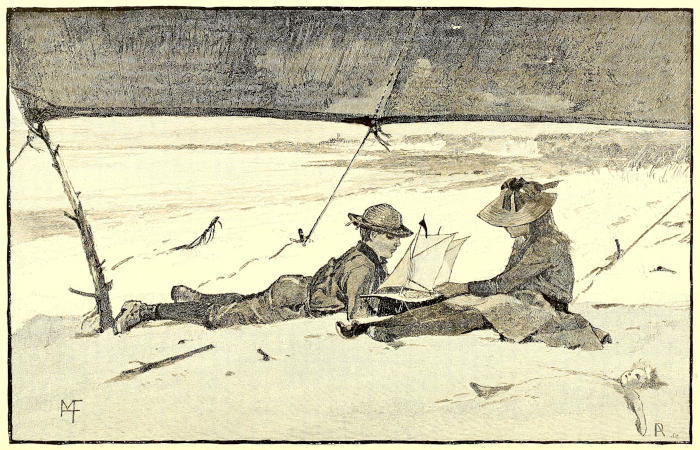
THE CAPTAIN AND THE CAPTAIN’S MATE.
By Alfred Terry Bacon.
A few days ago as I was coming out of the dark mouth of a cañon, glad to be once again in the low afternoon sunshine and the free air, there rang out from the blooming plum-thicket beside me a clear, low whistle, repeated often. It was only a curlew hidden down by the brook, under the sweet-scented canopy of flowers; but the whistle came again so sweetly and boyishly that my thoughts flew far away; the tired horse fell into a walk; the reins dropped from my hand over the high Mexican saddle-horn; the mountains and the flower-covered valley seemed blotted out of sight, and instead there came up a vision of a little brown-eyed boy, who lives two thousand miles away—he seemed to be standing before me and looking up, whistling just as the curlew whistles.
But there was no one near. I was alone among the mountains, twenty miles away from any man, and twice as far from any whistling lad. It was only a little vision that the curlew’s note called up for me, but I was grateful to the hidden bird; for that clear remembrance was like sight, and it was long since I had seen a human face or heard a voice. The curlew calling by the brook never knew that it was doing a kindness for a boy far away on the other side of the continent; but in jogging my memory it reminded me of a letter, lying tucked away, which had cost its writer a great deal of hard work—a letter from the brown-eyed lad who thinks the life of a backwoodsman almost as interesting as the life of Robinson Crusoe and the other wonderful men in the story-books. Perhaps there are some other boys who would like to hear how a man lives all alone in the Rocky Mountains.
Near the central part of the Territory of Wyoming there is a group of mountains which belong to the Rocky Mountain system, though they are far separated from the highest range. All the mountains are higher than any of our Eastern ranges; but standing in the midst of plains that are many thousand feet above the sea, their general height does not seem great. They are very beautiful in their covering of heavy pine forests with countless tall crags and towers and sharp obelisks of natural rock rising from their summits; and in the center of the group there stands one lofty peak rising far above all its fellows. While all the mountains around were gay with spring flowers, its high head was still wrapped in snow; and now as mid-summer approaches, it is still crowned with a white wreath which will only melt away in the late summer, to return in the early autumn.
The Rocky Mountains are unlike the other great ranges of the world, in having broad, smooth, grassy valleys scattered everywhere among them. Some of these valleys are of very great size, even among the highest mountains, and they are so different from other mountain valleys that they have received a different name; they are generally called parks. This lower group of mountains also, like the great main range, has these lovely natural parks of smaller size. The largest and most beautiful of them all, a mile in width and many miles in length, lies along the eastern side of the great[724] peak; and just where the evening shadow of the mountain falls across the park, shutting off an hour or two of late sunshine, there stands a little lonely log cabin, which is my hermitage. There I am spending a month or two, far away from men, like Robinson Crusoe. I have, to be sure, the company of a horse and a dog, but there is no man—not even a Man Friday; and therefore, as it is not possible for me to talk to any one, I must do a little talking with my pen, and tell what a queer sort of a life I lead. For even in this wilderness I have one great comfort which was denied to poor old Robinson—sometimes, by taking long rides, I can get letters; though, as the post-office is fifty miles away, mail days are very scarce. Still, slowly passed along from ranch to ranch, letters come and go; and so, in time, what I write will reach the railroad and then the outer world.
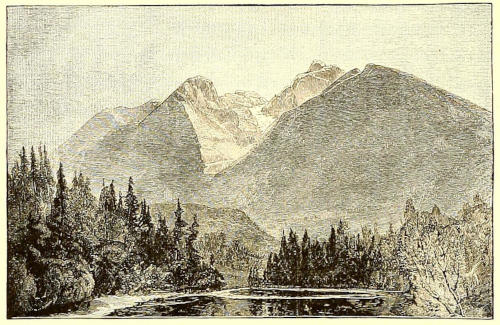
Life in this part of the globe is not always so lonely. On nearly all the rivers and creeks of Wyoming there are ranches scattered at distances of ten or twenty miles apart. On the eastern edge of these mountains, there is a ranch only eight miles away from my hermitage, and there is another in the foot-hills on the western side, not twenty miles away. But now all the ranches are deserted, for the only business in all this region is the raising of cattle, and through the early summer all hands are hard at work on the “round-ups,” which run over the whole breadth of the territory, searching for cattle scattered by the storms of the last winter. Through the cold and the darkness and the deep snows of winter Crusoe-life would, indeed, be rather too hard to bear. Then, there were three of us together in the little cabin, and there were sometimes friendly visits between the men on the distant ranches. But now, alone in the wilderness, twenty miles from any human being, I feel the loneliness less than did we three together in the still, dead winter; for the whole world is alive and beautiful.
No one knows, moreover, how much pleasure there is in the friendship of an affectionate dog and an intelligent horse, until he is shut off from all other company, and is obliged to make them his intimate friends. Gip and Monkey, my dog and my horse, spend so many hours of every day exploring the mountains with me, that we have grown to be very faithful friends.
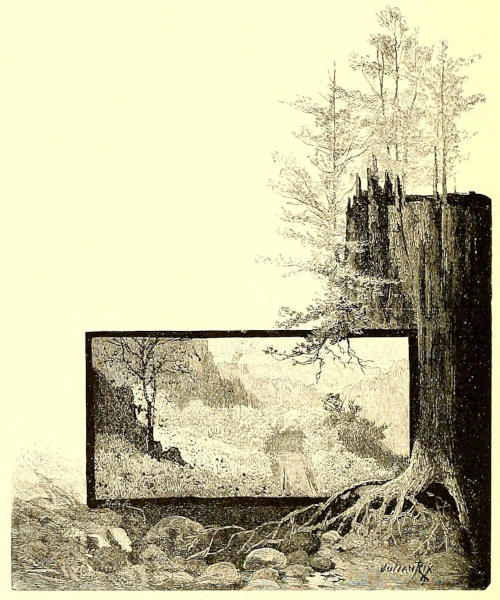
A hermit, you know, usually has not much work to do. Those old fellows who used to hide themselves in caves and deserts, in old times, spent most of their days in solemn meditation; but I am not just that kind of[725] a hermit. To sit still and think all the time would be the hardest work in the world for me. The only necessary work that falls to my lot at present is keeping the camp, preparing food and looking after a small band of horses that are running at large in the park. My first task is to ride a few miles up the park and see that the horses are on their proper range; and after that, all the day is free for reading or writing or hunting or wandering about through the mountains, finding fresh varieties of flowers or exploring unknown cañons or climbing the tall crags to look across the mountains to the vast plains that stretch away as far as the eye can reach, like a blue sea. In these daily rides through the wild mountains there is so much that is new and strange to Eastern eyes, so much that is beautiful and grand, so many kinds of curious wild animals, such quantities of gay flowers never seen in the States, that there is enough pleasure in them to make up for all the loneliness of these few weeks.
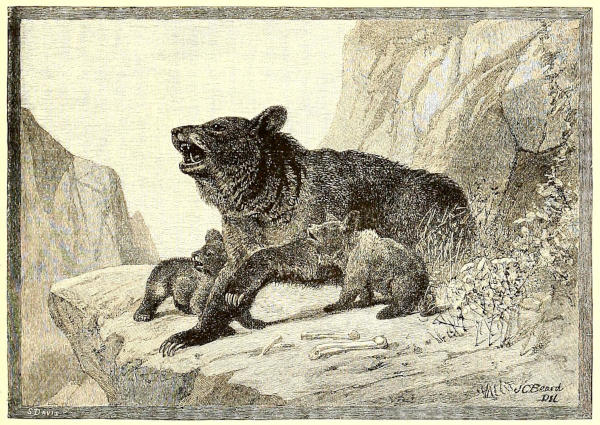
SOME OF THE UNSOCIABLE NEIGHBORS.
We seem to be alone most of the time—Monkey, Gip, and I—and that is why we are such friends; but we are not alone so much as we seem to be. There are plenty of neighbors upon the mountain-sides, and some that wander through the park; but they are so very unsociable that when they see us coming they walk the other way. But then it is true, to be sure, that some of them are not always very kindly treated by us when we meet them, so perhaps we are to blame. There are two families of neighbors, who live in caves on the mountain, for whom I have a great respect. I would not give them offense on any account, for they are very powerful, and usually have things all their own way in the neighborhood. They are the brown bears and the gray bears. Often I see their great fresh foot-prints in the mud along the creeks when I go out in the early morning. The tracks look as if a man with very large, broad feet had been running bare-footed through the mire. I never follow their trail very far to see where they have gone, for I prefer to have a friend or two with me when I go to make the acquaintance of these mighty gentlemen or the members of their families.
At the nearest ranch on the western side of the mountains, there lives a German who was the first pioneer to bring cattle in among these valleys. The encounters that he has had with all the various animals that live in the forest are very interesting. Not long ago, this old fellow built a new cabin for himself at the foot of a mountain. Before his house was finished, he went out one day and killed a fine fat deer. Bringing the carcass home at night, he hung it up against the back of[726] his house, and then hanging a blanket over the doorway which was still without a door, he went to bed. He slept soundly, but there dimly seemed to him to be some disturbance about the house during the night; and when he went out in the morning, every bit of his fine deer was gone, and the bear tracks up and down the mountain-side showed what had become of it. But game was plentiful, and it was not long before his deer was replaced by a big-horned sheep, which is the most tender and juicy meat that ever was eaten. This time he was more careful, and lay awake half the night, fearing that he should lose his stock of fresh meat. When it was very late and he was about to give up watching, he at last heard a sound at the back of the house. Something was at work on his wild mutton. There was a noise of scratching and tearing. It seemed as if several bears were making short work with his meat. He seized his loaded rifle and jumped out of bed with very scanty clothing on. Going to the doorway and drawing aside the blanket, he saw that the night was cloudy and as dark as Egypt. He stopped and thought for a moment that it would be impossible to kill a bear in such darkness, even if he should be able to hit it, for these beasts are so tough that they will carry a dozen bullets about in their bodies without much inconvenience, if they are not wounded in the heart or the brain. So our friend laid down his rifle and took instead a loaded shot-gun. “This is the thing for them,” he said to himself; “it will pepper them all over and scare them so they never will come again.” Then, with gun in hand he silently climbed the projecting logs at the nearest corner of the cabin, and creeping across the roof, peeped over the edge above the place where the sheep was hung. Something appeared to be moving below in the darkness. Taking a random aim, he blazed away. The shot scattered and evidently took effect; for there arose a chorus of growls and howls and yells that would have made the bravest man’s hair stand on end; there was a scampering and shuffling of many feet up and down, and around the cabin; even in the thick darkness he could see many great fat creatures running and sniffing angrily about to find who had attacked them. He saw that he was besieged on his own roof by at least a dozen furious, hungry bears. “They didn’t scare worth a cent,” he said. It was not long before they discovered whence the shot had come, and knowing very well that there is strength in numbers, they determined to have that man for supper, even if they had to put off their supper till breakfast-time. So while some sat down here and there, the others walked about, grunting and growling over their injuries. Bears can climb quite as well as men, and old Frank stood with fear and trembling in the middle of the roof, ready to receive with the butt of his gun the first nose that should rise above the edge. If two had happened to mount the roof on opposite sides, there would have been a small chance of life for the poor man. But the bears thought that solid ground was the safer place for them, so there they staid; and up above sat old Frank shivering, how long he never knew. It seemed centuries. It was a sharp, frosty autumn night, and, as he had on very little clothing, Frank was soon chilled almost to his bones. But the bears’ coats were warm enough. They were more hungry than they were cold, so there they sat and growled and waited for their prey to come down and be eaten. Soon a bitterly cold wind began to blow. Every joint in the poor man’s body stiffened; but it seemed pleasanter to freeze to death than to be eaten up by those ugly beasts, so he bore his discomfort as best he could. The hours of that night seemed to be endless, and the chill grew terrible; but at last a dull gray streak appeared in the East. No man was ever more glad to see the first sign of dawn than was that chilly watcher. Bears are very shy by daylight, and as the twilight little by little grew into broad day, Frank’s visitors trotted away disappointed and sulky up to their dens on the mountain. Their victim, more dead than alive, was able at last to climb down, and kindle a fire to warm himself. He still lives to tell the story in the same log cabin; but it has a good stout door now, and he will never again go bear-hunting with a shot-gun.
So you see it is quite as pleasant not to have the bear families too neighborly. They rarely come out of the woods by daylight, except in late summer and autumn when the plum-thickets are hanging full of fruit; and so, fortunately, we do not often see them.
The most sociable of all our wild neighbors is the prong-horned antelope, of which there are several bands running up and down the park. Every day as I ride out to the horse range I meet some of them; often, in suddenly mounting the crest of a ridge, I surprise a little herd grazing just beyond. Then it is beautiful to watch them as they bound gracefully away down the slope with the speed of a bird, seeming hardly to touch their slender limbs to the ground as they fly along. Gip likes nothing better than to go tearing after them as long as his breath holds out; though that small dog always finds it a hopeless chase, for only greyhounds and the swiftest horses can overtake the antelope when it is strong and fat from feeding freely on the fresh June grass.
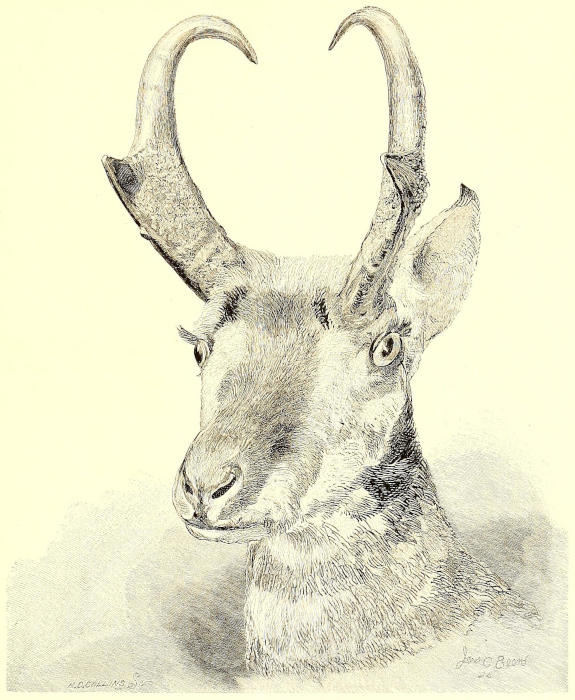
HEAD OF THE PRONG-HORNED ANTELOPE.
Returning a little while ago, after many weeks of civilized life in a Colorado town, I found the[727] old cabin deserted; for those who had been my companions there had gone far out on the plains to look after our wandering cattle. In the late afternoon, when the peak’s shadow fell across the valley, while I was busy making ready the simple supper, Gip stood in the doorway on guard, and I heard him give a long, low growl of suspicion. Looking out, I saw two pretty antelopes standing before the door, not a stone’s throw away, peering about in a timid, curious way to see what change had come over the little house which before had been so quiet. It is not common to see them so very near, and they were so pretty and graceful that I could only stand and admire them for a moment, forgetting my need of fresh meat. Their little hook-shaped horns and dainty hoofs are as black as polished jet; their eyes are very large and soft and dark; their bodies are a bright tawny color, but the throat and breast and limbs are snowy white. There are few animals in the world that[728] are more elegant both in shape and in their movements than the prong-horned antelope. They came tripping down the slope with all the airs and graces of two little dandies; now trotting easily forward; now clearing a fallen tree with a beautiful flying leap; now stopping a moment to gaze and sniff about for possible danger. It was quite flattering to a lonely hermit to receive a visit from neighbors as handsome and stylish as these. But, though a friendly visit would be very pleasant, a full larder would be still pleasanter. Fortunately for my shy visitors, all the arms and ammunition had been stowed away while the house was closed, and could not be procured before the wary creatures had trotted on out of easy rifle range.
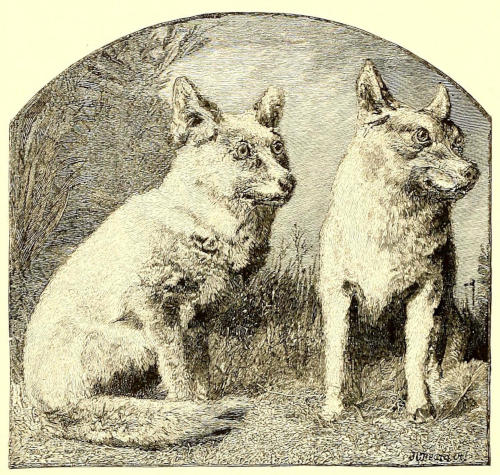
COYOTES, OR PRAIRIE WOLVES.
Once in two weeks comes the principal event of my backwoods life,—a horseback ride of about forty miles to carry letters to the nearest ranch, and to get those that have collected there. After riding a few miles along the valley and through a pass, I come out upon the open rolling country that stretches away for hundreds of miles without any covering of trees or bushes except along the streams; for this western prairie land is so dry that only grass and cactus and low herbs can grow upon it. The rolling land is green, and spangled with flowers through May and June; but after mid-summer it becomes as dry as a desert, and in that way kind Providence changes the standing grass into hay which will feed the thousands of cattle and horses and wild creatures through the winter.
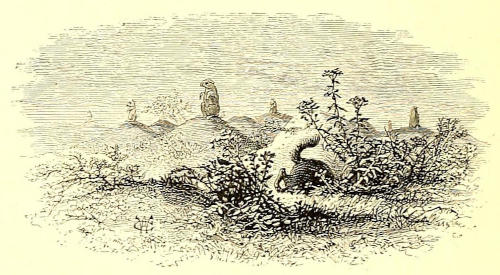
PRAIRIE DOGS.
As I ride out of the pass on these regular journeys for the mail, a coyote, or prairie wolf, that lives close by among the rocks, often comes rushing out with a doleful howl, and acts as if wishing to make acquaintance with Gip. Both the wolf and Gip seem to understand that they are blood relations. They are nearly of equal size, and they run up to each other as if they would like to be friends; but when they are close together, the courage of one or the other always fails. Either Gip turns tail, allowing the wolf to chase him within a dozen steps of the horse’s heels,—or the wolf takes alarm, and Gip runs madly after it until it disappears over a ridge. So the wild dog and the tame one make little progress in their friendship. Yet it is not a very uncommon thing in the Far West even for gentle and intelligent dogs to form a friendship with a pack of wolves, and to go off and live with them, returning now and then to pay short visits to their old masters. But more often if a dog falls in with a pack of wolves, he is quickly torn in pieces by them.
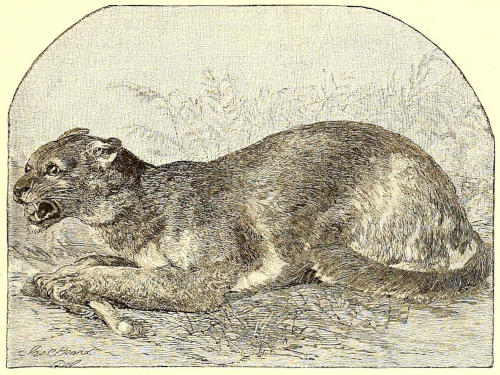
THE MOUNTAIN LION.
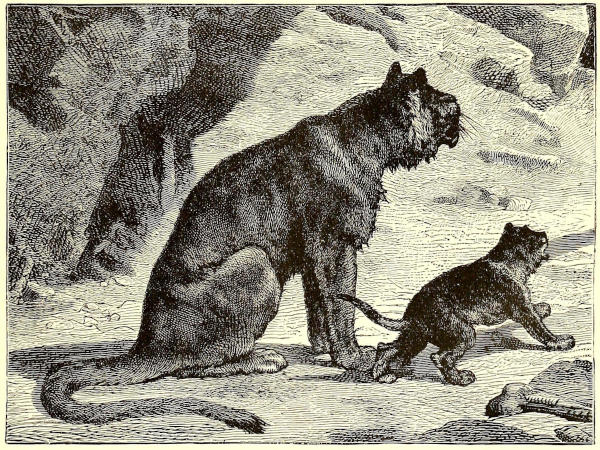
THE HOME OF THE BIG CAT.
Early in the morning, before the peak has begun to gather its cap of thunder clouds which break in showers every afternoon, and while the air through the whole valley is cool and very sweet with the perfume of a million flowers, I start out for my daily ride. First there is a mile over the rich grassland along the creek where the gay flowers grow in far greater variety and beauty than in any Eastern fields; then there is a long stretch of dry, rolling land which is all one great city of prairie-dogs. At the approach of strangers there is great excitement through this town of little yellow pigmies. Those which are looking out from the highest point give a few warning calls. Then there is a tremendous scattering and scampering in all directions of the fat, short-legged[730] little bodies in so hot haste that they look like balls of yellow fur rolling across the gravel. Some have been out feeding, and more have been about gossiping with their neighbors and making morning calls, for they are famous little busybodies: but when they hear the warning, all fly at full speed to their own homes. Then when every one is sitting at the mouth of its hole, they are ready to defy the world. For a man and a horse they care little, but at the sight of a dog, the city is in an uproar; and, feeling perfectly safe by their own homes, they delight to tease him. There is such a Babel of shrill little voices chattering, scolding, squealing, and yelping from hundreds of gravel-heaps, that Gip stands for a minute perplexed, not knowing on which one to spring first; then like a flash he darts away to the nearest hole where a jolly little tormentor is chattering its defiance. The prairie-dog stands still in the doorway of its house, scolding and twitching its tail as its enemy comes charging down, until Gip’s nose seems almost upon it; then as quick as a wink, the little tail flies up and Mr. Prairie-Dog is far away into the earth by the time Gip has fairly reached the door of his house. Then every dog in the town redoubles its chattering, and it seems as if a ripple of low laughter ran through the company at the disappointment of their enemy. But Gip, after ramming his head as far as it can be forced into the burrow, draws it out with a sniff of regret and then is off again, full tilt, after the next little saucy rascal that sits on a neighboring sandheap, making merry over his perplexity. Again he almost has one; the prairie-dog sits unmoved until Gip comes within a yard of the hole, and then it vanishes. It seems a very narrow escape for it; but it is always just so narrow, and yet they always escape. As long as man and dog are in sight they keep up their shrill din, like the chattering of a thousand monkeys; and as long as we are in their village, Gip flies madly from hole to hole, always just so eager and hopeful, though he has been chasing them all his life and has never yet caught one.
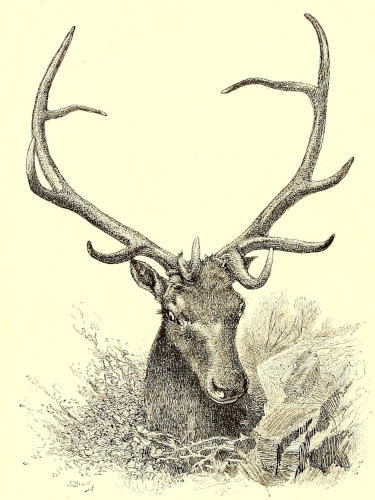
HEAD OF THE WAPITI.
The town of the prairie-dogs is in a beautiful situation. It lies in the broadest part of the park, surrounded by the highest and grandest of the mountains. A few days ago, as I was riding through it in the early morning, I saw an animal some distance ahead running hard toward the woods. Thinking it was a wolf or coyote, I paid little attention at first, but looking closer, I saw plainly that I was mistaken, for its legs were short, and its body long and heavy. It went springing over the grass with long bounds, and its coat of fur was grayish, shading to yellow brown; and I knew it must be one of the great panthers which are generally called mountain lions. I had never before met one, though their great, round footprints, as large as tea-plates, had often been seen in the soft snow the last winter. Like other cats, they like to sleep in the day and to prowl at night. Gip took a long, wistful look at the lion; but he is a small dog, and a very wise one, and he knew his life would be short if he should approach very near to that great creature, so he went back to his hard work with the prairie-dogs, and left me to go galloping off alone for a nearer view of the[731] lion. But Monkey dislikes wild beasts quite as much as Gip, and would never willingly have carried me very near to a beast of prey, even if the lion had not run up into the rocks on the mountain-side before I had seen it very clearly.
Beside the rough confusion of rocks into which the panther ran, there was a gentle grassy slope which seemed to extend to the top of the mountain.
I wanted to have one more look at the big cat, so Monkey had to climb the long ascent, much against his will, keeping as near to the rocks as possible; and very soon Gip plucked up courage to follow; but that was the last we ever saw of the mountain lion. However, in wandering up near the top of the mountain, I came on tracks that were quite as interesting to me as was the lion. They were the marks of a cloven hoof, nearly as large as the tracks of an ox, but longer and more pointed. As there were no cattle so high on the mountain, it was plain, at a glance, that they were footprints of the great wapiti, which, in the West, is always called an elk. Hurrying on in hope of catching sight of this great king of the forest, the footprints grew fresher, and soon I came to a glade where the grass, crushed down in spots, showed that a startled band of elk had just risen from their rest, and run away; and so, like a will-o’-the-wisp, they led me on through the forest, always letting me know that they were near, by their fresh tracks, but never quite near enough to be seen. The elk and the big-horned sheep are the shyest of all these wild animals; and the elk have the senses of sight and smell and hearing so very keen, that they will see a hunter, and will run from him, a dozen times for every time that he gets a first sight of them. Their great branching antlers, so large and heavy that a small boy could hardly lift them from the ground, lie scattered everywhere through the grass in the park, for they shed them every spring; and everywhere on the mountain-sides we find their footprints; and yet it is quite a rare event to meet them, and still more uncommon to kill them.
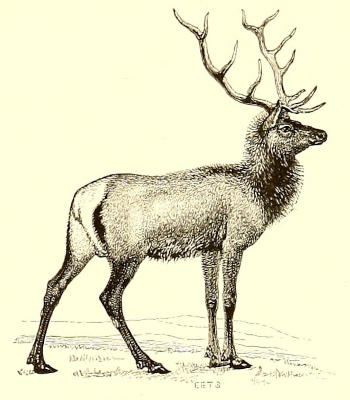
THE AMERICAN ELK.
So all day long, with my pony and my dog, I wandered contentedly along the mountain-side, resting often under cool over-arching rocks or beside the snow-fed brooks, the banks of which are streaked with the crimson of the wild cyclamen; and all day long we tried to pay visits to our shy neighbors; but wherever we called, they were not at home. And, when the late afternoon began to drop blue, gauzy veils of shadows over the east-ward slope of the opposite mountain, we turned back toward the lonely, silent home, which now never hears the sweet sound of human speech.
I can not now tell you of all the queer inhabitants of these mountains; but next time I shall have something to say to you about the beaver, the wild sheep, the buffalo, and some other interesting neighbors of mine.
By William H. Hayne.
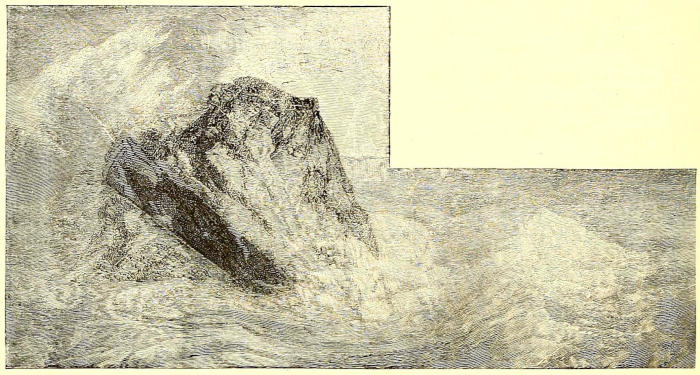
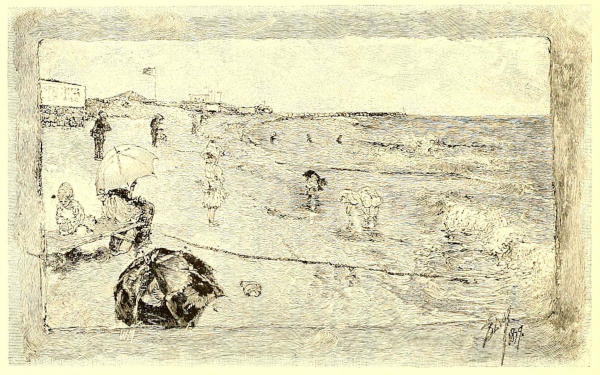
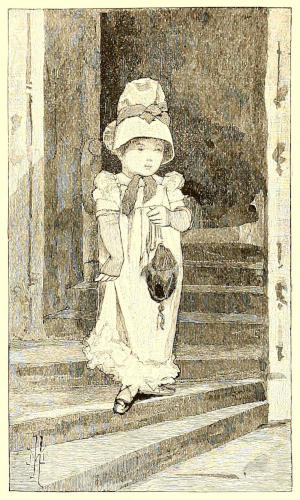
[1] “Hussif” (a contracted form of the word “house-wife”)was formerly used as a name for a little bag or case for holding sewing materials.
By Mary E. Wilkins.
When Mr. Hobbs’s young friend left him to go to Dorincourt Castle and become Lord Fauntleroy, and the grocery-man had time to realize that the Atlantic Ocean lay between himself and the small companion who had spent so many agreeable hours in his society, he really began to feel very lonely indeed. The fact was, Mr. Hobbs was not a clever man nor even a bright one; he was, indeed, rather a slow and heavy person, and he had never made many acquaintances. He was not mentally energetic enough to know how to amuse himself, and in truth he never did anything of an entertaining nature but read the newspapers and add up his accounts. It was not very easy for him to add up his accounts, and sometimes it took him a long time to bring them out right; and in the old days, little Lord Fauntleroy, who had learned how to add up quite nicely with his fingers and a slate and pencil, had sometimes even gone to the length of trying to help him; and, then too, he had been so good a listener and had taken such an interest in what the newspaper said, and he and Mr. Hobbs had held such long conversations about the Revolution and the British and the elections and the Republican party, that it was no wonder his going left a blank in the grocery store. At first it seemed to Mr. Hobbs that Cedric was not really far away, and would come back again; that some day he would look up from his paper and see the lad standing in the doorway, in his white suit and red stockings, and with his straw hat on the back of his head, and would hear him say in his cheerful little voice: “Hello, Mr. Hobbs! This is a hot day—isn’t it?” But as the days passed on and this did not happen, Mr. Hobbs felt very dull and uneasy. He did not even enjoy his newspaper as much as he used to. He would put the paper down on his knee after reading it, and sit and stare at the high stool for a long time. There were some marks on the long legs which made him feel quite dejected and melancholy. They were marks made by the heels of the next Earl of Dorincourt, when he kicked and talked at the same time. It seems that even youthful earls kick the legs of things they sit on;—noble blood and lofty lineage do not prevent it. After looking at those marks, Mr. Hobbs would take out his gold watch and open it and stare at the inscription: “From his oldest friend, Lord Fauntleroy, to Mr. Hobbs. When this you see, remember me.” And after staring at it awhile, he would shut it up with a loud snap, and sigh and get up and go and stand in the doorway—between the box of potatoes and the barrel of apples—and look up the street. At night, when the store was closed, he would light his pipe and walk slowly along the pavement until he reached the house where Cedric had lived, on which there was a sign that read, “This House to Let”; and he would stop near it and look up and shake his head, and puff at his pipe very hard, and after a while walk mournfully back again.
This went on for two or three weeks before any new idea came to him. Being slow and ponderous, it always took him a long time to reach a new idea. As a rule he did not like new ideas, but preferred old ones. After two or three weeks, however, during which, instead of getting better, matters really grew worse, a novel plan slowly and deliberately dawned upon him. He would go to see Dick. He smoked a great many pipes before he arrived at the conclusion, but finally he did arrive at it. He would go to see Dick. He knew all about Dick. Cedric had told him, and his idea was that perhaps Dick might be some comfort to him in the way of talking things over.
So one day when Dick was very hard at work blacking a customer’s boots, a short, stout man with a heavy face and a bald head, stopped on the pavement and stared for two or three minutes at the bootblack’s sign, which read:
“Professor Dick Tipton
Can’t be beat.”
He stared at it so long that Dick began to take a lively interest in him, and when he had put the finishing touch to his customer’s boots, he said:
“Want a shine, sir?”
The stout man came forward deliberately and put his foot on the rest.
“Yes,” he said.
Then when Dick fell to work, the stout man looked from Dick to the sign and from the sign to Dick.
“Where did you get that?” he asked.
“From a friend o’ mine,” said Dick,—“a little feller. He guv’ me the whole outfit. He was the best little feller ye ever saw. He’s in England now. Gone to be one o’ those lords.”
“Lord—Lord—”asked Mr. Hobbs, with ponderous slowness, “Lord Fauntleroy—Goin’ to be Earl of Dorincourt?”
Dick almost dropped his brush.
“Why, boss!”he exclaimed, “d’ye know him yerself?”
“I’ve known him.” answered Mr. Hobbs, wiping his warm forehead, “ever since he was born. We were lifetime acquaintances—that’s what we were.”
It really made him feel quite agitated to speak of it. He pulled the splendid gold watch out of his pocket and opened it, and showed the inside of the case to Dick.
“‘When this you see, remember me,’” he read.
“That was his parting keepsake to me. ‘I don’t want you to forget me’—those were his words—I’d ha’ remembered him,” he went on, shaking his head, “if he hadn’t given me a thing, an’ I hadn’t seen hide nor hair on him again. He was a companion as any man would remember.”
“He was the nicest little feller I ever see,” said Dick. “An’ as to sand—I never ha’ seen so much sand to a little feller. I thought a heap o’ him, I did,—an’ we was friends, too—we was sort o’ chums from the fust, that little young un an’ me. I grabbed his ball from under a stage fur him, an’ he never forgot it; an’ he’d come down here, he would, with his mother or his nuss an’ he’d holler: ‘Hello, Dick!’ at me, as friendly as if he was six feet high, when he warn’t knee high to a grasshopper, and was dressed in gal’s clo’es. He was a gay little chap, and when you was down on your luck, it did you good to talk to him.”
“That’s so,” said Mr. Hobbs. “It was a pity to make an earl out of him. He would have shone in the grocery business—or dry goods either; he would have shone!” And he shook his head with deeper regret than ever.
It proved that they had so much to say to each other that it was not possible to say it all at one time, and so it was agreed that the next night Dick should make a visit to the store and keep Mr. Hobbs company. The plan pleased Dick well enough. He had been a street waif nearly all his life, but he had never been a bad boy, and he had always had a private yearning for a more respectable kind of existence. Since he had been in business for himself, he had made enough money to enable him to sleep under a roof instead of out in the streets, and he had begun to hope he might reach even a higher plane, in time. So, to be invited to call on a stout, respectable man who owned a corner store, and even had a horse and wagon, seemed to him quite an event.
“Do you know anything about earls and castles?” Mr. Hobbs inquired. “I’d like to know more of the particklars.”
“There’s a story about some on ’em in the Penny Story Gazette,” said Dick. “It’s called the ‘Crime of a Coronet; or, the Revenge of the Countess May.’ It’s a boss thing, too. Some of us boys’re takin’ it to read.”
“Bring it up when you come,” said Mr. Hobbs, “an’ I’ll pay for it. Bring all you can find that have any earls in ’em. If there aren’t earls, markises ’ll do, or dooks—though he never made mention of any dooks or markises. We did go over coronets a little, but I never happened to see any. I guess they don’t keep ’em ’round here.”
“Tiffany’d have ’em if anybody did,” said Dick, “but I don’t know as I’d know one if I saw it.”
Mr. Hobbs did not explain that he would not have known one if he saw it. He merely shook his head ponderously.
“I s’pose there is very little call for ’em,” he said, and that ended the matter.
This was the beginning of quite a substantial friendship. When Dick went up to the store, Mr. Hobbs received him with great hospitality. He gave him a chair tilted against the door, near a barrel of apples, and after his young visitor was seated, he made a jerk at them with the hand in which he held his pipe, saying:
“Help yerself.”
Then he looked at the story papers, and after that they read, and discussed the British aristocracy; and Mr. Hobbs smoked his pipe very hard and shook his head a great deal. He shook it most when he pointed out the high stool with the marks on its legs.
“There’s his very kicks,” he said impressively; “his very kicks. I sit and look at ’em by the hour. This is a world of ups an’ it’s a world of downs. Why, he’d set there, an’ eat crackers out of a box, an’ apples out of a barrel, an’ pitch his cores into the street; an’ now he’s a lord a-livin’ in a castle. Those are a lord’s kicks; they’ll be an earl’s kicks some day. Sometimes I says to myself, says I, ‘Well, I’ll be jiggered!’”
He seemed to derive a great deal of comfort from his reflections and Dick’s visit. Before Dick went home, they had a supper in the small backroom; they had crackers and cheese and sardines, and other canned things out of the store, and Mr. Hobbs solemnly opened two bottles of ginger ale, and pouring out two glasses, proposed a toast.
“Here’s to him!” he said, lifting his glass, “an’ may he teach ’em a lesson—earls an’ markises an’ dooks an’ all!”
After that night, the two saw each other often, and Mr. Hobbs was much more comfortable and less desolate. They read the Penny Story Gazette, and many other interesting things, and gained a knowledge of the habits of the nobility and gentry[736] which would have surprised those despised classes if they had realized it. One day Mr. Hobbs made a pilgrimage to a book store down town, for the express purpose of adding to their library. He went to a clerk and leaned over the counter to speak to him.
“I want,” he said, “a book about earls.”
“What!” exclaimed the clerk.
“A book,” repeated the grocery-man, “about earls.”
“I’m afraid,” said the clerk, looking rather queer, “that we haven’t what you want.”
“Haven’t?” said Mr. Hobbs, anxiously. “Well, say markises then—or dooks.”
“I know of no such book,” answered the clerk.
Mr. Hobbs was much disturbed. He looked down on the floor,—then he looked up.
“None about female earls?” he inquired.
“I’m afraid not,” said the clerk, with a smile.
“Well,” exclaimed Mr. Hobbs, “I’ll be jiggered!”
He was just going out of the store, when the clerk called him back and asked him if a story in which the nobility were chief characters would do. Mr. Hobbs said it would—if he could not get an entire volume devoted to earls. So the clerk sold him a book called “The Tower of London,” written by Mr. Harrison Ainsworth, and he carried it home.
When Dick came they began to read it. It was a very wonderful and exciting book, and the scene was laid in the reign of the famous English queen who is called by some people Bloody Mary. And as Mr. Hobbs heard of Queen Mary’s deeds and the habit she had of chopping people’s heads off, putting them to the torture, and burning them alive, he became very much excited. He took his pipe out of his mouth and stared at Dick, and at last he was obliged to mop the perspiration from his brow with his red pocket handkerchief.
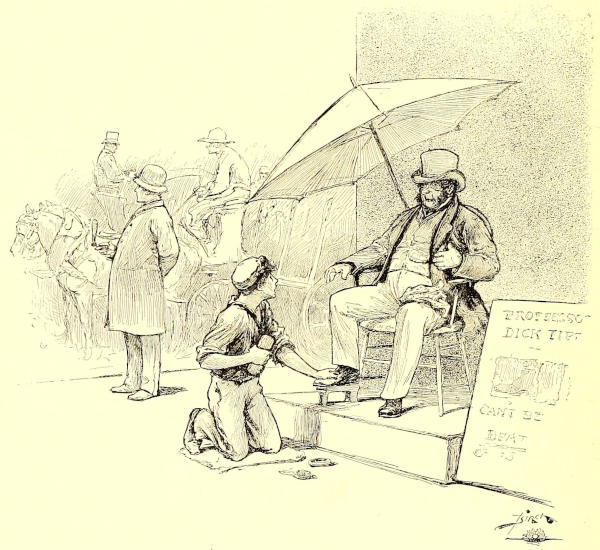
“WHY, BOSS!” EXCLAIMED DICK, “DO YOU KNOW HIM YOURSELF?”
“Why, he aint safe!” he said. “He aint safe! If the women folks can sit up on their thrones an’ give the word for things like that to be done, who’s to know what’s happening to him this very minute? He’s no more safe than nothing? Just let a woman like that get mad, an’ no one’s safe!”
“Well,” said Dick, though he looked rather anxious himself; “ye see this ’ere un isn’t the one that’s bossin’ things now. I know her name’s[737] Victohry, an’ this un here in the book,—her name’s Mary.”
“So it is,” said Mr. Hobbs, still mopping his forehead; “so it is. An’ the newspapers are not sayin’ anything about any racks, thumbscrews, or stake-burnin’s,—but still it doesn’t seem as if ’twas safe for him over there with those queer folks. Why, they tell me they don’t keep the Fourth o’ July!”
He was privately uneasy for several days; and it was not until he received Fauntleroy’s letter and had read it several times, both to himself and to Dick, and had also read the letter Dick got about the same time, that he became composed again.
But they both found great pleasure in their letters. They read and re-read them, and talked them over and enjoyed every word of them. And they spent days over the answers they sent, and read them over almost as often as the letters they had received.
It was rather a labor for Dick to write his. All his knowledge of reading and writing he had gained during a few months when he had lived with his elder brother, and had gone to a night-school; but, being a sharp boy, he had made the most of that brief education, and had spelled out things in newspapers since then, and practiced writing with bits of chalk on pavements or walls or fences. He told Mr. Hobbs all about his life and about his elder brother, who had been rather good to him after their mother died, when Dick was quite a little fellow. Their father had died some time before. The brother’s name was Ben, and he had taken care of Dick as well as he could, until the boy was old enough to sell newspapers and run errands. They had lived together, and as he grew older Ben had managed to get along until he had quite a decent place in a store.
“And then,” exclaimed Dick with disgust, “blest if he didn’t go an’ marry a gal! Just went and got spoony, an’ hadn’t any more sense left! Married her, an’ set up housekeepin’ in two back rooms. An’ a hefty un she was,—a regular tiger-cat. She’d tear things to pieces when she got mad,—and she was mad all the time. Had a baby just like her,—yell day ’n’ night! An’ if I didn’t have to ’tend it! an’ when it screamed, she’d fire things at me. She fired a plate at me one day, an’ hit the baby—cut its chin. Doctor said he’d carry the mark till he died. A nice mother she was! Crackey! but didn’t we have a time—Ben ’n’ mehself ’n’ the young un. She was mad at Ben because he didn’t make money faster; ’n’ at last he went out West with a man to set up a cattle ranch. An’ he hadn’t been gone a week ’fore, one night, I got home from sellin’ my papers, ’n’ the rooms wus locked up ’n’ empty, ’n’ the woman o’ the house, she told me Minna’d gone—shown a clean pair o’ heels. Some un else said she’d gone across the water to be nuss to a lady as had a little baby, too. Never heard a word of her since—nuther has Ben. If I’d ha’ bin him, I wouldn’t ha’ fretted a bit—’n’ I guess he didn’t. But he thought a heap o’ her at the start. Tell you, he was spoons on her. She was a daisy-lookin’ gal, too, when she was dressed up, ’n’ not mad. She’d big black eyes ’n’ black hair down to her knees; she’d make it into a rope as big as your arm, and twist it ’round ’n’ ’round her head; ’n’ I tell you her eyes’d snap! Folks used to say she was part Itali-un—said her mother or father’d come from there, ’n’ it made her queer. I tell ye, she was one of ’em—she was!”
He often told Mr. Hobbs stories of her and of his brother Ben, who, since his going out West, had written once or twice to Dick. Ben’s luck had not been good, and he had wandered from place to place; but at last he had settled on a ranch in California, where he was at work at the time when Dick became acquainted with Mr. Hobbs.
“That gal,” said Dick one day, “she took all the grit out o’ him. I couldn’t help feelin’ sorry for him sometimes.”
They were sitting in the store door-way together, and Mr. Hobbs was filling his pipe.
“He oughtn’t to ’ve married,” he said solemnly, as he rose to get a match. “Women—I never could see any use in ’em, myself.”
As he took the match from its box, he stopped and looked down on the counter.
“Why!” he said, “if here isn’t a letter! I didn’t see it before. The postman must have laid it down when I wasn’t noticin’, or the newspaper slipped over it.”
He picked it up and looked at it carefully.
“It’s from him!” he exclaimed. “That’s the very one it’s from!”
He forgot his pipe altogether. He went back to his chair quite excited and took his pocket-knife and opened the envelope.
“I wonder what news there is this time,” he said.
And then he unfolded the letter and read as follows:
“Dorincourt Castle
“My dear Mr Hobbs
“i write this in a great hury becaus i have something curous to tell you i know you will be very mutch suprised my dear frend when i tel you. It is all a mistake and i am not a lord and i shall not have to be an earl there is a lady whitch was marid to my uncle bevis who is dead and she has a little boy and he is lord fauntleroy becaus that is the way it is in England the earls eldest sons little boy is the earl if every body else is dead i mean if his farther and grandfarther are dead my grandfarther is not dead but my uncle bevis is and so his boy is lord Fauntleroy and I am not becaus my papa was the[738] youngest son and my name is Cedric Errol like it was when I was in New York and all the things will belong to the other boy i thought at first i should have to give him my pony and cart but my grandfarther says i need not my grandfarther is very sorry and i think he does not like the lady but preaps he thinks dearest and i are sorry becaus i shall not be an earl i would like to be an earl now better than i thout i would at first becaus this is a beautifle castle and i like every body so and when you are rich you can do so many things i am not rich now becaus when your papa is only the youngest son he is not very rich i am going to learn to work so that I can take care of dearest i have been asking Wilkins about grooming horses preaps i might be a groom or a coachman, the lady brought her little boy to the castle and my grandfarther and Mr. Havisham talked to her i think she was angry she talked loud and my grandfarther was angry too i never saw him angry before i wish it did not make them all mad i thort i would tell you and Dick right away becaus you would be intrusted so no more at present with love from
“your old frend
“Cedric Errol (Not lord Fauntleroy).”
Mr. Hobbs fell back in his chair, the letter dropped on his knee, his penknife slipped to the floor, and so did the envelope.
“Well!” he ejaculated, “I am jiggered!”
He was so dumbfounded that he actually changed his exclamation. It had always been his habit to say, “I will be jiggered,” but this time he said, “I am jiggered.” Perhaps he really was jiggered. There is no knowing.
“Well,” said Dick, “the whole thing’s bust up, hasn’t it?”
“Bust!” said Mr. Hobbs. “It’s my opinion it’s all a put-up job o’ the British ’ristycrats to rob him of his rights because he’s an American. They’ve had a spite agin us ever since the Revolution, an’ they’re takin’ it out on him. I told you he wasn’t safe, an’ see what’s happened! Like as not, the whole gover’ment’s got together to rob him of his lawful ownin’s.”
He was very much agitated. He had not approved of the change in his young friend’s circumstances at first, but lately he had become more reconciled to it, and after the receipt of Cedric’s letter he had perhaps even felt some secret pride in his young friend’s magnificence. He might not have a good opinion of earls, but he knew that even in America money was considered rather an agreeable thing, and if all the wealth and grandeur were to go with the title, it must be rather hard to lose it.
“They’re trying to rob him!” he said, “that’s what they’re doing, and folks that have money ought to look after him.”
And he kept Dick with him until quite a late hour to talk it over, and when that young man left, he went with him to the corner of the street; and on his way back he stopped opposite the empty house for some time, staring at the “To Let,” and smoking his pipe, in much disturbance of mind.
(To be continued.)
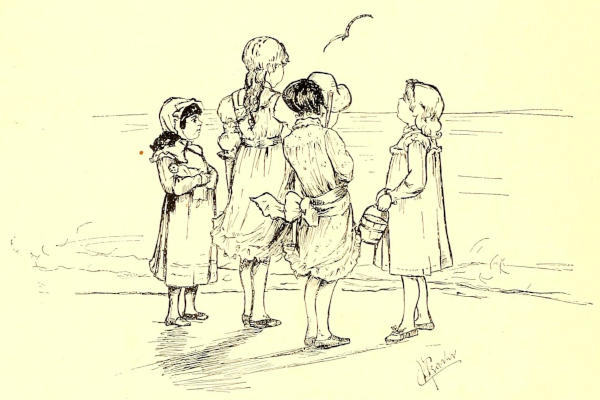
WAITING FOR A COLD WAVE.
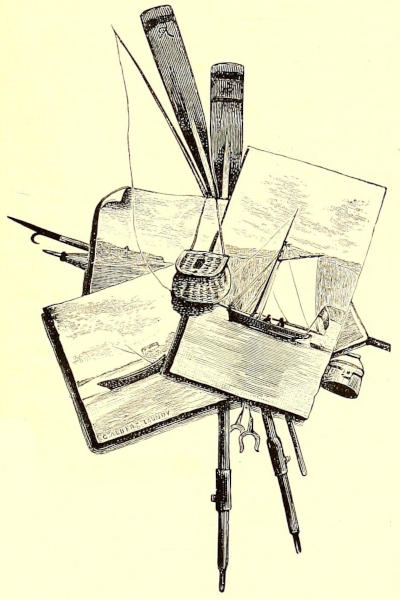
When the Hudson River was first seen by St. Nicholas, or rather by his image, which was the figure-head of the Dutch ship Goode Vrouw, there were more salmon in the water than there were wild grapes about the Indian wigwams which stood where New York City stands to-day. That was a few years after the rediscovery of the river by Henry Hudson in 1609.[2] But, in course of time, the salmon went the way of the Indians. The last native Hudson River salmon was caught in a net in New York bay about 1844; but, more recently, attempts have been made artificially to stock that river and others with this fish, and within two years a few have been caught, the only salmon taken from the Hudson in forty years.[3] When St. Nicholas made his first visit to our shores, there were salmon in every river along the Atlantic coast, north of the Delaware. But, as fishermen became numerous, as dams were built across the rivers, and as the water was made impure by town and city drainage, the salmon were driven northward, just as the Indians were driven westward. The salmon were forced to leave the Connecticut—another river into which there has been hope of introducing them again; they left the Merrimac when it was given over to manufactories; and now few salmon are to be found south of the rivers of eastern Maine. Beyond, they visit the rivers of the British Provinces, Labrador, the Hudson Bay country, and even Greenland,—for one variety of salmon is a fearless Arctic explorer, and penetrates the Arctic Circle. The salmon is as much at home in Iceland and Norway as in England, Scotland, and Ireland. On the north-western American coast, from northern California, Oregon, and Washington, to Alaska and beyond, there have always been vast numbers of this wonderful fish.
I say wonderful, because the salmon is the king of all game fishes, and because he goes under so many names, and has habits so curious that he has puzzled naturalists for hundreds of years. And his pink flesh is so prized that the salmon fisheries on this continent alone yield millions of dollars every year.

The gamy qualities of the salmon, which cause the fly-fisherman to rate him above all other fishes, are his enduring strength and his great activity. The salmon and the blue-fish are the strongest game fishes known, and the former reaches a far larger size than the latter. According to one writer, “the salmon and the sword-fish are the fastest swimmers of all the forked-tail fishes.” Only a fast running-horse could outstrip a salmon; for it is estimated that the salmon swims a mile in less than two minutes. But the horse would be left behind in a long race, for the fish can cover thirty miles in an hour. When leisurely ascending rivers, with frequent rests in[740] attractive pools, the salmon averages from fifteen to twenty-five miles a day. In leaping, the salmon can easily beat the horse, for salmon have leaped up waterfalls twelve feet high. It was formerly supposed that the salmon, when about to jump, bent himself double, and took his tail in his mouth, so that he was like an elastic bow drawn tight. Then it was thought that he suddenly let go, his tail striking the water with great force, and away he went through the air. But now we know that the salmon prepares for a leap just as a boy does, with a short, sharp run. If the water at the foot of the dam or fall is not deep enough to allow this preparatory run, the salmon can not jump. If there is water enough, he starts from the bottom, his powerful tail working as rapidly as the propeller-screw of a steamship. Aided by the pectoral fins, the upward movement grows quicker and quicker, until with a last muscular effort the salmon shoots from the water, his tail still vibrating for an instant, then becoming motionless, as the fish curves through the air and comes down above the obstacle. If a dam be built so high as to be impassable, the salmon will leave the river altogether, for instinct always leads them to the head-waters, where they lay their eggs. So fish-ladders and fish-ways of various kinds have been invented to help salmon and other fishes to surmount natural or artificial barriers. Fish-ladders have been constructed by the aid of which salmon ascend falls over thirty feet high. As soon as salmon enter rivers on their way from the sea they begin to jump, like a crowd of boys just let out of school. Standing on the shore of a salmon river in June or July, you will every now and then see the fish leap four or five feet out of water, glistening like polished silver, then curving over and falling with a heavy splash. Or sometimes their back fins will roll lazily out of the water, and you will be reminded of a school of porpoises. But there is nothing lazy about the salmon when once he is hooked. If there is a twenty-five pound salmon at the end of your line, jumping nearly as high as your head in his struggles to rid himself of the hook, you will be sure to think of nothing except that fish.
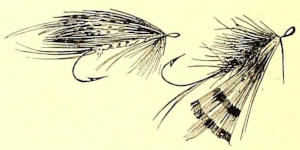
SALMON FLIES.
But before the salmon reaches a weight of twenty-five pounds, he appears in so many and so different forms that very wise men have been unable to recognize him. When the salmon is just hatched, he is known as fry, or fingerling. Then he becomes a parr, or samlet, also called pink, or brandling, on some foreign rivers. The parr changes to a smolt, the smolt to a grilse, and the grilse finally develops into the salmon. The latter, when running fresh from the sea, are called white salmon, and when they are descending rivers after spawning, they are termed kelts, or black salmon. Other names given to salmon after spawning-time are kippers and baggits, or shedders. So the salmon, like the royal fish that he is, has as many names as a prince of one of the royal families of Europe. The alevin, or baby salmon, is hatched in from thirty to one hundred days after the eggs are laid in furrows in gravelly beds which are scooped out by the parent fish, near the head-waters of cold, clear rivers. Presently the alevin grows into the fry, or pink, which is an absurd little fish about an inch long, goggle-eyed, and with dark bars on its sides. When some three months old, the fry makes a change like that of a chrysalis into a butterfly. It becomes a shapely little fish with a forked tail, and brilliant carmine spots shine out on its sides. Its back is of a dark slaty color, and the bars are less strongly marked as the parr grows older. The greediest of trout is not more hungry and active. I have often seen a dozen tiny parr jump from the water at my flies. Once, when coming down the Restigouche in a canoe, with our rods laid aside, and the flies dangling just over the water, two parr leaped together and hooked themselves, although they were hardly four inches long. These pretty little fishes, which[741] one might readily mistake for trout, were once supposed to belong to a species entirely distinct from the salmon. Naturalists were also puzzled by finding that some parr remain for nearly three years in fresh water. So they concluded that these latter parr never went to sea at all, and considered them a species by themselves, which they called Salmo samulus. But nature was finally seen to be wiser than the naturalists. Nature has decreed that only half the parr hatched in a given winter shall go down to the sea at one time, and in this way protects the race from the chance of wholesale destruction. So we are now told that some of the parr develop more rapidly than others, and migrate to the sea in their second spring, while others remain in the river a year longer, and some for still another year.

A FISH-LADDER AROUND A DAM.
When the time for this migration approaches, the parr, which has been steadily growing plumper, undergoes another curious change. The carmine spots fade out, and the soft skin becomes covered with silvery scales which obscure the dark bars on the sides, although the scales can easily be rubbed away. At this period the young salmon is called a smolt, and the smolt was also a riddle to wise men, for a long time. It was thought that smolts which went down to the sea weighing three or four ounces, returned to the rivers in three months weighing six or eight pounds. Of course, such a gain as this was a very wonderful, indeed an unequaled performance, like the “swellin’ wisibly” of the Fat Boy in the “Pickwick Papers.” It is now believed, however, that the smolt requires a year or fifteen months at sea for this great gain in weight. Then he returns to his native river, no longer an insignificant smolt, but a vigorous, beautiful grilse. The grilse is more slender than the salmon, the tail more forked, the scales more easily removed, and the top of the head and of the fins is not quite so black. But the grilse’s sheeny, satiny sides are even more brilliant than the salmon’s, and it is more playful and active, although its strength is less enduring. After the grilse has frolicked its way to the head of the river and spawned, it returns to the sea. When it visits the river again, the next year, it has become a full-grown salmon. These are the successive stages of the salmon’s life.
But, even in the last and most familiar stage, the salmon’s habits are not fully understood. It is known that both young and old salmon, after descending a river, remain for a time in the brackish water at the river’s mouth, where they get rid of fresh-water parasites which have become attached to their sides, and where their scales are hardened by a diet of small fish; but where in the sea salmon go, no one knows. After leaving the coast, they disappear. They have been found in very deep water hundreds of miles from any salmon river; but their marine feeding-grounds are still undiscovered. In the spring they suddenly re-appear at the mouths of rivers, where they linger to free themselves from marine parasites. While in salt water, they will never jump at a fly; but as soon as they enter the fresh water of the Canadian rivers, in June, the waiting Indians and fishermen see them rising freely out of the water. Yet much of this leaping is plainly only for sport, and many people claim that salmon actually eat nothing at all during the time that they are going[742] up rivers. These rivers offer a succession of pools and rapids. In almost every pool, during the day-time in summer, there are salmon resting from the labor of stemming the current. It is said that at night they are often to be found on the bars in the shallow rapids above the pools. If the water is low they ascend very slowly, but any rise in the river stimulates them into a rapid movement upward. When they descend rivers, they fall back much of the way tail foremost, although the distance may be over a hundred miles. Even a salmon can be drowned in swiftly running water. Often they make short runs down river, but they quickly wheel about and usually lie with their heads to the current. When they are descending, they are thin and ravenous; but they rapidly gain in plumpness after reaching the sea. In weight the salmon of the Canadian rivers average between twenty and twenty-five pounds. I suppose a season’s catch would hardly average more than twenty pounds, for it would include many grilse of from eight to ten pounds weight, and salmon weighing only five or six pounds more. A thirty-pound salmon is very large, and a forty-pound fish will be talked of throughout the season, although it is said that salmon weighing fifty pounds have been caught in the Restigouche,—one, indeed, was said to weigh fifty-four pounds. The Princess Louise, the daughter of the Queen of England and the wife of the Marquis of Lorne, the former Governor-general of Canada, caught a forty-pound salmon in the Causapscal river, in the province of Quebec, a few years ago. Last summer I employed one of the two canoe-men who were with the Princess at the time, and he had a great deal to say about her skill in handling that salmon. I don’t think he cared much about other members of the royal family, but “The Princess, sir, she was a good un with the rod.” Salmon weighing sixty pounds are taken now and then in Scotch rivers, and a few rivers in England still[743] yield large fish. Sir John Hawkins speaks of a salmon caught in an English river in April, 1789, which was four feet long, three feet around the body, and weighed seventy pounds. There is a story told of a Highlander who hooked a salmon in the River Awe, and played the fish for hours, until night came on without his being able to tire it out. Then, as the fish was sulking quietly at the bottom, he lay down, took the line in his teeth, that any motion might waken him, and went to sleep. The Highlander slept and the salmon sulked until three o’clock in the morning, when some friends of the former came to look for him. With their help he managed to land the fish about daybreak, and it weighed seventy-three pounds. That was certainly a giant, but a salmon weighing eighty-three pounds is reported once to have been sent to the London market. It would be a serious matter for any of St. Nicholas’s readers to make fast to a salmon as large as that. But it will not happen on this side of the ocean.
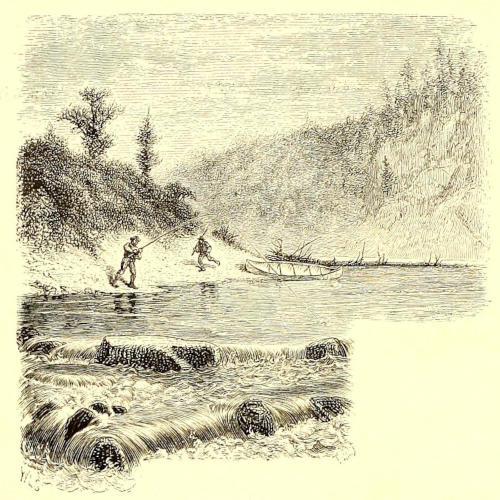
A SALMON POOL.
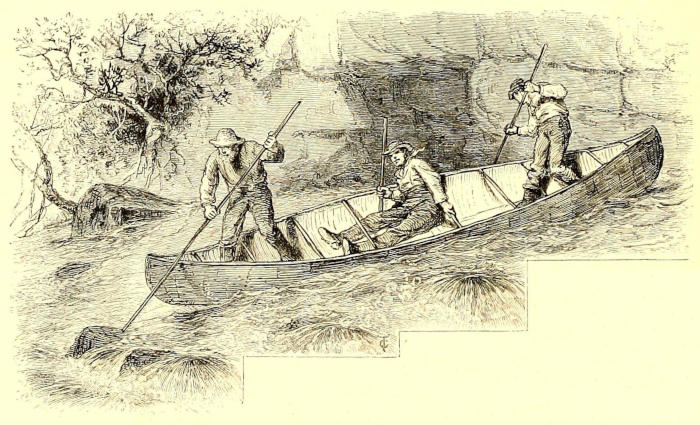
SHOOTING THE RAPIDS.
There is only one way in which a true sports-man will catch a salmon, and that is by fly-fishing. But there are a great many other ways, some of which, although unfair, are rather curious. Salmon have been caught with an ax, with a pitchfork, with a wheel, with many forms of nets and spears, by trolling, and by still-bait fishing. Captain Charles Kendall, an old Boston sailor, used to say that he once explored a Canadian salmon river nearly to its head and met a multitude of salmon coming down in water so shallow that their backs were exposed, and he killed scores with an ax, as they tried to rush between his legs. The poor fishes were also attacked by birds of prey. This is the only instance recorded of killing salmon with an ax, but when I visited the valley of the Puyallup River, in Washington Territory, three years ago, I was assured that salmon sometimes crowded that shallow stream so thickly that farmers lifted them out with pitchforks and used them as fertilizers on the field. These, however, were an inferior kind of salmon. One of the most cruel and destructive methods of catching salmon was by water-wheels, at the cascades of the Columbia River. In former times, the Indians gathered at the cascades at certain seasons, picketed their ponies, built wigwams, and remained for days, and often weeks, spearing and netting the ascending salmon all along the shores. But white men found a way of destroying a far larger number of these noble fish. Salmon when coming up the rapids swim near shore. Wheels were built, and suspended partly in the water so that the paddles were rapidly turned by the swift current. The salmon swimming against these paddles were struck with great force, lifted clear of the water, and thrown into tanks arranged near by. The murderous wheels kept on revolving, throwing up every fish within reach, and there was nothing for the owners to do but to gather the quantities of salmon out of the tanks and use them in their salmon-canning establishment. It is not strange that a strong popular feeling soon grew up against this wholesale slaughter.
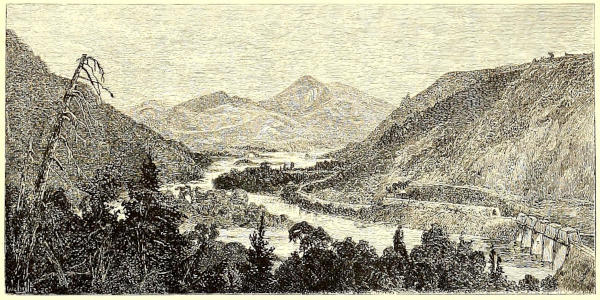
JUNCTION OF THE METAPEDIA AND RESTIGOUCHE RIVERS,—A FAMOUS SALMON POOL.
At the mouth of the same river, the Columbia, net-fishing for salmon is carried on in a larger way than anywhere else on this continent. In the fisheries and canneries nearly seven thousand men are employed—Swedes, Russians, Norwegians, Finns, Italians, Portuguese, Greeks, and Chinamen, a curious mingling of races. Much of this net-fishing is done at night, the sail boats starting from[744] Astoria toward evening and returning in the morning. Sometimes the capsized boats drift ashore alone, for the breakers where the currents of river and ocean meet frequently swamp them, and each season many men are drowned. Between three and four million dollars’ worth of salmon have been sent from the Columbia in a year. In the North-east a great many salmon are caught in nets at the mouths of the St. Lawrence and other Canadian rivers, many more indeed than anglers would allow if they could control the net-fishing. Most of these salmon are artificially frozen and sent to our Eastern markets, where they now have to compete with Oregon salmon. Spearing salmon is very properly forbidden by law in Canada. I have read an account of an odd method of harpooning salmon, which was practiced on a river in the Inverness district in Scotland. At one spot the river falls in a cascade through a narrow cleft in the rocks. Sitting beside this, the fisherman, who had a line attached to his spear, struck a salmon as it tried to leap up, let go his spear, keeping hold of the line, and then, climbing down to the pool below, drew in the exhausted fish at his leisure. This reminded me of an Indian on the Restigouche, who, I was told, used to throw his short spruce pole into the water after hooking a salmon, and paddle after it in his canoe, until the fish was so wearied by dragging the pole about, that the fisherman could easily land it. Still more curious is Sir Walter Scott’s account in his novel, “Red Gauntlet,” of salmon-spearing on the Solway Frith, an arm of the sea between England and Scotland. He describes a company of horsemen riding over the sands and striking with their spears at the salmon which darted about in the pools, where they had been left by the ebbing tide. This kind of salmon-fishing on horseback must have been very like “pig-sticking” in India.
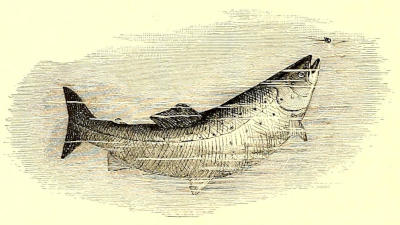
A SALMON RISING TO THE FLY.
On this side of the ocean, trolling for salmon is unknown; there is very little, if any, bait-fishing, and a salmon-spear, in the North-east at least, is only to be found in the hands of a red or white poacher. Poaching on Canadian rivers has diminished, but the law is still broken on the sly; and many odd stories are told of poachers’ tricks. Nearly all these rivers are watched by two sets of wardens. There are the Government wardens appointed to prevent illegal fishing with nets or spears, or out of season, and there are wardens employed by private persons to watch the water which they lease; for every pool in a salmon river is valuable property. Once the Government claimed the fishing privileges, but it was decided that the owners of lands along the rivers controlled the water; and now the farmer’s income from his water is sometimes larger than that from his land; and the limits of each ownership are as carefully marked off as are limits of farms or of town lots. The unlawful act which the wardens most carefully guard against is “drifting.” One or two poachers will steal out at night carrying a peculiarly made net in their canoes. They stretch this across the head of a pool; and it is so weighted and buoyed that it stands upright, reaching nearly to the bottom. As the current causes the net to drift down stream, one canoe stays at each end to keep it straight. There is usually a white rope at the bottom of the net. Seeing this, the salmon raise themselves a little, only to be caught by the gills in the meshes. When the shaking of the net shows that one is caught, the poacher quickly paddles to the spot, raises the net, kills the fish with a blow on its head, and throws it into the canoe. In this sneaking way, nearly all the salmon in a pool may be netted out in a night. If the wardens happen to come along in their dug-outs, they try to seize the net and identify the poachers. Then there may be a fight, and perhaps a canoe will be sunk, and a poacher or a warden will get a cold bath. On one river, the poachers used to station a boy on an island below them, with a horn which he blew whenever the wardens approached. One of the latter was so active that the poachers resolved to punish him. They took an old worthless net and stretched it out into the river from a rock on the bank. A rope was rove through the net and the shore end made fast over a pulley to the traces of a horse. A boy stood beside the horse, and two poachers in a canoe held the outer end of the net. Down came the warden, poling along in his dug-out, and pulled the end of the[745] net away from the seemingly unwilling poachers. He began taking it into his dug-out, congratulating himself on his prize, and had hauled it halfway in, when the boy on shore struck the horse, which started on a full gallop up the bank, jerking the net after it. In a flash the net was pulled out of the dug-out, the latter upset, and the astonished warden pitched into the river. But I hope the poachers were punished in their turn. For if these lawless men had their way, there would be no salmon left in the rivers, and no such glorious sport as fly-fishing.
It is for this that hundreds of Americans go away down East every summer. At the junction of the Metapedia and Restigouche rivers are the comfortable buildings of the Restigouche Salmon Club, which is composed of New York gentlemen. In front of the club-house is the finest pool on the river, and the club owns land and water for some miles above. Below, several pools are leased by a small American club, and Americans pay thousands of dollars for fishing privileges on rivers all the way from Nova Scotia to Labrador. Some of my boy readers may have accompanied their fathers or big brothers to Canadian salmon rivers, and themselves landed salmon. If not, I hope they may do so soon.
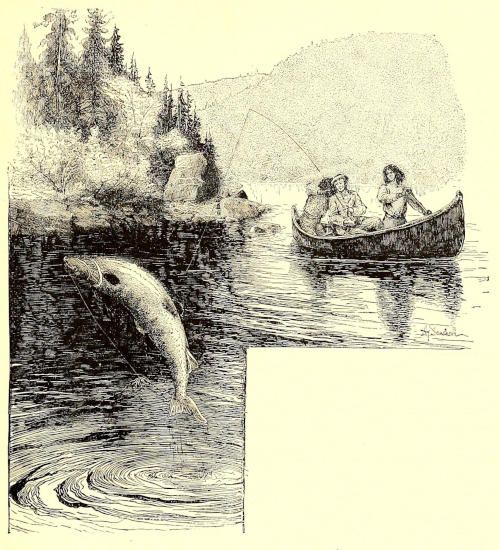
“RIGHT BEFORE YOUR EYES, THE GREAT FISH LEAPS FOUR FEET FROM THE WATER.”
For this fishing, a boy should use a rod not over sixteen feet long, and weighing about twenty-seven ounces. Split bamboo is the finest material, but satisfactory rods are made of ash and lancewood or greenheart. The heavy reel holds a hundred or a hundred and fifty yards of braided silk line. Usually a gut leader, also called a casting-line, which is about nine feet long, is fastened directly to the silk line. Only one of the large gaudy salmon flies is used on the leader at one time. Suppose yourself thus equipped, sitting in the middle of a cranky birch-bark canoe, on the Restigouche, with an Indian at the bow and another at the stern, paddling to the head of a salmon pool, as the morning mists rise from the mountains. Just below the rapids, the Indians turn the canoe into midstream and drop the anchor, which clinks musically upon the stones of the bottom. You take up the rod, which will[746] seem awkward if you have been using a seven or eight ounce trout-rod, and holding it in both hands, one above and one below the reel, begin to make short casts in front and on either side. It is always well to whip the water near the canoe, for there is no telling where a salmon may be. Once I looked down over the side of my canoe into the very eyes of a large salmon. He lay at the bottom, looking up at me for a moment, then flirted his tail scornfully and disappeared. I should like to have seen more of him. You will lengthen out the line a few feet at a time, as you continue casting, and you will always keep the point of your rod moving a little up and down, so that your fly shall be in motion in the water. Possibly the longed-for salmon will jump out of water at the fly. If so, he will probably miss it. More likely, you will suddenly see a mighty swirl in the water, catch a glimpse of a head, perhaps, and feel a tug—at least you are likely to, if you “strike” when you see the swirl.
Then all in the same instant the reel begins to scream and your heart to beat like a trip-hammer. Up comes the anchor, the Indians paddle over to one side of the river, and you manfully keep the rod pointing upward, clutching it with your left hand above the reel, the end of the butt pressed against your waistcoat buttons, and your right hand ready to reel in line if the fish comes toward you or sulks at the bottom.
All at once something happens which takes away your breath. Right before your eyes the great fish leaps four feet from the water, his writhing body curved like a silver bow, and glistening in the sunlight until he falls back with a splash that almost makes your heart stop beating, for fear he has broken loose. But no! You instinctively lowered the tip of your rod when he jumped, and he did not fall upon a taut line, as he hoped, and break away. The reel screams again as the salmon darts off down river; and as the canoe-men paddle after, you think of the Indian who lassoed the locomotive. Perhaps he will rush through the lower rapids into the pool below. Never fear! He is well hooked, and the strain of the rod is telling. Backward and forward he darts, while the line cuts the water, now sulking quietly, again startling you by a wild leap. At last he begins to yield. The canoe-men paddle you to a beach where you cautiously step out, keeping your face to the foe. Slowly, carefully you reel in line, straining the fish toward you. The Indians wait with the gaff, a large steel hook in the end of a stout pole. Now the salmon makes a despairing run, then, growing weaker, he obeys your strain. You can see him plainly as he comes into shallow water. What if you should lose him now! The Indians, bent double, ankle-deep in water, watch his every motion. One strikes at him, but misses, and the gallant fish makes another fight for life. But now he is within reach. The gaff is raised carefully, you hold your breath, and this time the steel pierces that silvery side, and out of the foaming water the gaff draws a noble salmon, your first—and let me hope a forty-pounder. Perhaps twenty minutes have passed since you hooked him,—perhaps an hour; but you have lived an age.
May all the boy readers of St. Nicholas some time know such thrilling sport as this! And the girls, too, may emulate their brothers, and each some time land a salmon. At least they can have the sport without holding the rod. One of the prettiest sights which I saw on the Restigouche was the eager face of a little girl in a canoe, with her father, who was fighting a twenty-five-pound salmon. Looking at her parted lips and wide-open eyes, I felt sure that girls as well as boys could feel the fascination of that most exciting of all forms of angling, salmon-fishing.
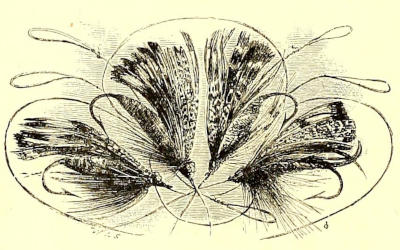
[2] Verrazani, a Florentine navigator, is now believed to have been the original discoverer of the Hudson, about 1525.
[3] About three hundred thousand salmon fry have been planted in the upper waters of the Hudson each year, since 1882. In 1884, a salmon weighing four pounds was taken near Hudson, New York, and several yearling salmon were caught, a year ago, in a stream tributary to the Hudson. Last spring, a salmon weighing ten pounds was taken in Gravesend Bay, and there have been other similar results from the work done by Mr. Fred Mather, Superintendent of the New York Fish Commission, in charge of the station at Cold Spring Harbor, Long Island. It is thought that the Hudson was never much frequented by salmon for the purpose of spawning, on account of Cohoes’ and Miller’s Falls. But the fish were formerly taken near the mouth of the river, and it is hoped that the entire river may be made a salmon stream, if it will “grow salmon,” by the construction of fish-ways which will enable the salmon to ascend the falls. Professor Baird, the United States Commissioner of Fish and Fisheries, restocked the Connecticut, where no salmon had been for twenty-five years, with such success that “Connecticut River salmon” were regularly quoted in the markets. But the fishermen caught out the spawning fish and foolishly depopulated the river so that the work was stopped, although I understand that another effort has been made recently. In the Penobscot River, in Maine, salmon have been hatched and cared for, until, this very season, there has been excellent salmon fishing in the neighborhood of the city of Bangor.—R. H.
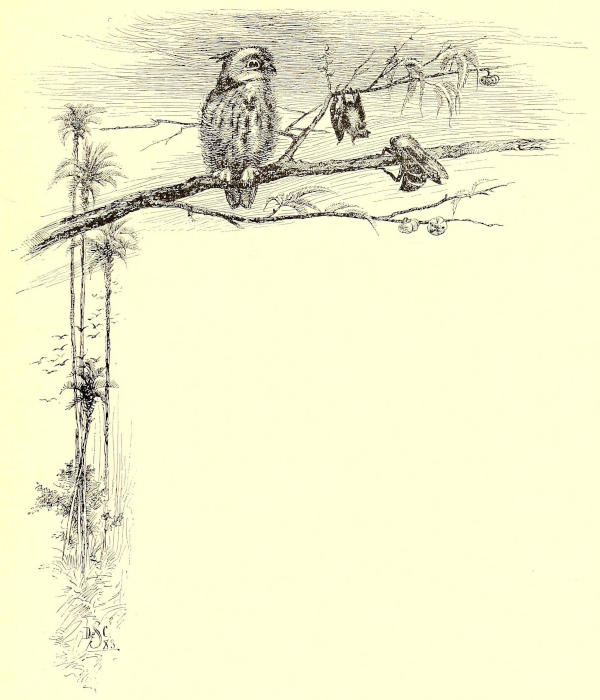
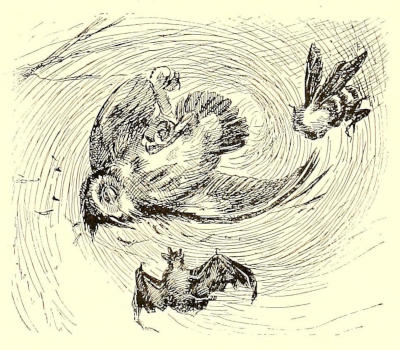
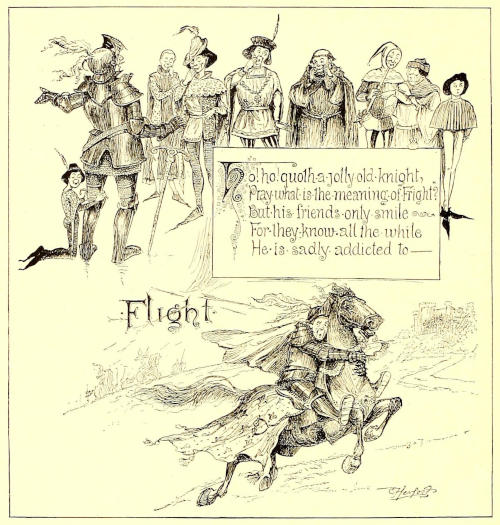
By A. R. Wells.
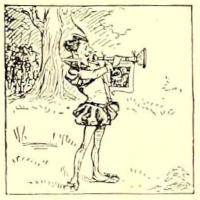
For two days following that bright morning in September, the skies dropped discouragement on all enthusiasms, and dampened any ardor for aggressive change. What feminine heart has the courage to go forth gloriously to conquer or to die—in overshoes and a gossamer?
In the meantime, the girls had not met again, but new thoughts sprouted in their brains, while feeble plans budded and dropped unfruitful from the bough.
Nan lighted a fire in the grate in her room, and re-read and burned package upon package of old letters, tossing away with special vigor all those tied with that badge of sentimental girlhood—a blue ribbon. Why always blue?
“There!” she exclaimed, as the last mouse-colored fragment fluttered up the chimney; “there is nothing like beginning again at the foundation, in every way.”
This heroic sacrifice completed, she sewed on some loose shoe-buttons with as much vigor as though she contemplated setting out on foot to seek her fortune. After that, she pressed her forehead against the window-pane, and wished drearily that it would stop raining.
Evelyn, after an hour’s interview with her mother, began to rip up an old dress, though she was evidently busied also with serious thoughts.
Cathy, left to herself, and without the stimulating influence of her friends, decided with placid regret that there was no way to improve her existence; she felt like the man who tried to lift himself over the fence by pulling at his boot-straps.
Bert shut herself up and wrestled with a long column of very symmetrical figures. The result of the addition seemed to dismay her. She clutched her bang with one hand, while she carefully went over the list again.
Bert had lain awake hours and hours the night before, rehearsing the various parts she might assume as a lady-like peddler of different wares to a paying public; but she surveyed her small pack of accomplishments with the sad conviction that she “hadn’t a faculty that anybody would give two cents for.” “If some one would kindly hire me to read all the new novels, or should desire my services as assistant hostess at endless dinners and luncheons, I think I might command quite a salary,” sighed she, knowing well her own self-poise and general success in those unremunerative employments.
“Or, there is my other little stock-in-trade,” she continued with disconsolate amusement—“writing letters! I do think I can write a letter.”
And she could, because she always wrote with the keen mental enjoyment of exercising her own fluent powers of expression. “But,” she reflected, “who is going to pay my dress-maker for the intense pleasure of being allowed to receive my epistles? No, letter-writing hasn’t any market value—But—but hasn’t it?”
Ah, now she was really thinking! For she sat motionless, with raised eyebrows and parted lips; then she started to her feet, walked excitedly up and down her room a few times, surveyed herself in the glass, and laughed and chuckled in a mysterious way as she put on her overshoes and hoisted her umbrella.
Mr. Mitchell was a very busy man—too busy to know his daughter very well; and, as is far too common with busy men, he regarded a girl as an entirely useless, rather expensive but withal pleasant factor of his establishment. So, as may be imagined, he was somewhat surprised as he sat in his private office on that particular drizzly day, hurriedly writing a business letter, when Bert, bright and emphatic, suddenly appeared.
Her father, without stopping his rapid pen, looked up, between sentences, long enough to say with good-natured bewilderment, “Why, Bert, what has brought you here? Do you need some more money?”
Bert flushed at that question. Some thoughts with which she had been exercising her mind had made it a trifle sore; and in the mood occasioned by those thoughts, her father’s evident surprise at her appearance, his slight emphasis on “here,” and his seemingly natural conclusion as to the cause of the phenomenon, rather hurt her feelings.
“Money?” she said, with some heat, “No, sir! Do you regard me as only a creature with an all-devouring greed for gold?”
Then, laughing pleasantly as she deposited her umbrella in the rack, she added, “No, Papa dear, not just now. I thought you would be going home soon and I’d like to walk up with you.”
Mr. Mitchell paused a moment, in the act of clapping on another stamp, to survey his tall daughter through his eye-glasses.
“Eh! That’s good. I can’t go for half an hour though—six or seven more letters to write.”
He said this a little wearily, and proceeded to date another sheet of paper, running his left hand through his thin hair, as though he had already forgotten his daughter’s presence in the absorbing nature of his relations with “Messrs. Hutton, Wells & Co.”
Bert sat down in an office chair and looked about her. Not that she had never been in her father’s office before, but never before had she looked at it with the same mental vision that now surveyed the dingy windows, dusty writing-desk, and generally unkempt and dismal aspect of the place where her father spent so much of his life.
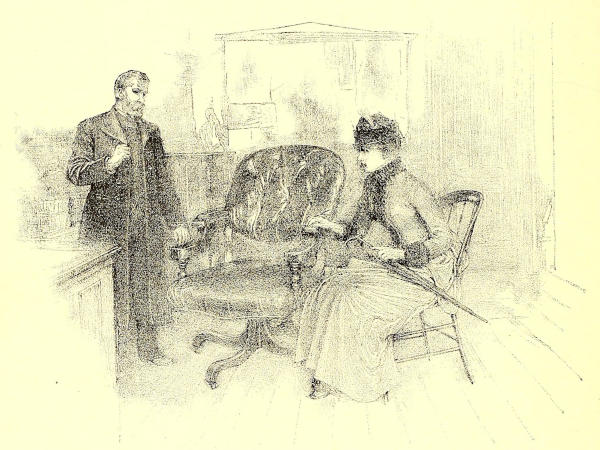
BERT AND HER FATHER HAVE A BUSINESS INTERVIEW.
“Dear me,” she thought, “how soon I could brighten up things! I wonder if he would like it if I should try?”
Presently Mr. Mitchell collected a heap of letters, shut up his inkstand, and wheeled his chair slowly about, as he carefully counted them over.
Bert, who had been contemplating in her mind’s eye the effect of a rug on the floor, looked up and remarked, “What a lot of letters!”
“Yes,” answered her father with a sigh, “since Nelson went I have had my hands full. It is hard to fill his place.”
“Why?” asked Bert, with interest.
“Because,” said Mr. Mitchell slowly, “good stenographers do not grow on every bush; and it is difficult to find any one to whom I can intrust my private correspondence.”
He took his coat from the hook and slowly put it on his shoulders, while Bert sat still, looking very lugubrious.
“Oh,” she said slowly, “would your amanuensis have to know short-hand?”
“Of course,” her father replied, looking somewhat surprised at the unusual interest in such affairs exhibited by his brilliant daughter, of whom he had perhaps been rather more proud than fond.
“You see,” he continued, “I might as well write them myself as wait for him to write out my dictation in long hand.”
Mr. Mitchell stepped into the general office to[751] give a direction to one of the many clerks, all of whom were getting their hats with great promptness as the minute-hand neared six.
Bert sat looking thoughtfully at a fantastic cobweb in the corner.
When her father returned and asked her if she were ready to start, she still did not offer to stir; but, planting her umbrella firmly on the floor, she said in a very serious voice, but with a gleam in her eyes:
“Sir, I called strictly on business. Hearing that your confidential clerk had gone South because of weak lungs, I came to apply—pray take a seat, sir; you seem about to faint—to apply for the place.”
Mr. Mitchell sat down.
“To be frank, sir, I must own that I am not thoroughly conversant with short-hand, but I should immediately go to work to perfect my knowledge, and in the meantime I should endeavor to be of valuable assistance to you.”
By this time, the senior member of the firm looked so helplessly confused that Bert began to laugh, breaking down utterly in her commercial tone of voice. Then she added in a rush of words, as she made a dash at her father and clasped her hands behind his neck: “Oh, do let me, Papa!—I’d be very confidential, and I’m just wild to earn some money!”
At this last remark, the astounded man probably would have gasped, had not his daughter prevented such an expression by a kiss.
“You poor dazed man!” she laughed. “Now please sit down, and it will take me just two minutes to explain my strange conduct; you will accept me as your helper in one second more; and then I shall commit my first act of indiscretion as your clerk, by walking home arm-in-arm with my employer.”
By this time Mr. Mitchell had risen equal to the joke, as he still considered the entire comedy, and demanded references as to her epistolary ability. Bert at once deafened him with an avalanche of names; but she immediately grew serious again, and began to explain frankly her new thoughts and desires.
Of course she was met by the usual discouragements with which the masculine mind teems, but she silenced them all by an earnest request for the privilege of a trial, like any other applicant for a clerkship.
At last, after much talking and earnest arguments, it was finally settled as they walked home under one umbrella, with a strange new sense of comradeship, that Bert should present herself at her father’s office next morning in time for the opening of the mail.
“No doubt of it, Nan!” called Bert from the foot of the Ferrises’ stairs, early next morning.
Nan suddenly ceased expressing her intentions in song, and appeared leaning over the balustrade, with a blue veil tied over her head, waving a dust-cloth. When she saw that it was Bert, who had interrupted her strain of melody, she proceeded to finish the verse, ignoring the break, and singing:
Then she cried: “Why, Bert! what brought you over at such an unearthly hour in the morning?” But, without waiting for an explanation of so startling an event, she went on, “Oh, come up-stairs—I’ve changed my room all about, and it is very much prettier.”
Bert looked fresh and alert as she took out her watch and said laughing:
“I can’t, thank you; haven’t time; besides, I’m afraid my enthusiasm wouldn’t come up to your expectations, as I think I’ve missed one or two of your Friday revolutions, and probably all your things are back again where I last saw them.”
“Oh, no!” Nan retorted; “this combination has never before been offered to an American public!”
“What! Have you turned your mirror to the wall and your bed up-side-down?”
“Bert, you’re saucy!” cried Nan. “But why are you in such a hurry?”
“Because,” Bert began sententiously, “a business woman can’t waste mornings at this rate. My oysters and salad are earned by the labor of my hands, and depend upon a faithful discharge of my duties. Good-morning, idle worms! I am off; my employer will be expecting me,” and the lofty confidential clerk stalked tragically toward the door.
“Your what?” cried Nan, while Evelyn flew out of her room and demanded, “What under the sun are you talking about, Bert?”
Bert was now leaning against the newel-post in a paroxysm of laughter.
“Girls,” she said with great impressiveness, “I mean exactly what I say—I’m ahead of you all! Aha, my precious Nan! I am due this morning at the office of ‘N. F. Mitchell & Company, wholesale and retail seed house,’ in the capacity of private secretary!”
“Oh, Bert,” commented Evelyn with sympathetic pride in her friend. “Oh, you dear, brave Bert!”
Nan was silent for a moment, but her shining eyes were eloquent with surprise and delight; finally she said slowly, with returning incredulity:
“No, Bert—you don’t really mean it—you are jesting.”
“Jesting! Please come and see me perched on a stool six feet high, with an inky streak across my nose, and my fingers a sight to behold! Well,” glancing again with a business-like air at her watch, “call at the office, since you have nothing else to do, and look in, but don’t dare to speak to me. Good-bye!” she said as she opened the door; “good-bye!” she shouted from the front steps, and “good-bye!” again at the gate; while Nan and Evelyn gazed after her and then at each other.
“‘I’m struck spachless,’ as the Irishman said,” murmured Nan, sinking upon the top step.
“I think it’s grand news,” asserted Evelyn, with a deep sigh of gratification; “let’s hurry up with our work, and go to Cathy’s this afternoon! Wont she be astonished!”
And away they sped to their own rooms and their own plans.
Not that these two sisters led lives apart, for they were the best of friends, and had already discussed their respective hopes and fears. The fears were usually monopolized by Evelyn, who was of a timid, self-distrustful nature and hesitated to attempt many things where Nan rushed boldly in. But if she was not made to lead, she was well adapted to follow, if only she were encouraged by a more dauntless spirit. Nan was such a spirit; yet Evelyn, in her quiet way, often held her impulsive sister to a purpose when the dull reaction from high enthusiasms set in with Nan.
And so it came about that when Nan flattened her nose against the window-pane on that rainy day, she also flattened her spirits by a deliberate survey of her available accomplishments; and when, half an hour later, Evelyn came in, it was to find her younger sister, the stalwart ex-champion of independence and fun, with a shiny nose and moist-looking eyes!
“Why, my dear Nannie,” said Evelyn, tenderly, hastening to her sister’s side and putting her arms about her, “what troubles you?”
This sympathy caused a fresh sniffle, to be duly smothered in the damp handkerchief, while the meek sufferer moaned, “Oh, I’m mad!”
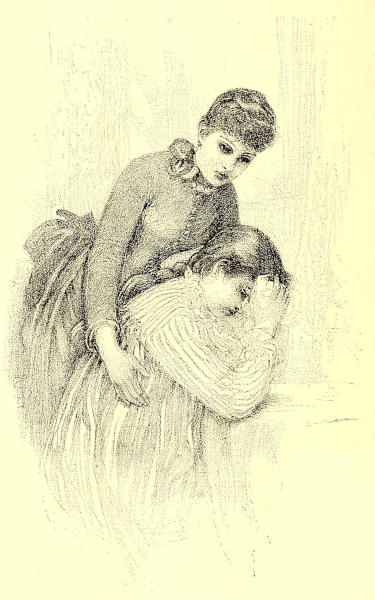
THE CHAMPION NEEDS ENCOURAGEMENT.
Evelyn smiled, for she knew that when Nan thought how “mad” she was, she would stop crying.
“Yes,” she resumed brokenly, though her voice gained strength as she went on, “I am about as disgusted and angry as I can be!”
“For what reason?” asked her sister.
“Because,” replied Nan, with a catch in her breath, “because I’m not a man—if you must know! Here only yesterday I had enough courage and determination to start two boys in a good lucrative business, and now to-day I face the fact[753] that nobody has expected me to do or to be anything in particular, and that all my expensive education hasn’t provided me with a single weapon to fight my way with, if I had to fight. Why, even if I were reduced to begging,” she added, with a sniff, “I shouldn’t know enough to warm over the cold pieces I received! Don’t you think it is just too bad to be a girl?”
“I used to think so,” Evelyn answered slowly, turning her head away to arrange the draping of a curtain. But in a moment she resumed her elderly-sister fashion of speech—she was three years Nan’s senior—“No, Nannie, if you really wish to be brave and self-reliant, you have full opportunity to be so, as you are.”
“But what can I do?” broke in Nan, stormily; “boys always have some occupation ready and waiting for them.”
“Oh, no, they haven’t!” answered Evelyn. “Just think how many college students we have known who haven’t decided on a profession until their senior year. They study the various branches and callings until they find in which line they have the most ability.”
“Oh, dear! there it is again!” sighed Nan hopelessly “they always do develop a taste for something, and then everything is all right. But I don’t long to do anything except to be miserable about it,” she again sighed. “But, to return to the point at issue, my dear sister, will you have the kindness to mention what I do well?”
“You are capable in many ways and at many tasks; whatever you do succeeds.”
“What?” wildly demanded Nan.
“Why, your hats are more Parisian than Paris; you draw well, paint well, and you are certainly very ingenious. Look at this room!”
They both looked and saw a very quaint and dainty room, made pretty, moreover, not by money, but by taste and skill. Even the owner’s troubled countenance relaxed as she contemplated the effect of some yellow cushions she had recently added to an old chair that she had reclaimed from the shades of the attic, and had thus adorned.
“Yes,” she assented reluctantly, “my room is rather satisfactory; but who is going to pay me for making oriental divans out of old piano-boxes, I’d like to know?”
As Evelyn didn’t immediately order one, Nan went on, dejectedly dropping her chin into her palm. “But I should like to be artistic—even for money’s sake, you know. I want to have a studio, with queer bits of drapery that you don’t have to mend or hem. I’d like to be a decorative artist, and go into people’s houses and sweep out all the hideous steamboat furniture one sees. And I wish to know artists, and to have them come to my studio and eat sardines and crackers, and play Spanish airs on a banjo while I paint things to astonish the world. No, on second thought, I’d rather design, and if I could play the banjo myself while I thought up new ideas—wouldn’t that be lovely!” she shouted gleefully.
She was quite cheerful now, with her little imaginary exploits.
“Then an artist is what you are fitted to be, Nan, dear,” announced her sister with conviction; “for what any one wishes to be, that he may be.”
Nan received this scrap of philosophy with a shrug.
“Yes, if he is a long-headed old fellow and wishes within his limits!” she said.
“But I think some sort of artistic achievement is within your limits,” urged Evelyn.
Nan bestowed a grateful look at her sister, but immediately voiced another objection: “Where am I going to begin? People are always talking about the ‘avenues now freely opened to our emancipated sisters,’ but no one ever tells a poor girl exactly how to begin—what to do first. Men have chances and opportunities.”
“Yes,” Evelyn quickly rejoined; “and do you know how they happen to fill them? By being equal to their demands. If I were you, I should go to work and perfect some incomplete accomplishment. But I hear Mother calling. Come, cheer up, sister mine! ‘We miss the good we oft might win, by fearing to attempt,’ you know.”
This saying was a truth that had often been urged by Nan upon Evelyn’s own attention during seasons of self-abasement; so there was a touch of sarcasm in the elder sister’s smile, as she glanced back from the door.
By that time, however, Nan’s nose was assuming its natural hue, and life began to look more hopeful, for she had a strong spirit that liked to conquer obstacles.
“Yes, Nan Ferris,” she thought, “it is about as that wise old Evelyn says; you have as good a chance as anybody without respect to sex, and you shall be something worthy of existence! You shall do some one thing so well that somebody will be frantic to pay you a fabulous price for it. And what will you do with this wealth?” she went on, addressing herself. “Are you so base that you yearn for filthy lucre for its own sake? No, Nan Ferris, you are not. First you will pay your own little bills, and lighten your father’s cares instead of his pocket; and then, may be, you can go on lovely little sketching tours in the summer; and, perhaps—oh, Nan!—perhaps, if you are a great success, you can go to Europe some time and study art!”
This climax of prospective bliss was so top-heavy that the whole delightful pile came crashing down, laying bare to this architect of her own fortunes the uncertain foundation on which she had built.
(To be continued.)
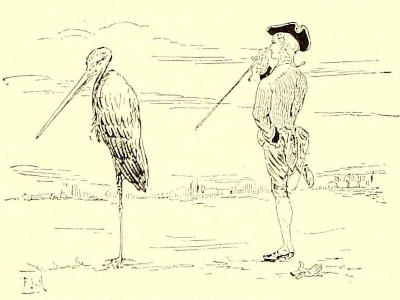
I.—THE INSULT.
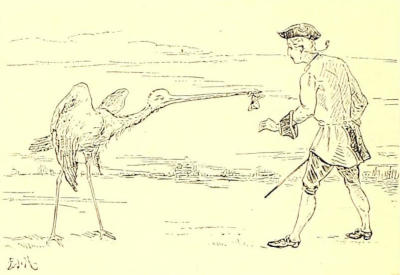
II.—THE CHALLENGE.
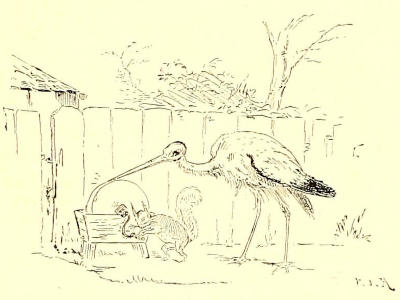
III.—PREPARING.
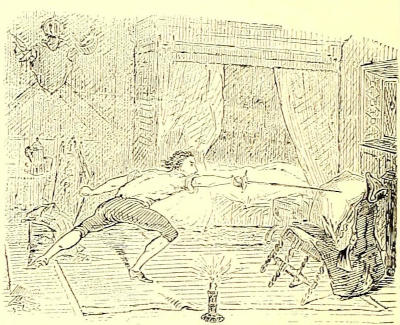
IV.—PRACTICING.
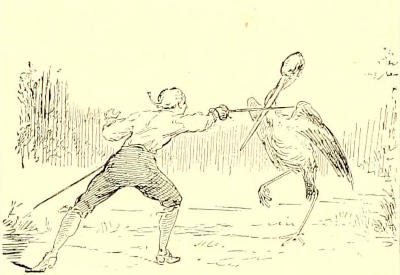
V.—THE ENCOUNTER.
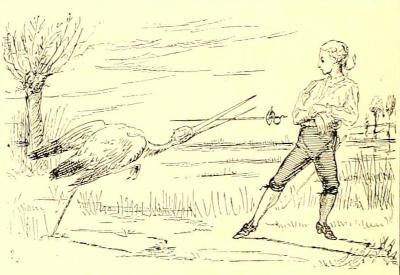
VI.—OUTNUMBERED AND DISARMED.
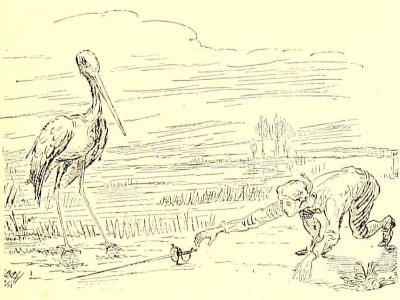
VII.—ALLOWED TO RECOVER ARMS.
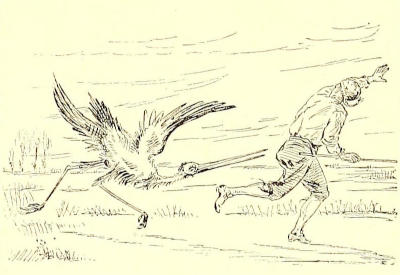
VIII.—IN FULL RETREAT.
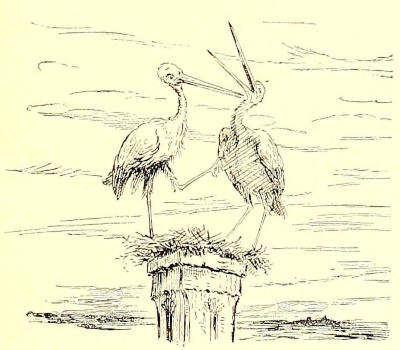
IX.—“YOU SHOULD HAVE SEEN HIM RUN! HA, HA!”
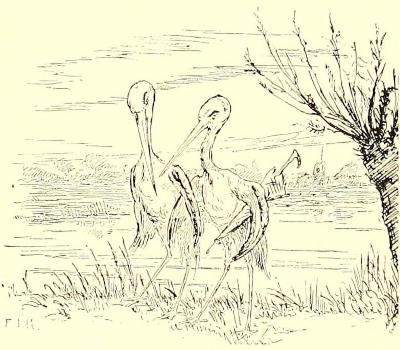
X.—“YOU NOTICE THAT WE ARE NOT INSULTED ANY MORE.”
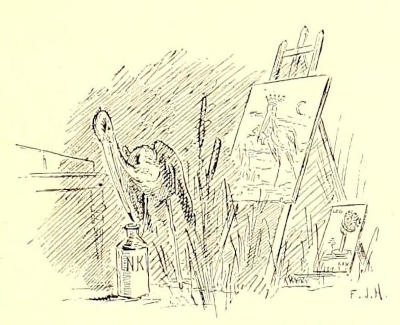
XI.—“IT WAS TOO GOOD AN ADVENTURE TO BE LOST. I MUST WRITE AN ACCOUNT OF IT.”
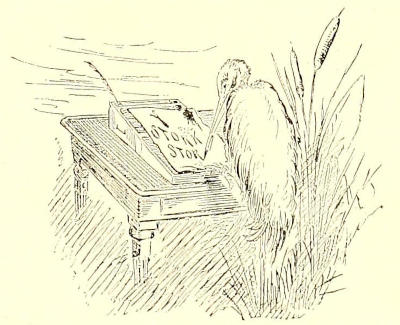
XII.—“JUST IMAGINE HIS FEELINGS WHEN HE READS THIS IN PRINT! THE PEN is EVEN MIGHTIER THAN THE SWORD!”
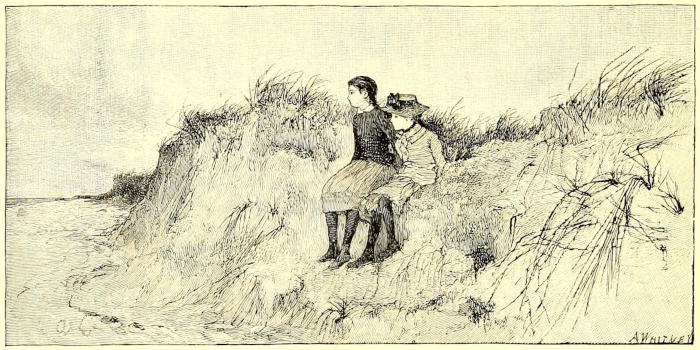
“AT LAST HE WAS TIRED AND HID HIS HEAD.”
By Horace E. Scudder.
The battle of Monmouth was the last great battle before the final victory at Yorktown. The three and a half years which intervened, however, were busy years for Washington. He was obliged to settle disputes between the French and American officers, to order the disposition of the forces, and to give his attention to all the suggestions of plans for action. He was greatly concerned that Congress should be growing weak and inefficient. Here was a man, whom some had foolishly supposed to be aiming at supreme power, only anxious that the civil government should be strengthened. He saw very clearly that while the separate States were looking after their several affairs, the Congress which represented the whole country was losing its influence and power. “I think our political system,” he wrote, “may be compared to the mechanism of a clock, and that we should derive a lesson from it; for it answers no good purpose to keep the smaller wheels in order, if the greater one, which is the support and prime mover of the whole, is neglected.”
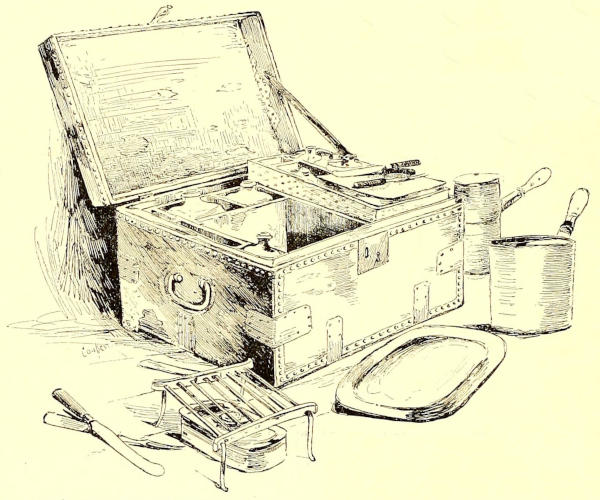
WASHINGTON’S CAMP-CHEST AND COOKING UTENSILS. [NOW IN THE NATIONAL MUSEUM AT WASHINGTON, D. C.]
He was indignant at the manner in which Congressmen, and others who were concerned in the affairs of the country, spent their time in Philadelphia. “An assembly,” he said, “a concert, a dinner, a supper, that will cost three or four hundred pounds, will not only take off men from acting in this business, but even from thinking of it; while a great part of the officers of our army, from absolute necessity, are quitting the service; and the more virtuous few, rather than do this, are sinking by sure degrees into beggary and want.” How simply he himself lived may be seen by the jocose letter which he wrote to a friend, inviting him to dine with him at headquarters. The letter is addressed to Dr. Cochran, Surgeon-General in the army:
“Dear Doctor: I have asked Mrs. Cochran and Mrs. Livingston to dine with me to-morrow; but am I not in honor bound to apprize them of their fare? As I hate deception, even where the imagination only is concerned, I will. It is needless to premise that my table is large enough to hold the ladies. Of this they had ocular proof yesterday. To say how it is usually covered, is rather more essential; and this shall be the purport of my letter.
“Since our arrival at this happy spot, we have had a ham, sometimes a shoulder of bacon, to grace the head of the table; a piece of roast beef adorns the foot; and a dish of beans or greens, almost imperceptible, decorates the center. When the cook has a mind to cut a figure, which I presume will be the case to-morrow, we have two beefsteak pies, or dishes of crabs, dividing the space and reducing the distance between dish and dish, to about six feet, which,[759] without them, would be near twelve feet apart. Of late he has had the surprising sagacity to discover that apples will make pies; and it is a question if, in the violence of his efforts, we do not get one of apples, instead of having both of beefsteaks. If the ladies can put up with such entertainment, and will submit to partake of it on plates once tin but now iron (not become so by the labor of scouring), I shall be happy to see them; and am, dear Doctor, yours.”
The main activity of the two armies in the last years of the war was in the South, where General Gates, and after him General Greene, were engaged in a contest with Lord Cornwallis. Washington, meanwhile, kept his position on the Hudson, where he could watch the movements of the enemy still in strong force in New York. The care of the whole country was on his shoulders, for, except by his personal endeavors, it was impossible for the armies to secure even what support they did receive from Congress and the State governments. The letters written by Washington during this period disclose the numberless difficulties which he was obliged to meet and overcome. He was the one man to whom all turned, and he gave freely of himself. How completely he ignored his own personal interests may be seen by an incident which occurred at Mount Vernon.
Several British vessels had sailed up the Chesapeake and Potomac, and had pillaged the country roundabout. When these vessels lay off Mount Vernon, the manager of Washington’s estate, anxious to save the property under his charge, went out and bought off the marauders by a liberal gift. Washington wrote at once, rebuking him for his conduct. In the letter, he used these words:
“I am very sorry to hear of your loss: I am a little sorry to hear of my own; but that which gives me most concern is, that you should go on board the enemy’s vessel and furnish them with refreshments. It would have been a less painful circumstance to me to have heard that, in consequence of your non-compliance with their request, they had burnt my house and laid the plantation in ruins. You ought to have considered yourself as my representative, and should have reflected on the bad example of communicating with the enemy, and making a voluntary offer of refreshments to them with a view to prevent a conflagration. It was not in your power, I acknowledge, to prevent them from sending a flag on shore, and you did right to meet it; but you should, in the same instant that the business of it was unfolded, have declared explicitly that it was improper for you to yield to their request; after which, if they had proceeded to help themselves by force, you could but have submitted; and being unprovided for defense, this was to be preferred to a feeble opposition, which only serves as a pretext to burn and destroy.”
In July, 1781, Washington’s army, which was watching Sir Henry Clinton in New York, was re-enforced by the French troops, and at the same time a French squadron cruised off the coast ready to co-operate. General Greene was crowding Lord Cornwallis in the South and edging him up into Virginia, and the design was to keep the two British armies apart, and defeat each. But the siege of New York was likely to be a long one, and the French admiral had orders to repair to the West Indies in the fall. So time was precious.
Accordingly, Washington determined to mass his troops in Virginia, unite the northern and southern armies, and, in conjunction with the French fleet, completely crush Cornwallis. It was necessary, however, that Clinton, in New York, should suspect nothing of this scheme, or else he, too, would join Cornwallis. The change of plan was carried out with great skill. Letters were written detailing imaginary movements, and these letters fell into the hands of the British general, who supposed that great preparations were making to attack him in New York. Meanwhile, a few troops only were left in camp at White Plains, while the rest of the army crossed the Hudson and moved rapidly to Virginia. It was not until the two armies were within reach of each other that Clinton learned what had really been going on.
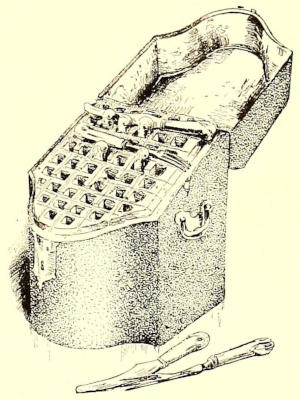
KNIFE-AND-FORK-CASE USED BY WASHINGTON.
Washington took this opportunity to make a flying visit to Mount Vernon. It was the first time he had been there since he left it to attend that meeting of the Continental Congress at which he had been chosen Commander-in-Chief. He had never lost sight of his home, however. Thither his thoughts often turned, and many a time, amid the anxieties and cares of his burdensome life, he looked with longing toward the quiet haven of Mount Vernon. He wrote weekly to the manager of his estate, and he gave him one general rule of conduct in this wise: “Let the hospitality of the house, with respect to the poor, be kept up. Let no one go away hungry. If any of this kind of people should be in want of corn, supply their necessities, provided it does not encourage them in idleness.”
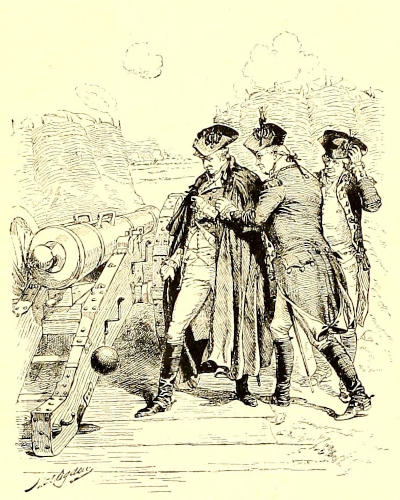
“PRESENTLY A BALL DID STRIKE THE CANNON, AND, ROLLING OFF, FELL AT WASHINGTON’S FEET.”
He staid but a couple of days at Mount Vernon, where he was joined by Count Rochambeau, and then he hastened to the headquarters of the army at Williamsburg. It was now the middle of September. Cornwallis was at Yorktown, and everything depended on the ability of the combined French and American forces to capture his army before he could be re-enforced by Clinton. The leading generals of the American army were there eagerly directing operations, and Washington was at the front superintending the works, for the men were fighting Cornwallis with the spade as well as with cannon. Washington put the match to the first gun that was fired. One who was in the army at the time relates an incident that came under his notice:
“A considerable cannonading from the enemy; one shot killed three men, and mortally wounded another. While the Rev. Mr. Evans, our chaplain, was standing near the Commander-in-Chief, a shot struck the ground so near as to cover his hat with sand. Being much agitated, he took off his hat, and said, ‘See here, General!’ ‘Mr. Evans,’ replied his excellency, with his usual composure, ‘you’d better carry that home and show it to your wife and children.’”
Indeed it seemed to many that Washington bore a charmed life, and it was often said that he was under the special protection of God. He was fearless, and constantly exposed to danger, but his constant escapes made him cool and self-possessed, and the admiration of his men. He was excited by the events which were hurrying the war to the close, and he watched with intense earnestness the several assaults which were made on the works. Once he had dismounted and was standing by Generals Knox and Lincoln at the grand battery. It was not a safe place, for, though they were behind a fortification, it was quite possible for shot to enter the opening through which they were looking. One of his aids, growing nervous, begged him to leave, for the place was very much exposed.
“If you think so,” said Washington, “you are at liberty to step back.” Presently a ball did strike the cannon, and, rolling off, fell at Washington’s feet. General Knox seized him by the arm.
“My dear General,” said he, “we can’t spare you yet.”
“It’s a spent ball,” replied Washington, coolly. “No harm is done.” He watched the action until the redoubts which his men had been assaulting were taken; then he drew a long breath of relief and turned to Knox.
“The work is done,” he said emphatically; “and well done.”
The siege was short, the work was sharp, for it was full of enthusiasm and hope, and when, on October 19, the army of Lord Cornwallis surrendered to General Washington, there was a tumult of rejoicing in camp which was long remembered. Washington issued orders that the army should give thanks to God. “Divine service,” he said, “is to be performed to-morrow in the several brigades and divisions. The Commander-in-Chief earnestly recommends that the troops not on duty should universally attend, with that seriousness of deportment and gratitude of heart which the recognition of such reiterated and astonishing interpositions of Providence demand of us.”
The officers of the combined armies spent some time in the neighborhood, and there was a great ball given at Fredericksburg by the citizens of the place. The most distinguished guest was the mother of Washington, then seventy-four years old, who came into the room leaning on the arm of her son. She was quiet and dignified, as one after another of the French officers made his bow and his complimentary speech; but I think there must have been a great deal of motherly pride in her heart, though it is said that when her George came to see her alone after the victory at Yorktown, she spoke to him of his health, marked the lines of care in his face, spoke of his early days, and gave him a mother’s caution, but said nothing of the glory he had won. To the last he was her boy, and not America’s hero.
After the surrender of Yorktown and the departure of the French, Washington established his headquarters at Newburgh on the Hudson. There he remained with the army until it was disbanded; and the house in which he lived is carefully preserved and shown as an historical museum.
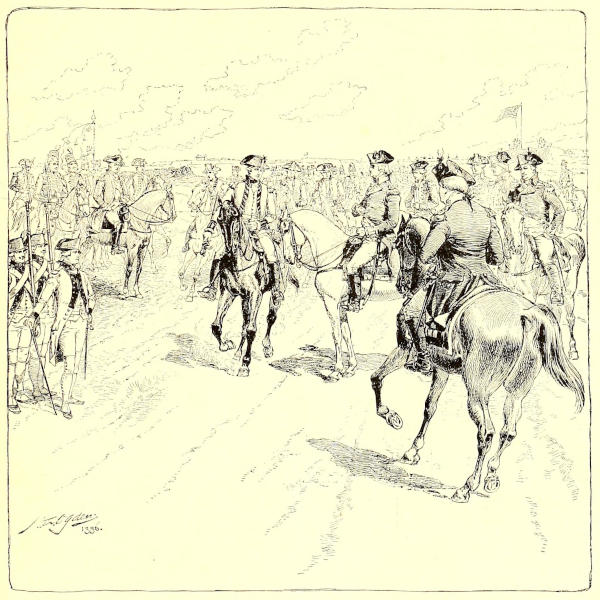
SURRENDER OF LORD CORNWALLIS.
There is a pleasant story of La Fayette’s affectionate remembrance of the life there. Just before his death, which occurred in 1834, he gave a dinner party in Paris to the American Minister and some friends who had been old associates. Later in the evening, when it came time for supper, the guests were ushered into a room which was in strange contrast with the elegance of the apartments they had been in. The ceiling was low, with large beams crossing it; there was a single small, uncurtained window, and several small doors. It looked more like an old-fashioned Dutch kitchen than a room in a French house. A long, rough table was meagerly set. A dish of meat stood on it, some uncouth-looking pastry,[762] and wine in decanters and bottles, ready to be poured out into glasses and camp-mugs.
“Do you know where we are now?” asked La Fayette as his companions looked about puzzled, and as if in a dream. “Ah! the seven doors and one window! and the silver camp-goblets! We are at Washington’s headquarters on the Hudson, fifty years ago!” He had reproduced the room as a surprise to his friends.
Peace did not come at once after Yorktown; there was still fighting in a desultory way, but all knew that the end was not far off. Yet the soldiers could not go back to their homes, and Congress was shamefully remiss about paying them. Murmurs deep and loud arose, and Washington suffered keenly from the neglect shown to the army. It required all his patience and tact to keep the murmurs from breaking out into violent action. With no military duty to perform, and with the impatience of men who were suffering injustice, the officers and men began to form all sorts of plans.
One of the officers—and how many agreed with him is not known, but the sentiment easily took this form—one of the officers wrote to Washington that it was clear that Congress was a failure. The army had won independence, but no reliance could be placed on the Government. How much more stable was the Government of England! Would not such a government be after all the best for America? It might not be necessary to call the head of the government a king, though even that title many would prefer, but the head ought to have the power of a king. There was much more to the same effect, and the letter was really a feeler to see how Washington would look upon such a movement, which, of course, aimed to make him the monarch of the new nation. Washington did not hesitate a moment, but wrote a letter which must have made the officer’s ears tingle, however honest he may have been in his opinion. Washington said:
“With a mixture of great surprise and astonishment, I have read with attention the sentiments you have submitted to my perusal. Be assured, sir, no occurrence in the course of the war has given me more painful sensations than your information of there being such ideas existing in the army as you have expressed and I must view with abhorrence and reprehend with severity. For the present, the communication of them will rest in my own bosom, unless some further agitation of the matter shall make a disclosure necessary. I am much at a loss to conceive what part of my conduct could have given encouragement to an address, which, to me, seems big with the greatest mischief that can befall any country. If I am not deceived in the knowledge of myself, you could not have found a person to whom your schemes are more disagreeable. At the same time, in justice to my own feelings, I must add, that no man possesses a more sincere wish to see ample justice done to the army than I do; and as far as my powers and influence in a constitutional way extend, they shall be employed to the utmost of my abilities to effect it, should there be any occasion. Let me conjure you, then, if you have any regard for your country, concern for yourself or posterity, or respect for me, to banish these thoughts from your mind, and never communicate, as from yourself or any one else, a sentiment of the like nature.”
A graver peril arose, and Washington redeemed his promise to stand by the army. In spite of the united effort of the army and its friends in Congress, no satisfactory arrangement was made for paying the long-delayed wages due to the soldiers. On March 10, 1783, a notice was issued in the camp at Newburgh, calling a meeting of the officers. The notice was not signed by any name, and with it was sent out an address which rehearsed the wrongs suffered by the army and hinted that the time had come when the soldiers must take matters into their own hands and compel Congress to attend to their demands. It was an appeal to which the officers were ready to listen, and every one was in so excited a condition that it was impossible to say what might not be done.
Washington, at any rate, saw there was great danger, and he at once seized the occasion. He issued an order calling attention to the address, and asking that the meeting should be postponed four days and then should convene at his invitation. This was to give the men time to cool off. When the day came, Washington, as soon as the meeting was called to order, made a long and powerful speech. He was not a ready speaker, and so, feeling the importance of the occasion, he had written out what he had to say, and he began to read it to the officers. He had read only a sentence, when he stopped, took out his spectacles, and said, as he put them on:
“Gentlemen, you will pardon me for putting on my glasses. I have grown gray in your service, and I now find myself growing blind.”
It was a simple thing to say, and simply said, but it touched the soldiers, and made them very tender to their commander, and more ready even than before to listen to his counsel. Washington went on to say:
“If my conduct heretofore has not evinced to you that I have been a faithful friend to the army, my declaration of it at this time would be equally unavailing and improper. But, as I was among the first who embarked in the cause of our common country; as I have never left your side one moment, save when called from you on public duty; as I have been the constant companion and witness of your distresses, and not among the last to feel and acknowledge your merits; as I have considered my own military reputation as inseparably connected with that of the army; as my heart has ever expanded with joy, when I have heard its praises, and my indignation has arisen, when the mouth of detraction has been opened against it; it can scarcely be supposed, at this late stage of the war, that I am indifferent to its interests.”
He used all his personal influence to heal the breach between the army and Congress, and he brought the officers back to a more reasonable mind. All the while he was writing to members of Congress and doing his utmost to bring about a just treatment of the army.
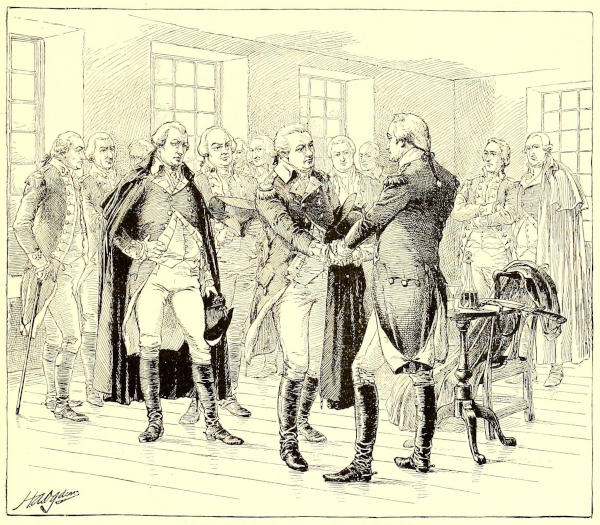
WASHINGTON BIDDING FAREWELL TO HIS GENERALS.
When the time came to disband the army, Washington, ready as he was to go back to his home, could not forget that the work of the past seven years would not be completed until the people which had become independent was united under a strong government. He was the foremost man in the country; he was also profoundly aware of the difficulties through which they were yet to pass, and he addressed a long letter to the governors of the several States. Congress was weak and unable to take the lead. The States were each provided with governments, and were the real powers, but Washington saw clearly that it would not do to have thirteen independent governments in the country, each looking only after its own interests. So in this letter he tried to show the States the importance of four things:
1. An indissoluble union of the States under one head.
2. The payment of all the debts contracted by the country in the war.
3. The establishment of a uniform militia system throughout the country.—He did not advise having a standing army, but he thought all the men should be drilled in their neighborhoods, formed into companies, and be ready in any peril to take up arms again.
4. The cultivation of a spirit of confidence between different parts of the country. He had seen so much jealousy and prejudice that he knew how dangerous these were to the peace of the country.
At last the time came when the army was disbanded. A few of the troops only and their officers went with Washington to New York when the British left the city. There was rejoicing everywhere; but it was a sorrowful moment when Washington took leave in person of the officers[764] who had stood by him through the long, dreary years of the war. He was about to leave the city to be ferried across the North River to the Jersey shore, and his old friends gathered to say good-bye at Fraunces’ Tavern, in Broad street. When he entered the room he could scarcely command his voice. He said a word or two, and they all drank a farewell toast, as the custom was in those days. Then Washington said: “I can not come to each of you to take my leave, but shall be obliged if each of you will come and take me by the hand.”
General Knox stood nearest, and he held out his hand. The tears were in Washington’s eyes as he turned to his old comrade and grasped his hand. He drew the strong man to him—Knox was nearly twenty years younger than Washington, and very dear to him—and kissed him. Not a word could either of them speak. Another general followed and another, each greeted with the same affection; and then Washington left the room, passed through the corps of infantry which stood on guard, and walked to Whitehall, followed by the whole company, a silent procession. He entered the barge, turned as the boat pushed off, and waved his hat in silent adieu. The officers returned the salute in the same way, and then turned and in silence marched back to Fraunces’.
Washington went to Philadelphia. Congress was in session at Annapolis, but the Treasury was in Philadelphia. On receiving his commission as Commander-in-Chief, Washington had announced that he would receive no money for services, but would keep an exact account of all his expenses. That account he had kept as carefully and scrupulously as any book-keeper in a bank, and he now rendered it to the Comptroller of the Treasury. It was in his own handwriting, every item set down and explained. I know of few incidents in Washington’s career which show the character of the man better than this. He held that a sacred trust had been reposed in him, and he meant to be faithful in the least particular.
On December 23, 1783, Congress was assembled at Annapolis. The gallery was filled with ladies. The Governor, Council, and Legislature of Maryland, several officers, and the Consul-General of France were on the floor. The Members of Congress were seated and wore their hats to signify that they represented the Government. The spectators stood with bare heads. General Washington entered and was conducted by the Secretary of Congress to a seat. When all was quiet, General Mifflin, who was then President of Congress, turned to Washington and said:
“The United States, in Congress assembled, is prepared to receive the communications of the Commander-in-Chief.”
Washington rose and read a short address, in which he resigned his commission. He delivered the paper into the hands of the President, who replied with a little speech; and Washington was now a private citizen. The next day he left Annapolis, and made all haste to return to his beloved Mount Vernon.
(To be continued.)
By Willis Boyd Allen.
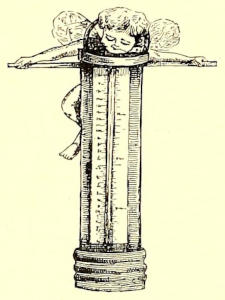
There had been rain among the mountains for almost a week. Every day the newspapers brought reports of clear, warm weather in Boston and New York, while the Crawford House guests gathered in shivering groups around their open fires and applied themselves to indoor occupations, discontentedly or cheerily, according to their various dispositions. Among the most impatient in the hotel was a group of young people, who, as the season drew to its close, were more eager than ever to improve each shining hour. The hours, however, refusing to shine on any terms, that gloomy September week, the bees were left “to hum,” as Lou Elwin plaintively remarked.
When, therefore, the sun at last looked over the mountain-tops one cool, delicious morning, and with his shining fingers gently drew aside the misty draperies that had so long overhung the little valley of the Notch, great was the delight of old and young at Crawford’s, and it was an eager company of boys and girls that assembled about the big parlor fireplace after breakfast. As soon as they were fairly together, half a dozen were chattering at once.
“Isn’t it glorious?”
“What shall we do——?”
“Where shall——?”
“Fabyan’s!”
“Tennis!”
“Bugle Cliff!”
“A walk down the track.”
A shout of laughter greeted this last proposal, which was offered by a delicate-looking youth of about eighteen.
“Fred is afraid that he’ll rub the shine off his boots!” cried one of his companions, slapping him on the shoulder.
“Or tear that tennis suit on the rocks,” suggested Lou Elwin, with a toss of her pretty head, as she leaned back in her chair and planted her own stout little boots emphatically on the hearth. Lou was the acknowledged leader among her set at Crawford’s, that season, in all the jaunts and good times that were planned. She was a Boston girl, and she had her full share of the independent spirit that characterized her ancestors. Whenever the party set out on a scramble over the rough mountain-paths, her joyous laugh was sure to be heard far in advance of the rest; it was always her tennis-racket that met and returned the ball when the play was apparently lost; it was Lou Elwin whose name zigzagged all over the cards of the best partners an hour before dancing began.
Fred Seacomb did not quail, however, before her little broadside of irony, but just looked straight into her eyes for a moment, and said quietly, “You know better, Lou.” And then he proceeded to argue his proposal, with such effect that in five minutes more the whole party of young folks were racing down the plank walk toward the railroad.
At the little rustic shop beyond the station, the girls stopped for caramels, packages of which the sterner element dutifully tucked into their coat-pockets, ready for instant use. Thus provisioned, they all struck off in the direction of the Notch, walking in twos and threes, on the railroad ties, or balancing with little shrieks and a great deal of laughter on the narrow rails. Lou, as usual, was ahead, but Fred soon caught up and took his place at her side.
For several minutes, nothing was said by either. Then Lou exclaimed, almost pettishly:
“Why do you try to be so quiet, and exact, and—and different?”
“You know, Lou, I can’t stand quite so much as some of the other fellows. The doctor——”
“Oh, yes, I know. You’re up here for your health, and all that; but you might ‘fly around’ a little more, get a little bit—just the least little bit—rumpled, once in a while, like the rest of us!”
Fred laughed now, merrily enough, and perhaps would have defended himself, had not another boy of about his own age joined them at that moment, having caught the import of the girl’s words.
“If you think Seacomb can’t ‘fly around,’ Miss Elwin, you ought to see him in the gymnasium, at Harvard! He’s the best man on the bars in the Freshman class, and he can——”
“There, there, Arthur!” interrupted Fred, “girls don’t care about such affairs as that. My blackest sin, just now, is the shine on my boots, isn’t it, Lou?”
Fred had known her long, and as an intimate friend, and so he used her first name easily—a liberty rather envied by some of the later comers.
At the end of the Crawford plateau, they all turned away from the track for a few moments, to visit “The House that Jack Built.” Of the mysterious “Jack,” who was popularly believed to subsist on toads and snakes, the girls stood rather in awe, and so they left the boys to do the talking. Somewhat to Lou’s surprise, Fred Seacomb seemed to be on excellent terms with the bluff Jack, who had been an English sailor. The party soon chorused good-bye, and ran back down the path to the track, to resume their excursion. They now entered the Notch itself, and for a few minutes even their gay laughter was hushed in the presence of those gray cliffs towering high, high above their heads. It seemed as if they were leaving the land of sunshine behind them, and were entering the very home of storm and avalanche. The iron track, clinging to the crumbling slope, gave no sense of security or conquest over the terrible forces of nature; rather, it was a frightened thing, like each one of themselves, at the mercy of the stern, granite-browed hills overhanging it.
They emerged from the dark ravine, and gazed on the fair valley opening before them, with a keen sense of relief which showed itself in a renewed chorus of happy, thoughtless talk and laughter. Once they sprang aside, and stood in a gay-colored group against the embankment, to let the nine o’clock Portland train pass. Then they went on, more merrily than ever, the girls gathering clusters of brilliant golden-rod and purple asters for their hats and belts. It was Fred who discovered a single blue violet blossoming serenely and cheerfully at that late day directly between the iron rails, and with all the desolateness of Mount Willard stretching up into the sky above it.
Lou took the offered flower without a word, and—wished it had been golden-rod.
“Isn’t there any manliness about him?” she thought fretfully. “That was just like a girl. I believe I’m more a boy than he is, now!”
She saved the violet, however, and tucked it away carefully, where it could not be injured or lost.
About a mile below the Notch, a small house stood beside the track, occupied by a young married couple and their two children, who were held up to the open window to look at the strangers. Fred handed in a spray of asters to the baby, and the bashful little mother took them with a nod and a pleased expression in her face. Lou had started to do the same thing, but drew back sharply, vexed again, when she saw Fred step forward with his flowers. The woman, however, had noticed her movement, and after a moment’s hesitation beckoned to the girl. Lou was by this time some distance down the track, and shook her head, pleasantly enough; for, however much out of sorts, she rarely forgot herself so far as to be really rude to any one. The woman seemed anxious, as Lou was about to join her party, and leaned out of the window, pointing up the track and making gestures which were quite incomprehensible. But Lou was in no mood for trifling or lingering. She gave the baby a parting wave of her hand, and ran off after the rest, who had not noticed this little episode. Fred Seacomb was just in front, provokingly unconscious of her unfavorable opinion, and—what? yes, actually racing with one of the girls! Well, the morning was so bright, and Lou’s own nature so like it, that the clouds soon blew away, and she was one of the merriest of the party as they drew near the agreed limit of their excursion.
The sun was well up over the mountains when they reached the upper end of the trestle-bridge which spans the deep chasm of Willey Brook. It was an uncanny sort of place, and as the girls crept up to the edge and looked down at the jagged bowlders eighty feet below, they shuddered and shrank back, with their hands over their eyes. One or two proposed starting for home at once, and the whole party probably would have begun the homeward march, had not one of the boys in an unlucky moment remarked in a loud whisper to his neighbor:
“’Twould be just like Lou Elwin to propose to go across.”
“I think she’s scared, though, this time,” replied his companion with a laugh.
Lou stopped short, and the others with her. She had caught a part of the foolish words, and guessed the rest. Turning squarely about, she surveyed the yawning gulf, and the slender road across it, with shining eyes and flushed cheeks. Her breath came quickly. She was afraid, but should the others know it—especially Fred Seacomb, whom she had been taunting with weakness?
Without otherwise announcing her intention, she walked deliberately toward the trestle, and stepped upon the narrow line of boards which were placed across the ties for a foot-way. Fred sprang forward and laid his hand on her arm.
“Lou! Surely you’ll not attempt——”
“Fred Seacomb, I’m going across this bridge. If you don’t wish to go,” she added, in a tone which implied more contempt than she meant,—she was so excited,—“you can sit down here and wait till we come back. Who’s going to follow?” she cried, raising her voice and glancing over her shoulder. She looked very pretty, standing there with a great cluster of asters in her belt, her eyes sparkling, and little wisps of hair blowing about her face. Two or three stout fellows came forward eagerly enough, and one of the girls. Fred had not moved. Lou could feel his fingers tremble on her arm. Now he tried to speak again, but she shook off his hand impatiently, and turned away.
“But, Miss Elwin—Lou——” No, she would not listen. Already she was well out upon the trestle, and the wind, drawing down through the ravine, had begun to buffet her slender figure.
“Lou—you’ve forgotten—the train!”
She could not hear now, if she would. The wind caught the words and hurled them away down the valley after the brook.
The boards were wet from the recent rains, and to her dismay she began to find it difficult to keep a steady footing. One moment, the wind would howl in her ears, and seize upon her fluttering dress with its powerful grasp until she was obliged to lean against it with her whole force; the next, the gust would die away, withdrawing its support so suddenly that she nearly fell. She could not turn, but she knew that those who had foolishly started after her must be some distance in the rear, for she heard nothing from them. She did not know that they had given up the perilous task and gone back at Fred’s first warning.
Once, and only once, she ventured to look down through the trestle work. Far, oh! so far below, she could see the waters of the little stream as it lay among the rocks with no sound, but moving on its white way silently. At the same moment, a blast of wind grasped and shook her so fiercely that she well-nigh lost her balance on the uneven boards. There was no rail or support of any kind on either side or overhead; only space, space, whirling in the wind, and below, the rocks and the white brook.
Giddy, half fainting, she paused irresolutely, attempted, perhaps, to turn back, and sank upon the bridge with a sob of genuine terror, clinging to the smooth iron track and hiding her face in her hands.
As she did so, she heard a peculiar, vibrating hum in the rail that sent the blood to her heart. Behind her, in their safe position on the embankment,[767] the rest heard it, too, and, looking up, saw what was coming. The Boston express, with a long and heavily loaded train, was at that very moment rounding a curve not a mile above the trestle, and rushing upon them, a roaring, resistless avalanche of iron.
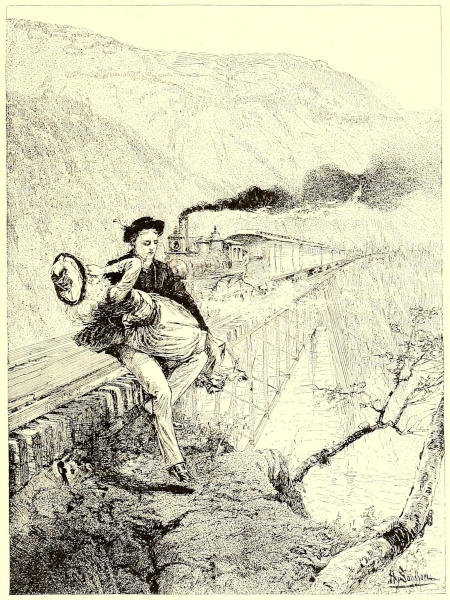
“THE TRAIN, TOO, WAS ON THE BRIDGE.”
Lou felt as if she were in a nightmare. She tried to move, but was as motionless as if she were lashed to the bridge. As if in a bewildering dream, she faintly caught the sound of her companions’ cries of terror and warning; in a bewildering dream, she heard two shrill notes echoing and re-echoing from the mountains far and near, and knew it was the agonized shriek of the great, laboring locomotive, powerless to prevent what the rocks below were waiting for. She had read in books of people who, in extreme peril, saw the details of their past life like a flash; with the wet iron rails quivering and twanging more and more loudly under her hands, she knew what it meant.[768] But even while the last accents of the whistle were sobbing themselves away in the distance, there came a sound of footsteps, light and swift. Two strong arms seized the girl about the waist, and, still, as if in a strange dream, she knew it was the languid, delicate Fred who was running with her in his arms along that fearful height.
A few moments later, a hollow roar and tremulous movement under his feet told that the train, too, was on the bridge.
When Fred leaped from the track, upon the farther side, the locomotive was not forty feet behind them. The engineer’s pale face stared at them an instant from the cab; then the train, with groaning brakes, smoking axles, and a shower of cinders, thundered past and was gone. Not one of the passengers knew of the escape, or even of the danger.
It was afterward learned, however, that the appliances of the air-brake on the engine would not work that day, and the train, with its tremendous acquired momentum, ran to Bemis station, nine miles below, before it could be brought to a standstill.
With half-closed eyes, Lou lay helplessly on the mossy plot where Fred had placed her, and, in the slow waking from her dream, she watched him as he went to and fro, at first beckoning and making motions for the rest to join him by crossing the bed of the brook, and then confining his attention entirely to her.
His face was almost as white as her own, as he approached, but she gave him a smile and a grateful look that seemed to reassure him; and, after seeing that her position was as comfortable as circumstances would permit, he took off his thick jacket and laid it over her, in spite of a feeble protest,—for the September morning was still cool, and the wind whistled sharply through the ravine.
Next, Fred busied himself in gathering sticks, and, wet as they were, he succeeded, with the aid of several matches, in coaxing a blaze out of them, almost at her feet. By the time the rest of the company came panting up the steep slope, she had so far recovered as to sit up and hold out her cold hands to the cheery little fire which crackled and snapped merrily against a big bowlder.
Many were the clumsy inquiries of the boys, and the caresses of the girls as they came upon her sitting there, with Fred standing silently at one side—no longer jacketless, for she had pleaded so hard that he had put it on again.
There was some discussion as to what action should now be taken, some favoring a slow return to Crawford’s by the road, some by the track, and some, a short walk further down the valley to the Willey House, where they could obtain rest and refreshment. After many sober arguments, quite different from the eager propositions in the parlor that morning, they decided to return at once to the hotel, and not by the track.
It was a very silent and nervous little group of young people that made its way down to the wagon road at the bottom of the valley. Fred had been nearly exhausted, after all, by his efforts, and Lou was so prostrated that they feared she could not get home at all. But the spirits and strength of the young are elastic, and by the time they repassed the Notch, one would hardly know, to look at them, that anything unusual had happened. It was agreed that all should say as little about the affair as possible. Accordingly, nearly all the party were in the parlor that night, dancing, chatting, and laughing as usual.
For the next few days, it was observed that Fred Seacomb did not play tennis, and that Lou Elwin never again chid him for his mild ways and moderate excursions. Report says that she told him, in her own frank way, that she was ashamed of her former treatment of him; at any rate, she will not hear a word said against him, among her friends; and not once since that day has she been known to accuse him of unmanliness.
Many years ago, a young Italian lad named Gordian, who had been proclaimed, when but fifteen years old, Emperor of Rome, gave the people of his native city a splendid entertainment or “triumph.” And among the many strange and terrible beasts that passed in procession around his amphitheater, were ten curious animals—long-necked, long-legged, and small-headed, with tufted tails and queer little horns. They were of a tawny orange color, beautifully spotted and marked. They were driven around the arena in gilded chariots by their Ethiopian drivers, and were such an odd combination of the body of a camel and the spots of a leopard that the people, who gazed upon them in wonder and surprise, gave to the strange beasts the name of “Camelopardus,” or camel-leopard.
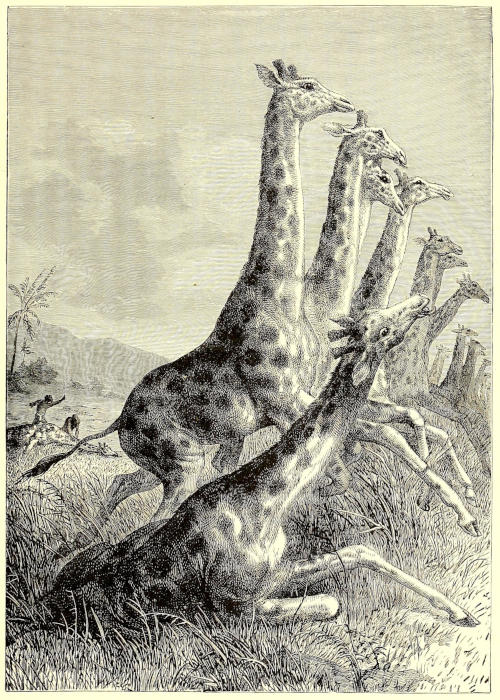
A HERD OF GIRAFFES.
This singular animal, however, had long been known to the Arabians, under the name of “Xirapha,” or “the long-necked.” And from this title comes our word “giraffe,” the popular name now given to the odd-looking beast that the boy-emperor exhibited in his circus sixteen centuries ago.
It is indeed a curious animal. Its chief characteristics are its length of neck and its high fore-quarters. The head is sometimes seventeen feet from the ground, and specimens have been found measuring over twenty feet from hoof to nose. The apparent height of the fore-quarters is not due, as is supposed, to a greater length of the fore-legs, but to the extraordinary height of the withers or shoulder-bones. The tongue of the giraffe is long and prehensile—that is, it is adapted to seize and entwine; it can be tapered so small as to enter the ring of a small key. This long neck and prehensile tongue, which are found in no other animal, enable this giant browser to feed with ease upon the foliage and tender branches of trees.
The eyes of the giraffe are very large, soft, and beautiful, and one would suppose that their mild, imploring expression would restrain the hunters from shooting down so attractive-looking and inoffensive a creature. But the same willful and cruel desire for what is wrongly called “sport,” that has exterminated the buffalo of our Western plains, is killing off the giraffe of Africa. Its strong-tasting flesh is not enjoyable eating, and its hide is of little use; its capture alive is of no value to man, save as a gratification of curiosity; it can not, like the camel, be used as a beast of burden; nor does it, like the ostrich or the elephant, provide either feather or ivory for commerce. In fact, this curious animal is of no practical use to man, and should be left free to roam the plains and forests of its African home, unmolested and unharmed, save for the occasional capture of such living specimens as may help boys and girls to study and admire one of the most singular and graceful of the creatures of the earth.
By Arthur Wentworth Eaton.
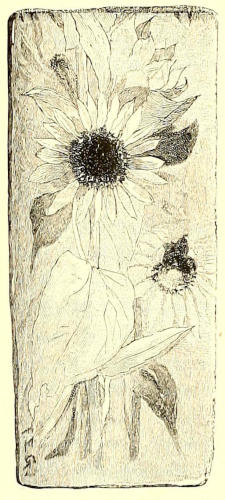
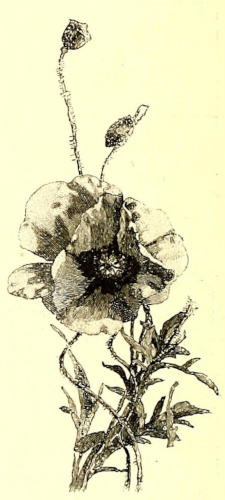
You must have noticed the difference in your own handwriting, when you are using a pen that does not suit you, and when you have one to which you are accustomed. Similarly, when you are writing on a slate—a sharp slate-pencil makes a clear, thin mark, a blunt pencil makes a broad mark with uneven edges. When the pencil is worn down on one side, if you turn it over, it makes another sort of a mark. The writing done with a quill differs from that made with a steel pen. And the differences between the writings of certain nations of the Old World—which at one time puzzled people very much—were often caused by their use of different writing materials, such as: paper and pencils; paper and brushes; bricks and metal pens; wax and metal nails; wood and knife-blades.
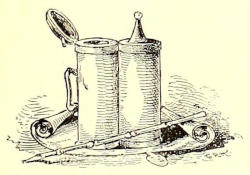
REED AND PEN-CASE OF ANCIENT EGYPT.
The Egyptians, you remember, had two kinds of writing: one called hieroglyphs, used mainly on monuments, for sentences of sacred history, names of kings, and short prayers; the other called hieratic, used on papyrus paper, chiefly for general and quicker writing. Both these terms signify that writing was sacred and connected with the priests. Religion entered very largely into the life of the people of Egypt, and the priests, who formed the most powerful class, held all the learning, and, before the Greeks flourished, were the wisest men in the world. The differences between the rough little sketches that formed the letters of the hieratic or swift hand and the laborious pictures called hieroglyphs, arose originally, and kept growing greater and greater, because of the different materials used in making them. It was natural to work very slowly and carefully on the hieroglyphs which were carved on royal monuments; while the scribes who wrote the hieratic characters on smooth papyrus with a reed pen and thick ink were obliged to disregard the smaller angles and finer outlines, and were satisfied if their work conveyed the meaning they intended. There is a fantastic and not inelegant writing used by the Burmese, a people to the north-east of India, and south of China. This script is very rounded and is made up of fine lines. The letters have been found to belong to an alphabet that looks entirely different; and the difference arose from the custom of writing on palm-leaves with a fine needle. It was difficult to make the plain up-and-down strokes without splitting the leaf, so these strokes were made in curves in circles and half circles.

PORTION OF THE BURMESE ALPHABET.
The alphabet of the Goths, before and about the time they embraced Christianity, was formed on a contrary system. All the strokes were straight, either up and down, or crosswise, or slanting. Many persons have thought this arose because the Goths lacked a feeling for grace and beauty. But that was not the reason. When these forefathers of ours invented or borrowed their runes, and later when they borrowed a true alphabet from the Greeks, they cut their letters on sticks of wood or on smooth lengths of bark. Most boys know by experience how difficult it is to cut a round O on a smooth stick on account of the grain of the wood. This led to peculiar shapes in the letters.
In the earliest known Runic alphabet, the letters do not stand in the order of our letters; and they differ so greatly in other ways from the ordinary Greek alphabet, that it is probable they were borrowed long before the Christian era, and afterward became greatly changed. This Runic alphabet was called the “Futhorc,” from the first six letters, ᚠᚢᚦᚯᚱᚴ—f, u, th, o, r, c. The third rune, ᚦ (th), which came from the Greek Δ, delta, or d, survived in English literature until the last century, and is occasionally used to-day when people wish to write in an old-fashioned style. And they are apt to make a curious mistake in its pronunciation. The rune ᚦ remained in Irish and Anglo-Saxon for the sound th, and in English it was preserved longest in the word “the,” because that word occurs very often, and it was easier to write one letter than two. But[772] in the course of time it came to be mistaken for y; and although our ancestors knew better than to pronounce it like y, their descendants do not, but usually give this apparent y the sound of the real y, making ye’s out of all the the’s. They do not know that this is a survival of a rune almost to the present generation. The fifth rune of the “futhorc” is our r, and the sixth is our k without the tail. The Goths, Angles, and Scandinavians used twenty-four such runes or closely similar letters. You will notice that the Goth, like an unskillful schoolboy who carves his initials on wood, and is bothered by the circle of the o, has solved the difficulty by the bold move of cutting one downward and two cross strokes. Sometimes, however, the o was made by four strokes forming a lozenge ᛜ. They usually cut their down strokes across the grain; and they gave all their cross lines a slant, in order not to bury the point of the knife too deep, and splinter the wood, in cutting with the grain. That is the reason that the cross lines of the letters are rarely horizontal.
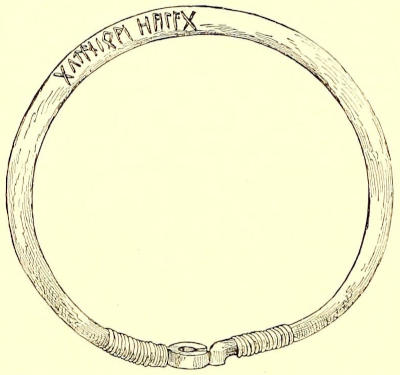
THE BUZEO TORQUE.[4]
Some of our words that are in constant use can be traced back to this period. The word book was originally the same as the word beech, and reminds us of the time when our forefathers carved their records on beech-wood or beech-bark. The similarity of the two words has remained much closer in German; Buch (book) being almost exactly the same as Buche (beech). To sing from a stave is the same as to sing from a staff, because in runic writing the old chants were noted down with a knife on sticks or pieces of bark, and read from these by the singers. The Ojibway Indians, though they had not an alphabet like the runes, until recently had similar staves which they brought out when they chanted their songs; certain marks on the wood served to remind them of what they were to sing.
You may remember my telling you how hard it is to distinguish some of the letters of the Hebrew alphabet from one another, and how the same difficulty is experienced in the case of the Arabic and Persian alphabets. This is due to various reasons, among which was the employment by those nations of pen, paper, and ink for perpetuating records. This tended to make their writing less and less easy to read; and as inscriptions on stone were not common, people did not have the ancient models of letters before their eyes to refer to.
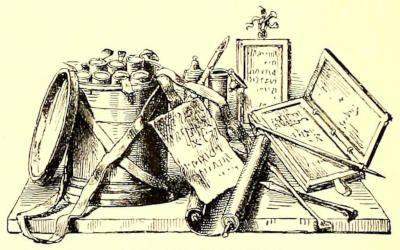
ROMAN WRITING MATERIALS.
The capital letters of our own alphabet, however, are easily distinguishable from one another. We owe this fact largely to the Romans, a clear-headed, practical people, who used for every-day writing slates or boards covered with a thin film of wax, on which the letters were engraved, or furrowed, by a sharp-pointed instrument called a stylus, from which we derive the term “style,” in literature. The yielding quality of the wax encouraged the use of fine, open and legible characters, and the Romans handed down to us an alphabet improved in many ways.
But the most curious example of the modifying influence of the writing materials upon the writing is seen in the cuneiform characters. If, on a hot summer’s day, you should walk between the long lines of bricks in one of the many brickyards that line certain sections of the Hudson river, you would find the fresh-made bricks quite soft, and steaming under the direct rays of the sun. If one of those soft bricks were given into your hand and you were asked to draw a rebus on it, and given a nail with which to do it, you[773] would meet with this difficulty: If, in drawing the outlines of your pictures, you should press equally along the whole length of every line, you would raise small ridges on each side; or, as you became more expert, one ridge on one side, as a plow does when drawing a furrow. And when you should come to draw one line across another, there would be two ugly interfering ridges.
But if you should stop your cross line just before you come to the other, and skip it, beginning again on the other side, your picture would be smoother and the surface of the brick less uneven. You would succeed still better if you should not try to draw continuous lines, but should indicate them with a series of dots made by dabbing the soft brick with a corner of the iron nail. Now, imagine the Hudson to be the Euphrates, and yourself a Babylonian of ten thousand years ago, and the nail a little, smooth, square-pointed piece of copper, iron, tin, or silver, and the pictures conventional signs representing the various sounds of the language, and you would be writing cuneiform. The old Babylonians, in writing, engraved soft bricks with regular and evenly placed dabs. These hardened quickly under the hot sun of Mesopotamia, or were baked in ovens, and so preserved the inscribed characters. Very often a coat of soft clay was wrapped about the original brick, and the same inscription made on the outside. This was done to prevent forgeries, and to make it easier to restore the meaning, if part of the brick were destroyed or lost. Whole libraries of these strange books have been found under the ruins of the palaces of the old kings of Assyria. Still other libraries are lying there waiting for their discoverer.
Did you ever try to make an alphabet of your own? I can distinctly remember inventing one, with a favorite sister, when I was about seven years old. Great was our diligence while at work on it, and great was our secrecy! We used to hide it away so carefully that it was easy to forget about it for weeks at a time. We never learned it well enough to write the simplest sentences in it off-hand,—and for a very good reason: We had too recently learned an alphabet infinitely better than any that a child could think out—one which had been tested and changed and improved by ages of use. I do not doubt that many other children have tried to construct private systems of writing. It has never been uncommon for men to attempt to use secret alphabets. In this respect, the ancient people of Asia somewhat resembled children; and thousands of alphabets and syllabaries were invented in those old days. It is rare, however, that one has been handed down, and only when the people for whom it was devised had a much poorer system or none at all.

A “TREE ALPHABET.”
Sequoiah, an intelligent Cherokee Indian, contrived more recently a syllabary of eighty-five signs, comprising all the sounds in his language, using the English alphabet as a basis on which to form his characters. This syllabary is in use to-day by the Cherokees, and books and newspapers are printed in it. Botanists have given the name, Sequoiah, to the gigantic trees of California, in perpetual memory of his genius.

SPECIMENS OF OLD ASIATIC ALPHABETS. (SEE NEXT PAGE.)
Long ago, when it was dangerous but very profitable to be thought a wizard, it was customary for any wise man who wished to be feared, and to keep his wisdom confined to himself and a few chosen disciples, to write his books in an alphabet or cipher of his own invention. Generally he took some existing alphabet as a foundation, and made variations on it, somewhat as Sequoiah did. I have in my possession a queer little treatise in Arabic, which claims to have been written after a labor of twenty years, and solemnly deposited in the royal treasury, during the reign of a certain Caliph who lived in Palestine more than one thousand years ago. It professes to give a key to the hieroglyphs of Egypt, but its greatest interest lies in the fact that the author has here brought together, in an amusing medley, all the alphabets and ciphers that he has ever heard of; perhaps some that he made up. Here in the upper wood-cut, for example, is a curious tree alphabet. The letters follow the regular order of the Arabic alphabet, each letter varying from the[774] others by the arrangement of the branches on one side or the other of the trunk. Placing these in regular order with the corresponding Arabic letters underneath, the Arab had a simple cipher which the ordinary Oriental who only knows his own letters could scarcely read without the key. Another alphabet, as shown in the second wood-cut on p. 773, is evidently based upon a picture of the sun for alif, or A; while B, C, D, and the following letters are made by varying the first character. Remember that these, being Asiatic alphabets, are written so as to be read from right to left; but the letters are here placed in reverse order to be read like our own alphabet from left to right. This book contains also alphabets founded on the signs for the moon, and on those for the planets, Jupiter, Saturn, Mars, Mercury, and Venus. The one shown on this page is still another, which the author calls the “oldest Chaldean Alphabet.” And one can really trace a resemblance to Phœnician letters in some of these old signs. In fact, it is easy to invent fancy alphabets, as soon as the idea of an alphabet is familiar to the mind; but it is not so easy to induce people to use them. The alphabets actually used by the various nations of the world have been brought to their present state of perfection, as you have seen, by a slow process of growth, one step at a time, and each step the product of intense thought and ingenuity. The Cherokee is an interesting exception to this rule. Of late centuries, there have been few, almost no improvements in our alphabet. This is partly because it is so well adapted to our use, but principally because the invention of printing has tended to fix the style of printed type in one fashion. It is true that when books were first printed in England, the characters used were the indistinct so-called Gothic, or black-letter; but printers soon saw the advantages of the later Italian, or Roman, styles, and have kept to them ever since. The people of Germany are troubled to-day with near-sightedness. It has been claimed, with a great show of truth, that this is largely owing to the fact that the Germans still retain the old black-letter of the early Irish and the Anglo-Saxons. But every year the Germans are printing more and more books in Roman type, and for generations Roman type and Roman script have been taught in their schools, together with the angular Gothic.
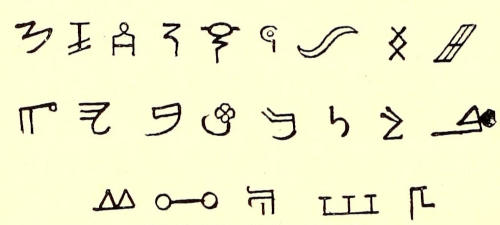
THE OLDEST CHALDEAN ALPHABET.
Among the half-civilized nations which are now being taught our wisdom, many are learning to use our alphabet; and it seems almost certain that in time the whole world, excepting perhaps the Mohammedan nations, will express their thoughts in our version of the letters that came down from the Phœnicians. What a glory for that strange old folk of the Mediterranean Sea!
[4] This massive collar or bracelet, here reproduced from Mr. George Stephens’s “Old Northern Runic Monuments,” was made of twisted gold, and was found at Buzeo, in Wallachia, upon the site, probably, of a heathen temple. The runic characters inscribed upon it mean “dedicated to the temple of the Goths.” This torque was worth nearly twenty thousand dollars.
By I. D.
By H. A. Johnson.
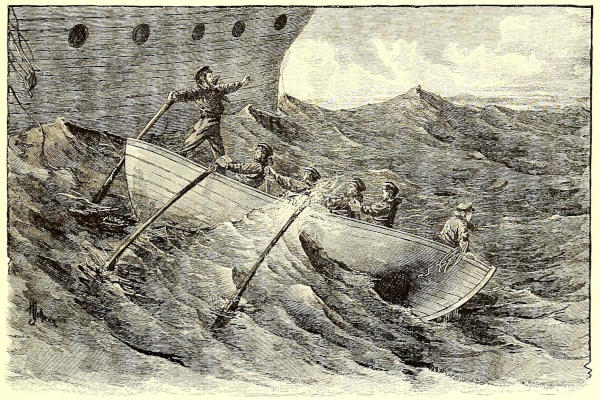
OFF TO THE RESCUE.
The cry of “Man overboard!” always has a startling sound on an ocean vessel. In a naval ship, such accidents, or emergencies, are provided against in advance. Two boats, one on each side of the ship, are kept ready for instant use, and are equipped with everything necessary for a speedy rescue, as well as an outfit, including provisions, for a prolonged search in case immediate rescue is not possible. Picked seamen in each “watch” are assigned to special duty as a life-boat crew, and must be ready to jump into their boat at a moment’s notice.
Some ships are provided with “life-buoys”—queer-looking objects hanging from the stern. In case of a man’s falling overboard at night, one of these life-buoys can be dropped into the water, and lighted immediately, so that the poor fellow can strike out for it at once and cling to it until picked up.
Sometimes, however, the sea runs so high that no small boat could be lowered without swamping and perhaps drowning the entire crew. To decide the question whether to attempt the rescue of a poor fellow who has fallen overboard, at the risk of losing others who might be sent to his aid, is a fearful responsibility for a commanding officer, and requires the coolest exercise of his judgment.
With the first flush of dawn kindling the sky, Perce Bucklin opened his eyes in great bewilderment. But the sight of the sea, and the sand, and his two companions still asleep under their blankets, brought him quickly to his senses.
“‘Wake Nicodemus’!” he shouted, giving each a shake. “The tide is up! the wind is all right, and the kelp is landing! ‘Hurrah for the great jubilee’!”
Moke yawned a sleepy “hurrah!” while Poke, sitting up and rubbing his eyes open, made some complimentary reference to “Uncle Moses.”
“Uncle Moses was right,” Perce admitted. “Now we must have breakfast and be ready for work by the time the tide has gone down a little. Start up the fire while I go and see to the oxen.”
Rubbish had already been gathered, and left to dry about their camp-fire of the evening before. Moke produced some matches, while Poke prepared a wisp of hay for lighting. And now, completely awake, both sang, while Perce was starting off:
The sun came up gloriously over the ocean. It was a superb morning. The wind had gone down during the night, and only a gentle breeze was blowing. The receding tide left long rows and scattered heaps of kelp, rockweed, and other algæ high on the beach.
The boys were in the gayest spirits. While the oxen were still feeding, and the fire getting in condition to roast corn and potatoes, Perce proposed that they should make the most of their time by gathering driftwood.
Then a question of equity arose. The twins thought it fair that all they both secured should be theirs; by which arrangement Perce could have expected to get no more than half as much for his share.
“But why not divide the floodwood the same as we do the seaweed?” he demanded—“Half and half.”
“Because your oxen——” began Moke.
“Don’t help,” added Poke.
“But they’re here on your account as much as they are on mine,” said Perce. “They’re giving their valuable time all the same, whether they help or not.”
“All right! what do you propose?” cried the twins.
“That we divide equally everything we find on the beach—driftwood, seaweed, no matter what,” Perce replied. “Half for you two, and half for me and the oxen.”
The twins agreed good-naturedly, and all set merrily to work. After gathering driftwood for a while, they dug out a place in the hot coals, into which they put their potatoes, wrapped in green sea-moss, and left them to cook. Then the corn was made ready and roasted on the ends of the sticks that had served the same purpose the night before, and at last came breakfast—which they ate with such appetites as I fear some boys who read this know nothing about.
“Won’t Olly be mad when he knows what he has missed?” cried Perce.
They all had to speak loud, to be heard above the sound of the surf.
“If he comes back by the coast——” said Moke.
“We shall see him,” said Poke. “I should think it was time.”
“It’s time to begin on the kelp!” Perce exclaimed, throwing away his last corn-cob, and springing up from his seat on the sand.
The ox-cart was brought around, and halted alongside the heaps of still dripping and glistening seaweed. The larger part of this was kelp, and the most valuable part in the estimation of farmers who make use of these products of the sea to enrich the land.
The kelp grows upon deep-sunken ledges, from which it is detached only by the agitations of great storms,—a weird sort of plant, which in still weather may sometimes be seen, far down, waving mysteriously, with every fluctuation of the tide, in the silent ocean depths. It is often of gigantic proportions, its slippery stems and great, glossy leaves measuring many yards in length. It frequently comes up with clusters of blue mussels and other shells clinging to its roots.
With the kelp, were mixed a tangled rockweed, eel-grass, and Irish moss; all of which the boys pitched on the cart together; Perce starting up the oxen now and then and stopping them again where the litter was thickest.
“How’s this for a devil’s apron?” cried Poke, struggling with an immense leaf of kelp, to which he merely gave the picturesque, popular name; for the twins were well-brought-up boys, who would not for anything have uttered a profane word.
It flopped salt water in his face as he was getting it on the cart; and then, as the oxen started forward, trailed its smooth, wet, snaky stem along the ground.
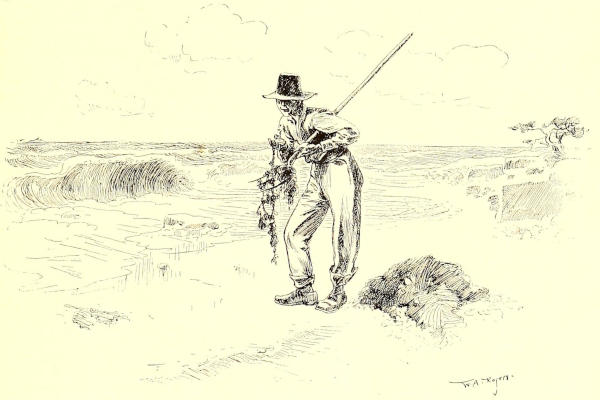
PERCE FINDS THE WATCH. (SEE NEXT PAGE.)
“It’s ugly stuff to pitch,” said Moke, twisting the root in the tines of his fork to assist his brother.
“It’s strange that it always lands against the wind!” said Poke.
“I don’t see that it’s strange at all,” replied Perce. “The only things that the wind from the sea blows ashore are things afloat on the surface, like driftwood. It blows the surface water too, but that is all the time running back; and it carries with it things below the surface.”
“Of course! I know all about that!” said Poke.
“The under-tow,” suggested Moke.
“Well! it’s the under-tow that lands the kelp,” returned Perce. “It works both ways. When the wind blows off shore it blows the surface water back; and that brings up the under-current with the seaweed. That’s the way it is on our beaches.”
Moke and Poke knew the facts well enough; but Perce, who prided himself on being a rather intelligent boy, liked to explain things. He went on:
“There’s another thing you’ve noticed: how much warmer the water is sometimes when there’s a sea-breeze, than when it blows off the land; just the contrary of what you would expect.”
“I guess every fellow who goes in swimming much——” Moke began.
“Has noticed that,” Poke ended.
“It’s because the sea-breeze is cooler than the land-breeze,” said Moke.
“And that makes the water seem warm to you,” said Poke.
“There’s something besides that,” Perce replied. “It’s the surface water that is warmest; and the sea-breeze keeps that rolling on the beach. I’m speaking of sunny days; in cloudy weather there isn’t much difference. The sun warms the sand, and the sand warms the water. But a land-breeze blows it off, and brings up the cold under-current. Think of that the next time you go in swimming, and see if it isn’t so.”
The twins thought it strange he should know so much, as he had no Uncle Moses; he didn’t tell them he had got his lore from his father, who was one of the most intelligent farmers on the coast.
“I shouldn’t like to go in swimming here now!” said Poke, turning to look at the waves, still dark with rolling seaweed and sand.
“It’s wonderful,” said Perce, “how pure the ocean keeps, with all the dirt and things forever washing into it,—though it isn’t always so pure as it looks. Don’t you know that fishermen have to take up their gill-nets and dry ’em about every four days?”
“That’s to keep ’em from rotting,” said the twins.
“But what makes them rot?” returned Perce. “It isn’t the water; it’s what’s in the water.”
“The slime,” said Moke.
“They come up all covered with slime,” said Poke.
“That slime,” Perce replied, “is all a kind of life. Drying kills it. But if the nets are left long in the water, it grows, and takes the life out of ’em; that’s what you call rotting. In a few days you can see fine green grass growing all over the twine. Then, how quick the bottom of a boat, or a rope left in the water, or a sunken anchor, gets coated with barnacles! The clearest sea water is swarming alive with things you can’t see!”
The boys worked well while they talked; and often the cart went with its shaggy and dripping load to the two piles of seaweed they were depositing high on the shore.
“Have you thought, boys,” said Perce, as he backed the cart around, after one of these short trips; “it’s just along here somewhere that the body of the old lobsterman came ashore, after the gale three years ago?”
All stopped to look at the tumbling breakers, still casting up their burden of kelp.
“The storm caught him when he was out,” continued Perce; “but nobody ever knew whether he got capsized pulling his lobster-pots, or trying to land afterward. His boat was found stove to pieces on the rocks the next morning, but he wasn’t found for several days. Then, wasn’t it dreadful? Two men discovered him, when they were loading kelp!”
The boys worked for some time in silence, and then the conversation turned upon wrecks and accidents at sea, until the cart-box was once more filled with its heaping load.
This time the twins went with the oxen to dump it, while Perce stood leaning on his fork, looking down at the last marks of the receding tide, left in wavy lines along the sand.
Where some jags of seaweed had just been thrown up, these lines disappeared, giving place to little straight channels cut by the water dripping from them and running back to catch the retreating waves. He was curiously watching these effects, and throwing up some straggling stems of kelp with his fork, when he stopped suddenly with a start of surprise. Something brighter than the glistening golden-green leaves and stems had caught his eye. It was in the midst of a heap which had hardly yet landed, and which seemed ready to slide back into the sea with the next wave. He thrust in his fork to hold it; and, stooping, saw that the object was a bit of shining metal.
“Gold!” he exclaimed gleefully.
He took hold of it, but found that it did not come so easily out of the mingled mass of kelp and rockweed as he had anticipated. He pinched it firmly, pushing back some clustering pods of rockweed, and gave it a gentle pull.
“A gold chain!” he exclaimed in the greatest astonishment.
He had at first seen and touched only the end of the chain. But now he drew and drew, removing the soft, slimy incumbrance with his other hand, when up came, dangling before his eyes in the sun, a beautiful gold watch.
Perce Bucklin’s first impulse was to shout to his companions and hold up the prize for them to see; but that natural movement was checked by a more selfish consideration.
He was too honest a boy to wish to possess anything that did not truly belong to him. But suppose the owner of the watch should never appear? It might have been lost at sea, in the late storm; or possibly, before that, it slipped from the pocket of some voyager on yacht or ship, who would never pass that way again. Indeed, it might have been dropped overboard miles from that spot, and have been brought ashore by the kelp in which the chain was entangled.
If unclaimed, who would have a better right to it than the finder? But then Perce remembered the unlucky agreement by which everything they found that day on the beach was to be divided between him and the twins. To be sure, that was meant to apply principally to seaweed and driftwood; of course, it didn’t include watches! That seemed very plain to Percival Bucklin. Yet, the twins might think different. It would be absurd, but who could tell what self-interest might impel them to do?
It was this fear that prompted Perce to resolve upon a very foolish thing. He glanced around, and seeing that the twins had just dumped their load, and were lifting the cart-box back into its place, having quite too much to attend to at the moment to be observing him, he slipped watch and chain into his trousers-pocket. It had a hunter’s case, which, if it had so far kept it from being broken, would probably preserve it still.
“I won’t tell them,” he said to himself, “till I’ve had a little time to think.”
He was much excited; and if the twins had had keen eyes for anything that wasn’t lying on the beach, they must have noticed, when they returned, that something had happened to him in their absence.
He fell to pitching kelp again, but his talk was fitful and absent-minded. He was all the while thinking of what he had found, and instinctively looking for more watches and other valuables in the seaweed.
He also thought of something he wouldn’t have liked so well to find. The loser of the watch might have lost himself with it; and perhaps he, too, like the old lobsterman, had come ashore in a shroud of kelp.
Perce’s eyes wandered up and down the beach, and finally, with thoughts of shipwreck, he stood leaning on his fork and gazed abstractedly out to sea.
“What’s the matter with you?” cried Moke.
“Why don’t you start up the team?” demanded Poke. “We’re waiting!”
Perce left his fork sticking in the sand, and starting suddenly, with his face turned toward the sea, uttered an exclamation:
“My gracious, boys! Look!”
“Where? What?” cried the twins.
“On the ‘Old Cow!’ There’s somebody there!”
“That’s nothing strange,” Moke replied.
“Some fisherman,” Poke added.
They took the discovery coolly, not having Perce’s reason for attaching to it a tragical importance.
“It’s no fisherman!” he exclaimed. “See! he is making some sort of signal!” And he added, in great excitement, “It’s somebody cast away on the rock! There’s been a wreck, boys! There’s been a wreck!”
He was so certain of this that he would have told them then and there what he had found on the beach, but for the awkwardness of explaining why he had previously concealed it. And, after all, he reflected, the castaway—if such indeed he was—might not be the loser of the watch.
Without producing that evidence, he soon convinced his companions that there had been some sort of disaster off the coast, and that the movements they saw on the “Old Cow’s” back were signals of distress.
“He has a board or something in his hand, and he is beckoning with it!” cried Perce. “He wouldn’t be waving it that way if he wasn’t in trouble!”
“I don’t see what we can do,” said Moke.
“He can’t be in any great danger,” added Poke.
“But he may have been there all night; we don’t know what condition he is in!” Perce replied. “We can give the alarm, and, may be, go for him ourselves, if nobody else will.”
The twins didn’t see how they could afford to leave their work. There was another cart already at the other end of the beach, and more kelp-gatherers would probably be coming soon. They didn’t fancy the idea of giving up the advantage gained by spending the night on the shore and beginning work in the morning before anybody else arrived.
But, though Perce could do a rather underhand thing in keeping the watch from them, he wasn’t a boy to let that or any other selfish consideration prevent him from attempting the rescue of a person in distress.
“Besides,” he said, “it may be somebody we know. Don’t you remember when that man was seen clinging to the rigging of the wreck off Rocky Shoals, Tom Bowers was one of the men that volunteered to launch a boat and try to take him off. Tom’s mother said all she could to prevent him, for there was a tremendous sea running, but he went; and the man turned out to be his own father—her own husband! and the only one saved from the wreck.”
The twins remarked that it wasn’t any father of theirs on the “Old Cow’s” back, at that time in the morning, very sure! And they were reluctant to have their rich harvest of seaweed interrupted. Yet they thought something ought to be done.
“Call out and tell old Homans,” they said.
“Old Homans” was the man who had come on at the other end of the beach with his cart. But Perce didn’t see what he could do.
“He might do what we do; then he won’t be getting seaweed while we’re off,” said the twins.
“Well, you can tell him while I run up to the boarding-house,” cried Perce. “Here’s a boat; I’ll get oars, and, maybe, some men to help.”
Old Homans didn’t take much interest in the report the twins brought him of a human being on the lonely outlying ledge.
“Big ninny! He’s no business to be there!” he exclaimed.
He spent but little time in trying to concentrate his imperfect eyesight upon the figure they described.
“I can’t make out any human critter, nor any critter,” he said, and turned again to forking seaweed. “If you see anybody, better find a boat and pull out, and see what simpleton it is, and what in the world he’s there fur.”
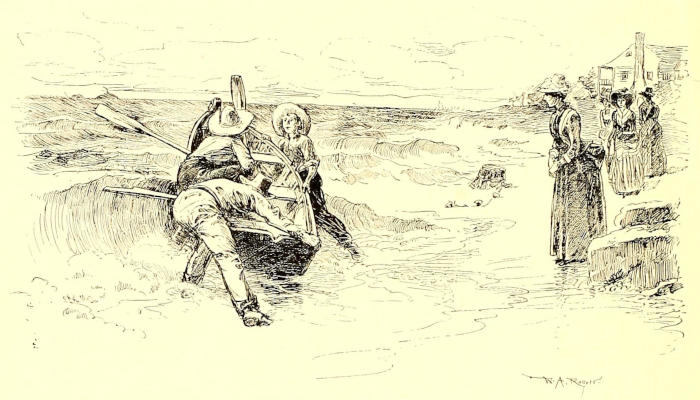
LAUNCHING THE BOAT IN THE SURF.
The twins returned to their own ox-cart; and soon Perce came running with a pair of oars.
“Here are oars,” he said. “But there are no men at the house. They went off in the yacht Susette yesterday, and haven’t been heard from. And Olly hasn’t got back, though Mrs. Murcher says he ought to have come an hour ago.”
“May be it’s the yacht that’s been wrecked,” suggested the twins.
“She’s afraid it is; and the ladies are all excited about it. I tried to get a spy-glass to look through; one of the men owns one, they said, but he must have taken it with him.”
The boys turned the oxen about, and left them eating the hay that had served for a bed the night before. Then they dragged the dory down from beside the bathing-houses, and got it ready to launch. Perce took the precaution to put on board some provisions, and selected from the piles of driftwood a strip of board that would do to steer with.
Then the boat was shoved into the surf. The twins scrambled aboard and took the oars, ready to pull the moment Perce gave the word.
“Now!” he cried; and, pushing the dory over the next wave, at the same time he leaped into the stern.
The oars dipped and bent; he assisted with his strip of board; and the skiff reared and pitched on the breakers, cheered by the ladies from the boarding-house, who had hastened down to the beach to see them off.
The twins, having embarked in the adventure, were now almost as enthusiastic as Perce himself. The wind was light, the morning sun sparkled on the waves, and the dory went dashing over them as if rowed for a race.
The tide had not yet fallen much, and the ocean swells broke in a field of white foam completely over the “Calf’s” back, while the tail wagged up and down. But the “Old Cow” was clear above the line of surf about her flanks; and there, on the highest hummock, stood the castaway, now more distinctly discernible as the distance between him and his rescuers diminished.
The boys made many conjectures as to who he could be and what had become of the wreck, no vestige of which could be seen.
“He has on a white yachting-cap!” exclaimed Perce; and that confirmed them in the opinion that the Susette had gone to pieces on the[781] ledge. The castaway had ceased to wave the object which had first attracted Perce’s attention, but every now and then he threw up both arms, as he stood facing them on the solitary rock, and made encouraging signals.
The “Cow” and the “Calf” are much farther from the coast than they look to be in clear weather. Perce took his turn at the oars, and all worked heroically; yet it seemed a long while before they came within hail of the Crusoe of that small rocky island.
Let us take advantage of this lapse of time to go back a little and see what had become of Olly Burdeen.
The salt water and the barnacles told but too true a tale: he had been thrown upon the lesser rock, which the next tide would submerge.
If he had still any doubt of that terrible fact, it must have been dispelled when the moon rose amid broken clouds and showed him the “Calf’s tail” churning the waves at the end of his surf-fringed reef; also the glimmering back of the “Old Cow,” with its encircling surge, a furlong or more to the south.
An old, sad moon it was, with a distorted, melancholy face peering above the illimitable desolation of waters; yet a welcome sight to the drenched and shivering castaway, waiting on his lonely ledge for the tide to return and cover it. No wonder it appeared to him not the cheerful orb he knew, but some ancient, decayed satellite coming to look for the last time on a lost world!
After his long labor with his rude paddle, and the effort it had cost to swim to the rock and scramble out upon it, he was nearly exhausted; and the discovery of barnacles in the pool had quenched what remained of his courage. There was no shelter from the wind; and in his wet clothes he felt a deadly chill striking to his bones.
Then followed another discovery, which did not tend to restore his spirits.
He had from the first given up the boat as lost. It had disappeared in the dark and turbulent water almost as soon as he left it; nor could he see anything of it afterward.
It was an old dory that had been hired for the season by one of Mrs. Murcher’s boarders. Olly had taken that, too, without leave; but it was the custom on the coast for people to make rather free use of any boats that came in their way. With it had gone his sole means of escape from certain death; otherwise he would have cared little for the loss.
In his fearful anxiety about his own safety, he had thought little even of the safety of the watch. He hated the recollection of it; for, probably, if it had not been for that, it might never have occurred to him to row out from shore in order to get a sight of the returning yacht, around the point.
After the moon rose, he looked across the tumbling billows at the “Old Cow” wallowing in their froth, and felt that his salvation lay in reaching that before the rising tide should sweep him from the “Calf.” Yet, how was that possible? The very thought of swimming so far, alone in the night, in the wild ocean, was frightful to him. Yet as a last resort he might be driven to make so desperate an attempt.
As for the water, it could hardly seem colder than the wind that pierced his drenched clothes. He no longer thought of any injury to them—the stylish suit that had been a delight to his soul a few hours before! He wept with despair as he thought of the joy that had turned to such bitter woe; and he wished he had never seen the giver or his gift.
Salt water might ruin the watch; but, if so, that was probably ruined already. At all events, it was past being returned to its case in Mr. Hatville’s room, without that gentleman’s knowledge of its having been removed.
Past, indeed! Thinking of it, Olly put up his hand to his pocket. It gave him a start of fresh terror, even in his utter misery and wretchedness, to find it empty.
The watch was gone! That was his last disheartening discovery.
How long it had been gone he had not the slightest means of knowing. His teeth chattered, and he trembled from head to foot, as he hurriedly searched his clothing for the timepiece, but in vain.
He at first believed that he had lost it in his struggle between the boat and the ledge; for he remembered having looked down and seen the golden glitter of the seal, not long after he went adrift. But now the moonlight disclosed the seal still hanging by the hook in his button-hole. The guard had been broken, and everything, excepting the seal and a few dangling links, had gone with the watch.
He concluded that he must have lost it when he had his first tumble in the boat. The oar, when it struck his breast, and flew from his hand, had doubtless caught in the chain, and snatched the watch from his pocket. Of course he couldn’t know that this was so; but if he had foreseen what Perce Bucklin was to find on the beach a few hours later, he would have argued that no watch could have been conveyed so far, in so short a time, by waves or tide.
However it might have happened, it was hopelessly[782] gone; and now, in his enfeebled, frightened state, he began to consider how he should escape the suspicion of having stolen it, if ever his body reached the shore alive or dead.
“Nobody knows I had it,” he said miserably to himself. “And why should anybody ever know?”
He unhooked what was left of the guard, and held it, with the seal, for a moment in his shaking fingers, considering whether he should destroy that evidence against him by flinging it into the sea.
But he could hardly make up his mind to cast away irrevocably what might prove of value, should the watch and the rest of the guard be found. That might still be possible, he reasoned; and, after a few minutes of sickening doubt and hesitation, he put the shining trinkets into his pocket. Even as he did so, he went about mechanically searching for what he had hardly the faintest expectation of finding. Who that has ever lost a prized object has not done the same?—looking again and again in places where a superstitious hope whispers that it may be mysteriously lurking.
He felt sure that it could not, without his knowledge, have dropped from his pocket when he had stooped over the pool to grope for barnacles; and even if it had, the moonlight must show so bright an object shining in the shallow bottom. Yet he explored it carefully with his hands, and went back and explored it again, after examining other parts of the ledge.
But why be so anxious about the watch, when he was in despair of saving his own life? He said that to himself, as he searched every crevice and hollow of the slope where he had crawled out of the sea.
It was fortunate that he had something thus to engage his wretched thoughts and benumbed hands. And a still better employment awaited him.
He had some time before he heard a strange thumping and grinding sound, which he supposed must be caused by the motion of the “Calf’s tail.”
The hunt for the watch had kept him from investigating it. But now that very search led him to make a different, but even more welcome discovery.
The side where he had landed was in shadow. As he followed it around, just out of reach of the waves, he saw to his great joy something rising and falling in the black seaweed that grew below the gray girdle of barnacles, and bumping on the reef. It was his boat, which the wind had blown against the little island, and lodged not far from the “Calf’s tail.”
It was lying on its side, and a heave of the sea threw up the dark gunwale into the moonlight that slanted across the surf-vexed end of the island. As the wave drew back, sucking heavily along with it the somber fringe of rockweed, Olly stepped cautiously down on this slippery footing, and, seizing the rail of the dory, held it fast. Then with the next swell he lifted the end upon the barnacled rocks and held it again, while its heavy freight of water spilled out over the side into the sea.
Getting hold of the painter, he now had the boat safe, and, by a little management, he was able to haul it higher up the slope and tip the rest of the water out. The exertion warmed him, and success gave him new courage.
True, he had no oars, and the thwart he had used for a paddle was lost. But there was a second thwart which he could detach. The dory appeared little the worse for the rough usage it had received, and he did not doubt but it would prove seaworthy when it should become necessary for him to intrust his life to it, in escaping from the rock.
That might be some time yet, for it was now low water. With the turning of the tide, the wind might change or go down; and it would probably be near daylight before the “Calf” would be submerged.
“The trouble will be,” he reflected, “to get the dory upon that highest part.”
That was something more for him to do. He worked it along inch by inch, pulling seaweed from the rocks to put under it in order to make it slide easily over the barnacles.
But this device came near causing him a sad accident. Once, when he released his hold of the boat to take breath after violently lifting, it broke away from him and started back down the descent, which the seaweed he had placed there made slippery. He sprang to seize the painter, which was dragging on the rocks, but it pulled him after, and boy and boat barely escaped plunging together into the brine.
As it was, though, he arrested its progress just as it struck a billow. He was compelled once more to tip it over—for he had no other means of getting the water out—and then to perform over again the labor of lifting it up the ledge.
But this was, perhaps, a fortunate accident, since it kept him in exercise until he felt that his clothes were getting dry. And it showed him, besides, the danger that would attend the final launching of the dory.
(To be continued.)
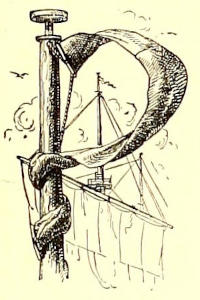
Perhaps you have never heard of a yacht-race ashore, yet that term might almost be applied to this picturesque game, which will be found not only exciting, but a source of great fun. It can be played out-of-doors on the lawn or in a large room.
Two players are required for each “yacht”—the “captain,” who directs the course of the vessel, and the “crew,” who carries the boat in his cap or “helmet,” and obeys the orders of the captain.
To play the game, it is first necessary to lay out the “course” on the lawn or the floor, which represents the sheet of water that is to be the scene of the regatta. Any convenient objects can be taken for the “stake-boats” and “turning-buoy,” and the course can be made as difficult as desired by placing obstacles, such as chairs, boxes, or cushions, in the way, to represent “rocks,” “reefs,” “shoals,” and “islands.” The crews that are to compete are first allowed to sail over the course to inspect it, and are then drawn up in line at the start, where each puts on his “yacht-rig,” and is carefully blindfolded by the captain of a rival yacht. At the “first gun,” or signal to make ready, each crew turns around three times. At the “second gun,” or signal to start, they all proceed, under command of their respective captains, to go over the course, keeping always in “deep water” and avoiding the reefs and other obstacles, around the turning-buoy, and back to the starting-point. The yacht which is the first to come in wins the race.
A captain must always address his crew by the name of his yacht, and must give his orders in nautical terms. If he fail to do so, his yacht must stop, and turn once around before going on. The same penalty is exacted if the crew does not understand an order and asks for an explanation; and also whenever, through the unskillful management of the captain or the poor sailing of the crew, the yacht runs into any of the obstacles or into one of the other yachts.
Of course, unless the players know how to sail real boats, the orders will often be very ridiculous; but as long as they are given in nautical language, and the crew understands what they mean, it makes no difference, except to add to the fun.
For instance, let us imagine the Genesta to be racing the Puritan. The orders might sound something like this:
“Steady, Genesta, steady!” from the captain of the English cutter.
“Keep her off about two points to starboard, Puritan—steady!” from the American skipper.
But such a command as “Hard a-port, Genesta—no, no, the other way, you goose!” would compel the captain of that craft to stop his yacht and make it turn once around; while, if on receiving the order, “Shake out a reef, Puritan, and head her nor’-nor’east!” the crew should ask, “Oh, I say, Billy, what do you mean by ‘shake out a reef’?” or “‘Which direction is nor’-nor’east’?” then the Puritan would have to stop and turn around. And if the captain of the Genesta, wishing to take advantage of his rival’s set-back, should exclaim, “Now, Sam, let her go!” the English boat would have to pay the same penalty.
Many modifications of this game will naturally suggest themselves to those who understand sailing. The sport can be made much more difficult and interesting by supposing the wind to blow directly up the course, so that the yachts will have to beat down to the turning-buoy and then come home before the wind. When the game is played out-of-doors and there is a breeze blowing, a great deal of skill and ingenuity can be exercised in keeping the yachts in the courses they would have to take if they were actually propelled by the wind.
The nattiest yacht-rig is made of a square piece of cardboard that will go just around the head of the crew. The two edges are then stitched together to form a “helmet,” like a high hat without crown or brim. Two notches should be cut in the top of the helmet, as shown in Fig. 1, to receive the hull of a small toy yacht, such as can be bought cheaply at any toy shop. The yacht is held in place by lashings passing through holes made in the helmet. Strings should be fastened to the sides of the helmet to tie under the chin, and a curtain of some thick, close material may be sewed on in front, as a blindfold. The cardboard should be colored blue to represent waves; but the curtain, flags, and strings should be of some distinctive tint, so that each vessel can sail under its own colors.
A simpler form of yacht-rig (Fig. 2) consists of a roll of cloth about twenty inches long, the ends of which are sewed together, forming a ring-shaped pad to rest upon the head. The yacht, a home-made affair, cut out of a shingle or a piece of board, is fastened upon the pad. This helmet also has the blindfold, and strings to tie under the chin. A third style of helmet (Fig. 3) was once formed by scooping out the end of a watermelon to fit the crew’s head, and rigging it up with a twig mast and a brown-paper sail. It was cheap, ingenious, and uncomfortable, and is not recommended. There is a fourth and entirely different rig, which consists in fastening the sails directly to the crew’s body. (See Fig. 4.) The spars—boom, sprit, and bowsprit—are of wood, shaped as in A, and are fastened to the body by strings run through holes in the broad ends. The sails should be attached to the spars as in real boats. A small flagstaff in the front of the cap bears the pennant, and completes the rig.

For the benefit of those who are not familiar with sea terms, a few of the more common directions used in this game of Regatta are here given with their explanations:
“Port” means the left side of the yacht. “Starboard” means the right side. To “luff” means to bring the yacht so that it will point more toward the direction from which the wind is blowing. To “luff a-lee” is to point the yacht directly at the wind, in the “wind’s eye.” To “tack” is to change the course of the yacht so that it receives the wind on the other side. The maneuver is accomplished by “luffing a-lee,” and keeping on until the yacht presents its other side to the wind. To “fall off” is the opposite of to “luff.” Experienced yachtsmen will know and use many other terms, but these are sufficient for conducting a game. Stories and books about the sea will suggest other useful words, and any one who plays the game often will soon gain an ample vocabulary.
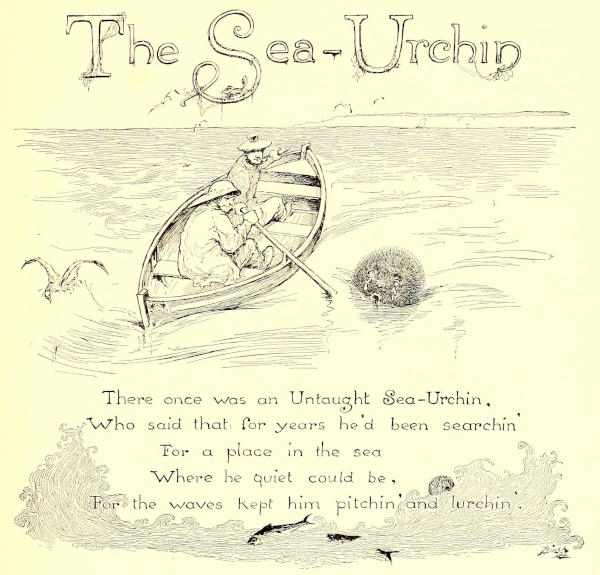
By Bessie Chandler.
There are many things you boys can do with a rope, if you only know how. Let an old sailor spin you a “yarn” or two.
If you wish to put up a swing, to make a lasso, to fasten a rope to your sled, or if you live on a farm and desire to make a halter or a hay-rope, you should know how to make an “eye-splice.”
The tools you will need are a hammer and a marline-spike. A sailor’s marline-spike is made of iron, and is about six inches long, like that in Fig. 1; but you can easily whittle from a bit of any hard wood a peg that will answer the purpose of a marline-spike.
To begin the splice, take a small rope, like a clothes-line (if possible, a new one in which the strands are unworn), and first untwist, or, as we sailors say, unlay, about four inches of it. Then wind thread tightly around the end of each strand to keep it in shape. Next bend the rope around into a loop of any size desired, letting the loose strands or cords cross on the upper side and project beyond the rope. Be sure that, as you hold the loop toward you, the rope bends toward the right.
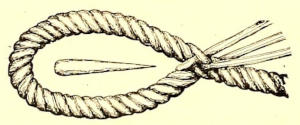
FIG. 1.—MARLINE-SPIKE AND EYE-SPLICE.
At the point of crossing, twist the solid or “standing” part of the rope the wrong way, so as to open it a little, and thrust the spike in between the strands, pushing it in until the strands are well apart. Now draw the spike out and put the end of the first loose strand into the enlarged opening. To do this easily you should insert the spike with its point toward the loose ends, so that, as you draw it out, you can follow it closely with the first end before the separated strands close. Draw the end up tight, as shown in the cut. Then take the spike and separate the next strand in the rope from the others, and insert the second loose end in the same way, and similarly place the third end under the third strand of the rope. At this stage, your splice will look like Fig. 1, and a little study of that diagram will show you, better than I can tell you, just how to insert the strands.
Continue the work, by passing the first end over one strand and under the next, and do the same with the second and third ends.
When each end has been woven in twice, take off the thread from the ends and cut about a third from the under side of each one, making it that much thinner than before. Bind the ends again with the thread, and weave each one under another strand of the rope. Again take off the thread and cut off half of what remains from the under side of each of the loose ends; replace the thread, weave under again, draw each end up tightly, and cut it off close to the rope. If you have carefully followed the directions, each end will pass over and under the strands alternately, and no two ends next each other will pass under the same strand.
You must always remember, in working with a rope, to twist every strand hard and tight, and to draw it snugly to place. And in making a splice, the rope should be pounded frequently with the hammer or a piece of wood, and rolled back and forth under your foot. This operation makes the strands sink into one another and look smooth and even.
Another splice, quite as useful as the one just described, is that by which the ends of two ropes are joined so firmly that they form one continuous rope. There are two forms of it, one called the “short splice,” and the other the “long splice.”
The short splice, is more often used, because it is quickly made, it does not waste much of the rope, and it is nearly as strong as the long splice. There is one objection to it: It makes part of the rope somewhat larger than the rest, so that it can not be run through a narrow pulley-block. The long splice, on the other hand, though using much more material, may be made without increasing the size of the rope at any point, and is, in fact, somewhat stronger.
To make the short splice, first untwist about eight inches of each of the two ends you wish to join, and bring them together in such a way that the ends of the untwisted parts are squarely and closely against each other as though they were one rope,[787] while the six loose strands stand out all around, each one of the right-hand strands being between two of those on the left hand, or interlocked.
Now what you are to do is to weave the loosened strands of the right-hand rope into the untwisted rope of the left side, and the loosened strands of that rope into the solid part of the right-hand rope. To hold the two ends in place while you work, begin by drawing all three of the left-hand strands down over the right-hand rope, and tie them there with a piece of cord.
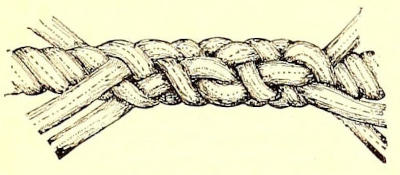
FIG. 2.—A SHORT SPLICE.
Now weave the three loose strands into the solid rope by the help of the spike, just as you did in making the eye-splice. When you have finished this side, untie the twine and weave the loose strands into the left-hand rope in the same manner. The directions given for making the eye-splice apply also to this splice. It must be well pounded and twisted back and forth until the ends work into the strands and it is smooth and firm; and this splice, too, will look better if part of the rope-yarns are cut off before weaving in the last time, but if you are not particular you may cut the ends off just as they are left in Fig. 2. To help you to see how the ends go under and over the strands of the rope, each one is marked in Fig. 2 with a different line of dots and dashes, and, by following any one line, you will learn exactly where that one strand passes in and out.

FIG. 3.—A LONG SPLICE, FIRST STAGE.
The long splice, though a little more trouble than the short splice, makes a much neater joining. For this splice, you must untwist three feet of one end of each rope and bring the two closely together as in making a short splice, with the loose ends interlocked. Next take one of the strands of the right-hand side and untwist it, or separate it from the rope an inch or two, and into the space it leaves vacant “lay” one of the loose ends from the other side. (By “laying” I mean twisting the strand tightly and pressing it into place.) Go on in this way, untwisting the strand from one side and laying in its place the strand from the other side, until the latter has only about eight inches free, while the one you have been untwisting has nearly six feet free. What you have now done is merely replacing a strand belonging to one rope by a strand from the other. Do the same thing on the other side; that is, untwist one of the strands of the left-hand rope and twist into its place a loose strand from the right-hand rope. When you have done this, your splice will look like Fig. 3, the six untwisted strands ending in pairs in three places. The pair in the middle will be three feet long each; while at the ends there will be one long and one short strand, although, as seen in Fig. 3, they all must be cut off short for the next operation.

FIG. 4.—A LONG SPLICE FINISHED.
This consists in weaving the ends in, and it is done by forcing the spike under the strand next to the end you wish to weave in, passing the end through the opening, then over the next strand, and under the third, which you have opened in the same way. Now cut off a portion from the under side of the strand, pass it over and under once more, and cut off closely. Repeat this with the second strand of the pair, and your joining will look like Fig. 4, which represents a long splice finished. This figure, of course, shows only one woven-in end, the other being on the opposite side.
Having thus disposed of one pair of the loose ends, treat the other two pairs in the same way. Notice that the strands are nowhere turned back on themselves, but that they always work on in the same way they started; that is, those which turned out from the middle turn out to the end, while those that turned toward the middle (or those you untwisted to make place for the others) still turn toward the center, as they began.
The first thing a boy learns when he goes to sea is to make braid, or, in sailors’ talk, “sennit,” and I think land boys will find it very convenient to know a few of the different kinds in use. All boys wish to make whip-lashes or to swing hammocks; and for those of you who own sail-boats, or even row-boats, there are endless uses for these braids. Fenders to protect the sides of boats from injury are best made from a short, thick piece of sennit; and many boats have a guard, made of about seven large strands, like Fig. 5, running all around just under the gunwale.
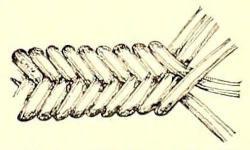
FIG 5.—THE SIMPLEST KIND OF SENNIT.
On a ship these braids are used to wrap around[788] parts of the rigging, to keep them from chafing, so they are called “chafing-gear.” And the sailors make it by the barrelful, so that it will be on hand when needed.
In beginning a braid, tie a string around one end of the strands and fasten it to any convenient object, such as a hook in the wall or a door-knob, in order to keep the braid taut, as it is very important to draw the strands up snug and even every time. The simplest kind of sennit may be made of any uneven number of strands. It is shown in Fig. 5.
To begin, take five strands and separate them, holding three in the right hand and two in the left. First take the outside strand of the three in the right hand, pass it over the two next it, and lay it inside the two in the left hand. Now you have three in the left hand. Then take the outside strand of the three in the left hand, pass it over the two next it, and lay it inside of the two in the right hand. So you go on, always taking the outside strand from the side which has three together, passing it over its two neighbors, and laying it inside the two in the other hand. It is very easy, you see, and you will soon have a piece like that in the figure, in which the outside strand from the left side has just been laid over inside of the right. You can make this kind of braid of any uneven number of strands, and the only rule is always to bring the one from the outside of the greater number over all its neighbors to the inside of the smaller number.
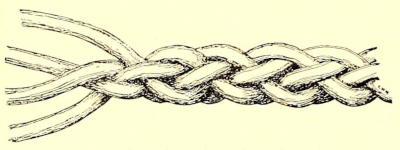
FIG. 6.—A ROUND SENNIT.
To make a whip-lash, you should try a braid like that shown in Fig. 6, which is a round sennit. The one in the drawing is made of large round strands to show the braid better; but for a lash you should take flat strips of leather, and taper them to make your lash the proper shape.
This braid is made of four strands. Take two in each hand, pass the outside strand in the right hand under its neighbor and also under the inside strand in the left hand. Bring it up between the two in the left, and lay it over the inside strand next to it, placing it at last beside the one strand in the right hand, only inside of it instead of outside, where it was first. Do the same with the outside strand of the left hand; that is, pass it under the one next to it and the inside one of the right hand, bringing it up between the two in the right, turning it over the inside one, and laying it next to the one remaining in the left hand, on the inside. Keep on doing this and you will notice that the same two strands always stay in the same hand, but each turn of one interlocks it through the two in the other hand.
In Fig. 6 the outside strand on the right side has just been passed under and up between the two on the left side, over the inside one of the left and beside the strand on the right.
This method of braiding is pretty to use in covering many things, round, square, or tapering. Even a turned vase and many articles of varying shape may be covered by it. Where the object is wide the strands cross each other at a wide angle, and where narrow, run more nearly parallel to the object, but in every case it is covered. Some very pretty things are made with this braid.
For a flat braid, which, when made of rope-yarns or cord, is very nice for a dog or goat harness, you will need the “French” sennit shown in Fig. 7. At sea, it is sometimes made eight or ten inches wide, and half an inch thick; but you will not need it so heavy. To begin, take nine strands as in the figure, though it may be made of any other number.
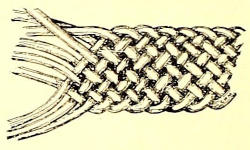
FIG. 7.—THE FRENCH SENNIT.
First spread the strands out flat, take the middle one (in this case, No. 5), bend it to the right and over No. 4, which is bent to the left. Take No. 6, bend it to the right, and under No. 4. Take No. 3, bend it to the left, over No. 5, and under No. 6. Take No. 7, bend it to the right, over No. 4, and under No. 3. Take No. 2, bend to the left, under No. 5, over No. 6, and under No. 7. Continue in this way until all the strands are in. Then take No. 5, which, you remember, was bent to the right, and now occupies the outside place on that side, bend it up and over No. 6, which is next it, and then braid it in alternately over and under just as before. Braid in the outside strand from the left side in the same manner. Go on in this way, and the braid will look like Fig. 7. So many directions make it seem hard; but when you try it with the figure before you, you will find it very easy. If the braid is made from an even number of strands, as in Fig. 8, the strands will begin on both sides by turning over; but if the number is uneven, as in Fig. 7, the strands on one side will begin by turning under.
Be careful to draw the strands even and snug. This braid has one great advantage over others. It may be split into two or more narrower braids, as you see in Fig. 8, and afterward braided together again, leaving an open loop, or a sort of button-hole. A glance at Fig. 8 will show you just how this is accomplished, and that it is an easy task.
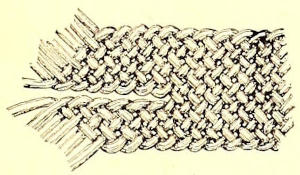
FIG. 8.
In a navy hammock, the cords which support the body are woven into a flat braid which starts with two or three strands and has the others gradually woven in, two at a time, one on each side. This finishes it off very neatly, and keeps the cords from tangling, and is a great improvement on simply putting the cords through the ring, which has a bungling appearance, as they are generally in a snarl. This braid may be more easily made by “putting the cart before the horse”; that is, by beginning at what is apparently the wrong end. Take the cords double length, and draw them all through the ring, until half the length is on each side. There will be twice as many strands as you had cords. Begin a flat braid, as in Fig. 8, until all the strands are woven in. If there are twelve, you then leave out the outside strand on each side and continue the braid with ten; leave out two again, and continue with the middle eight; and so on until you have but two left. Tie these firmly together, and the braid will not work loose.
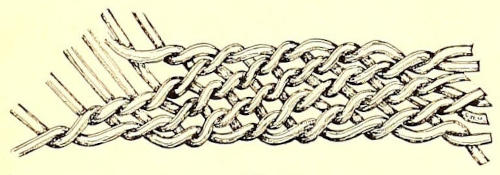
FIG. 9.
The queer-looking flat open-work braid shown in Fig. 9 is much used at sea, but it is hard to make of anything but tarred hemp rope-yarns, because it always inclines to loosen. The tarred rope does not slip like ordinary cord. In this braid, the strands do not cross the braid, but each one simply locks into its neighbor. To make it, you twist the first strand around the second, the second around the third, the third around the fourth, and so on across the braid. In the figure, the first has been twisted around the second, and the second is ready to twist around the third.
These braids can be easily learned by following the descriptions, and by referring to the cuts. Girls may use them in many ways; that shown in Fig. 5 is pretty for the hair. But I need not point out the various uses to which they may be put, for I am sure you all will discover them for yourselves.
This object bears no relation to the famous Jabberwock; in fact, it is simply a knot in common use among sailors; and the mysterious-sounding name is merely a very bad way of pronouncing “Matthew Walker.” Matthew Walker was an inventor, and, though his name has become gibberish, his knot is as good as ever, and is a very useful one. Whenever a rope is put through a hole and held by a knot, there is the place for a maderwocker, one that is not clumsy, will hold fast, and never loosen. The boys can use it on sled-ropes, swings, rope handles to boxes, and in many other places.

FIG 10.—A SINGLE MADERWOCKER.
To make it you must first untwist, or unlay, about six inches of one end of the rope, and tie a string firmly around it where the knot is to be. Now, hold the rope in your left hand with the untwisted ends standing up, take one strand and bend it downward and around the second. Do not draw it tight, but leave a loop. Next bend the second strand around the third, and the third around the first, bringing the third one up through the loop left in the first. Draw all the ends tight and snug, and the knot will look like Fig. 10, which is a “single maderwocker,” or “single wall.”
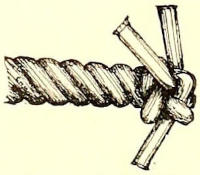
FIG. 11.—A CROWN.
If this knot is not enough you may put a “crown” on it. Bend down the first end and leave a loop; bend the second over the first, the third over the second, and put the end through the loop left in the first. Draw all the ends down snug and cut them off, and you will have a neat and strong knot like Fig. 11. Perhaps you will understand this crown better by looking at the end of the braid, Fig. 13.
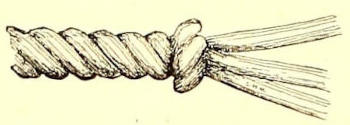
FIG. 12.—A DOUBLE MADERWOCKER.
A “double maderwocker,” or “double wall,” is a variety of this knot, made in the same way, excepting that each strand passes around two others, instead of one, as in the single maderwocker. Thus, the first strand is bent down and around the second and third, the second around the third and first, and up through the loop of[790] the first; the third around the first and second, and up through the loop of the second, which also has been left a little loose. Draw all snug and you have a larger knot than the single one. (See Fig. 12.) You can finish it either by putting a “crown” on it, as described before, or by binding the strands close to the knot and cutting off the ends.
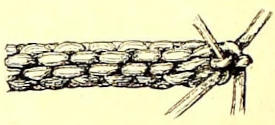
FIG. 13
A series of crowns makes a very pretty and useful round braid like Fig. 13. The one represented has but four strands, though you will notice that it looks as if it had eight. Any number of strands may be used for this, and it will always appear to have double the number it really has. To make it look even and smooth, you must always bend the strands down in the same way; that is, always bend them to the right or always to the left. Girls will find this pretty cord convenient for many things; made of fine silk braid, it is nice to hang a fan from the belt, or for other purposes. Made of heavier materials, boys, I am sure, will find use for it.
By Wallace E. Mather.
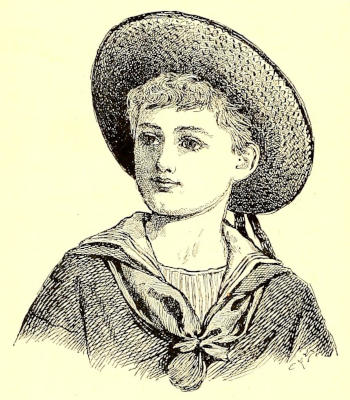
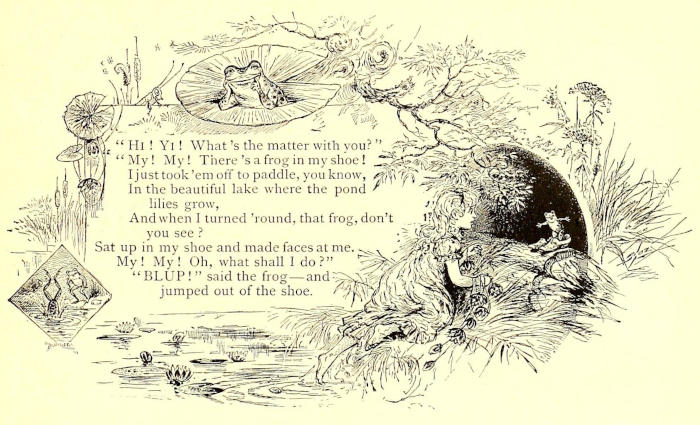
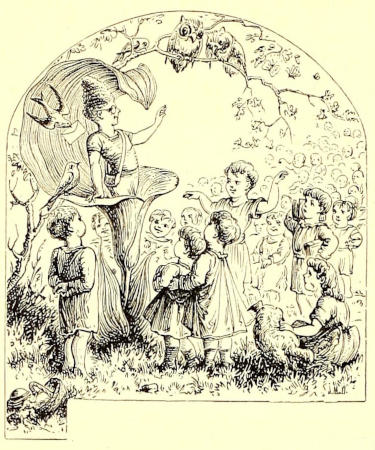
Try not to mind it, dearly beloveds. It is merely “the sensation caused by caloric, or the principle of heat, in excess; the bodily feeling experienced on exposure to the sun’s rays; the reverse of cold.” What is there to grumble about in so simple a thing as that? And yet that is all that makes these sunny days uncomfortable. Just fan yourselves with that fact, my dears. I’m assured you have the highest authority for it—a big, wise book named Webster.
And now that your thoughts are cooled and refreshed, you’re ready for this communication which the Little School-ma’am wishes to lay before you.
My Dear Little School-ma’am: My mamma has found in a new book (the “Life of Henry W. Longfellow,” edited by his brother Samuel), a copy of the very first letter ever written by the poet. We reckoned his age, and found that he was six years and eleven months old when he wrote it. It interested my brother Kit and me so much that Mother said we could copy it for you to show the St. Nicholas boys and girls. I think it was very nice in him to put his sister Ann in first, and Kit says I ought to explain that a billet was sometimes good to get.
This is the letter:
“Portland, 1814.
“Dear Papa,—Ann wants a little Bible like little Betsey’s. Will you please buy her one, if you can find any in Boston. I have been to school all the week, and got only seven marks. I shall have a billet on Monday. I wish you to buy me a drum.
“Henry W. Longfellow.”
As some one may wish you to tell whether Henry got the drum or not, I think I’ll copy next a part of the father’s answer to the letter. He was in Boston at the time, and he wrote:
... “I have found a very pretty drum, with an eagle painted on it, but the man asks two dollars for it; and they do not let any vessels go from Boston to Portland now. But if I can find any opportunity to send it down, I shall buy it. And if I cannot, I shall buy something else which will please you as well. I am glad to hear that you have been a good boy at school, and are likely to get a billet. You must save all your billets till I get home.” ...
P. S.—What do you think my father says? He says Henry’s letter was pretty hard on Boston.
Your little friend and admirer,
Dorothy G——.
Dear Jack: I once had some tame fish in a lake at the foot of my garden,—or, rather, some fish that came every afternoon about five o’clock to be fed. My children were in the habit of taking bread daily and throwing it into the lake for them to eat. The fish became so tame that they would eat out of our hands, and when a foot-fall was heard coming down the terrace that leads into the small flower-garden by the lakeside, the fish would rush through the water by hundreds, expecting their food. They were of many kinds,—from the large catfish, or bullpout, weighing three or four pounds, to the small minnow.
Once, while I was feeding them from my hand, a water-snake suddenly caught one of the fish by the head, and, as a snake always must do after catching his prey under water, he held the fish up out of the water for a moment while he took breath. I instantly caught the fish, and attempted to pull it out of the snake’s mouth, but the snake as quickly twisted his tail around a root under the water and resisted my attempt to deprive him of his expected dinner. With all the strength I could exert, I could neither pull the fish out of the snake’s mouth nor tear loose his hold upon the root.
While I continued to pull, I very soon found that the snake was beginning to swallow the fish, and was visibly sucking it in. Notwithstanding all my efforts to wrench it from his grasp, the fish gradually disappeared into the snake’s mouth until I felt my thumb and finger touch against the jaws of the reptile, and even then they were irresistibly pushed back until my grasp was only upon the tip end of the fish’s tail. Then the snake, with a sudden jerk, pulled it quite out of my hand and swam away. I was defeated, and the snake had gained the victory.
Yours truly,
H. E. S.
It never rains but it pours! as I’ve often heard the Deacon say. We have lately been discussing the habits of some animal weather-prophets, but we have considered them one at a time. Now, lo and behold!—my young friend Ida G. Egerton sends me this letter and a newspaper extract, which describes a long list of such weather-prophets.
Boonville, N. Y.
Dear Jack: Seeing your readers are interested in living barometers, I thought I would send you this paper. From
Ida G. Egerton.
“I do not know of any surer way of predicting the changes in the weather, says a correspondent, than by observing the habits of the snail. They do not drink, but they imbibe moisture during a rain, and exude it afterward. The snail is never seen abroad except before a rain, when you will see it climbing the bark of trees and getting on the leaves. The tree-snail, as it is called, two days before rain, will climb up the stems of plants, and if the rain is going to be a hard and long one, it gets on the sheltered side of a leaf, but if a short rain, on the outside. Then there are other species that before a rain are yellow in color, and after rain blue.
“Take the ants, too; have you ever noticed the activity they display before a storm—hurry, scurry, rushing hither and yon, as if they were letter-carriers making six trips a day, or expressmen behind time? Dogs grow sleepy and dull, and like to lie before a fire, as rain approaches; chickens pick up pebbles, fowls roll in the dust, flies sting and bite more viciously, frogs croak more clamorously, gnats assemble under trees, and horses display restlessness.
“When you see a swan flying before the wind, spiders crowding on a wall, toads coming out of their holes in unusual numbers in the evening, worms, slugs, and snails appearing, robin-redbreasts pecking at the windows, pigeons coming to the dovecotes earlier than usual, peacocks squalling at night, mice squeaking, or geese washing, you can put them down as rain-signs. Nearly all the animals have some way of telling the weather in advance. It may be that the altered condition of the atmosphere with regard to electricity, which generally accompanies changes of the weather, makes them feel disagreeable or pleasant. The fact that a cat licks herself before a storm is urged by some naturalists as proof of the special influences of electricity. Man is not so sensitive. Yet many persons feel listless before a storm, to say nothing of aggravated headaches, toothaches, and rheumatic pains.”
It appears, from this, that even boys and girls may sometimes be classed among the animal weather-prophets. But, as they seem to have a rather painful way of indicating storms, I hope none of you excel in prophesying.
Warwarsing, N. Y.
Dear Jack: We were lately much interested in watching a family of Baltimore orioles that lived in a nest in a tree near our house. There were several young birds in the nest, that kept their father and mother busy all day long feeding them. The nest was rather small for its inmates, and some time ago a little bird fell out. Though the nest is about fifteen feet above the ground, it did not hurt itself. We saw it fall, and put it on a small tree near by, where its mother could see it. Afterward I climbed a ladder and put it in the nest. Then the mother bird arrived and hunted all over the small tree, trying to find it and give it something to eat, and seemed very anxious about it. It was a very pretty sight to watch her.
This oriole’s nest has been in the tree for some years. It hangs from one of the highest limbs, to which it is fastened by strong cords made from the material of which the nest is built. We are glad to have orioles about, for they feed the young birds with insects injurious to the garden and orchard. Insects seem to be their principal food; and I have seen them eat hornet’s eggs.
The name “oriole” is from the old French “oriol,” which is derived from the Latin “aureolus,” meaning golden. They are sometimes called “golden robins.” The orchard oriole, which we occasionally see, is of a pure yellow color, with stripes of black on its back, and is about the size of a canary-bird. The colors of the Baltimore oriole are orange and black. They are so called because orange and black were the colors of the coat of arms of Lord Baltimore, who was Governor of Maryland under King Charles I.
Respectfully,
Norman T. Saunders.
Wisdom does not depend on size, as you all know, my dears. The ant and the bee, in fact, often seem to know more than some of the largest animals. The humming-bird, too, though the smallest of birds, is not lacking in intelligence. A friend of the Deacon tells a pleasant little story of one that was trying to secure the honey from a flower with a deep cup, and at the same time was plainly very tired. The flower grew near a porch where a family was sitting, and seeing the trouble of the bird, a young girl walked slowly toward him, holding out her finger. The tired bird looked sharply at her and then accepted the offered perch, alighted on the finger, and, when it was held close to the flower, returned to his work of honey-gathering. The girl stood quietly, and he used her finger as a resting-place till he had finished his meal, when he flew away home. A wise humming-bird that, say I,—and a wise girl, too.
You were lately told in St. Nicholas, I hear, about a curious lace-leaf that grows in a far-off corner of the world called Madagascar. Well, the Little School-ma’am asks me to show you now this picture of another queer plant, which, she says, is a near neighbor to the lace-leaf, for it is found in the marshes along the coast of Madagascar, and it is known as the pitcher plant.
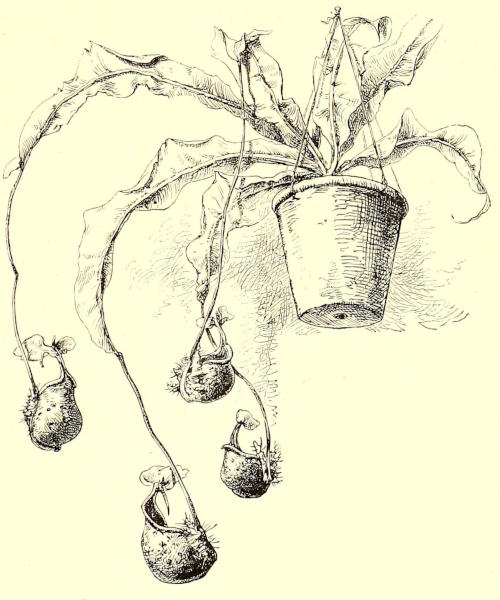
At the end of each leaf, which narrows to a mere stalk at the tip, it carries a little vegetable vase very like a pitcher with lid and all complete. And this curious cup is indeed a pitcher, given to the plant for the express purpose of keeping its leaves well supplied with moisture; for travelers report that they have frequently found quite a quantity of water in those queer little natural cups. Besides, they have big ears, so of course they’re little pitchers.
The Deacon says that, according to all accounts, Madagascar must be a sort of palace of the vegetable kingdom.
Since Mr. Hayward went out of business, Mr. N. M. Shepard, 85 Nassau street, N. Y., has consented to succeed him as our badge-manufacturer.
He is quite enthusiastic in the matter, and has designed some very pretty badges, which seem to us a decided improvement upon the styles shown in the hand-book. The scarf-pin and lace-pin are most attractive, because least noticeable,—which is a paradox.
For further information communicate with Mr. Shepard, whose address is given above.
It is a pleasant thought that even those men whose personal experience of sorrow has led them to take dark views of life in general can find in our Association something worthy their commendation—something to be built up, rather than destroyed. Would that we could extend our brotherly influence as widely as Prince Krapotkine suggests in the following extract from his article, “What Geography Ought To Be,” published in “The Nineteenth Century” for December, 1885:
“Another feature to be introduced in our schools ought to be mentioned here. I mean the exchange, between schools, of correspondence on geographical subjects and of their natural science collections. This feature, already introduced in several schools of the United States by the ‘Agassiz Association,’ can not be too warmly advocated. It is not enough to collect specimens of rocks, plants, and animals from its own limited regions. Each village school ought to have collections from everywhere; not only from all parts of its own country, but from Australia and Java, Siberia and the Argentine Republic. It can not purchase them, but it may have them—it can have them in exchange for its own collections, from schools scattered everywhere on the surface of the globe.
“Such is the great idea which presided at the creation of the ‘Agassiz Association’—an organization which has already seven thousand members and six hundred ‘Chapters,’ or sections.[5] The members of this Association are accustomed to study natural sciences in the field, amid nature itself; but they do not keep their treasures to themselves. They write to other branches of the Association; they exchange with them their observations, their ideas, their specimens of minerals, plants, and animals. They write about the scenery of Canada to friends in Texas. Their Swiss friends (for something similar exists also in Switzerland) send them the Edelweiss of the Alps, and their English friends instruct them in the geology of England. Shall I add that in proportion as the existence of the Association becomes known, specialists, professors, and amateur-naturalists hasten to offer their services to their young friends for lecturing before them, for determining their specimens, or for climbing with them on the hills in geological and botanical excursions?... Is it necessary to insist on the benefits of the ‘Agassiz Association,’ or to show how it ought to be extended? The greatness of the idea of establishing a lively connection between all schools of the Earth is too clear. Everybody knows that it is sufficient to have a friend in a foreign country—be it Moscow or Java—to begin to take some interest in that country. A newspaper paragraph entitled ‘Moscow’ or ‘Java’ will thereafter attract his attention,—the more so if he is in a lively intercourse with his friend, if both pursue the same work and communicate to one another the results of their studies and explorations. More than that: Let English children be in a continuous exchange of correspondence, collections, and thoughts with Russian children, and you may be sure that after some time neither English nor Russians will so readily grasp at guns for settling their misunderstandings. The ‘Agassiz Association’ has a brilliant future; similar ones will surely extend all over the world.”
[5] “Hand-book of the Agassiz Association,” by Harlan H. Ballard. Lenox, Mass., 1884.
455, Bedford, Pa. Each member has his own cabinet. Our time has not been wasted by any means. It will not be long before we recommence our collecting expeditions and picnics.—W. C. Langdon, Jr., Sec.
447, Chittenango, N.Y. We have a very good collection, including rare insects. We intend soon to visit the Indian mound near Manlius, where we hope to make various additions to our collection. We shall raise 1000 silk-worms for study this summer.—C. A. Jenkins, Sec.
490, New York (N). The year has been the most successful of our existence. We stand to-day strong in numbers, interest, and enthusiasm. We have held meetings steadily twice a month, and these have been enthusiastic and well attended. Our good friend, Professor J. D. Hyatt, has lectured for us, illustrating each lecture by blackboard diagrams and also by his powerful microscope. We have started a library, and a number of interesting and valuable books have been presented to us. We have issued a little paper called the “Naturalist’s Journal.” Our cabinet is assuming gigantic proportions, and embraces specimens in all lines of natural history, properly arranged and classified. We have a tabulated list of subjects and speakers for our meetings arranged for the next three months. These are nicely printed, together with names of officers, time of meeting, rules, and constitution, so that each member can have a copy for his own reference, and also to distribute to his friends. We have also made arrangements for excursions and field-meetings. We are encouraged and inspired by the past, and enter upon the future with bright anticipations for still greater success. May that success crown the efforts of all our Chapters!—Cephas B. Fox, Secretary.
527, San Francisco (G). One of our young men has made an excellent induction-coil and other apparatus which we find useful in experimenting. Our work, as members of the A. A., has been very satisfactory and instructive.—Henry Rhine, Secretary.
539, Philadelphia (P). We started in October, ’83, with ten members, and we now have thirty-two. We have held 100 regular and two special meetings. Six lectures have been delivered to the Chapter by as many lecturers. Our present plan of working is this: The Chapter is divided into three classes, zoölogy, botany, and mineralogy and geology. A member may join all the classes if he chooses, but must join at least one. Each class elects its own chairman. At four successive meetings, zoölogy is studied. The next four meetings are botanical. We conduct a journal, not printed, but written in a book, and read by the editor. Each member, in turn, is appointed to contribute an article to this journal. Our finances are in good condition, and in our next report I hope you will find an account of a permanent meeting-place (with an engraved charter, and picture of Professor Agassiz on the wall), containing a large library, a new cabinet, and a splendid microscope.—Louis L. Calvert, Sec.
549, Linlithgow, Scotland. The work of our Chapter has gone on very successfully. The members of the A. A. are also members of a local association, and the work of the latter is generally considered to be also that for the former. All the members have to acknowledge with pleasure the numerous offers to exchange made to them by American friends, advantage of which has been greatly taken. The Secretary has greatly enriched his herbarium by the additions to it of American plants. The out-of-door work—always the most pleasant—proved all last year to be most pleasurable and profitable, and it may be interesting to other members to know that all the members here are ’cyclists and find their wheels of the greatest service.
The subjects taken up have been botany, geology, entomology, ornithology, conchology, oölogy, and to a certain extent also zoölogy. Meetings have been held and papers read, and many excursions[795] taken, and the members hope that, in spite of the claims made on them by their daily avocations, they will still be able to continue the study of nature.—Wm. Wardrop, Secretary.
544, Philadelphia (Q). Our meetings are well attended and very interesting. Our debates are excellent, and show preparation on the part of the participants. During the coming year we promise to push things to a higher point than ever.—Joseph L. Hammer, Sec.
555, Olympia, W. T. We have held weekly meetings continuously, and have made constant additions to our cabinets. In botany we have a pretty good collection of phanerogams; about five hundred species determined; and in microscopy we have a good collection of diatoms. We have a good series of Puget Sound clamshells.—For the Secretary, Robt. Blankenship.
556, Phila., (R). Many specimens have been gained, but our cabinet does not fairly represent the Chapter, because each member is an enthusiastic collector in his own department, and, with a selfishness that perhaps can not be blamed, reserves his “finds” to increase his “working capital.” Our library has been more fortunate.
Our correspondence is a very pleasant feature. Mr. H. G. White writes us valuable letters on the bird life of Eastern Massachusetts, and W. H. Steckel keeps us informed on the plant life of Bucks County, Pennsylvania.
Another department of our Chapter is the biological section. Objects are exhibited under the microscope, and specimens, dissections, and preparations are handed around and freely discussed. Sometimes we meet informally, and spend an evening in dissections and general study. One will take a cicada pupa, one a locust or an earth-worm, and so on; before adjourning, each reports on his evening’s work.
Our MS. paper, “Monthly Notes,” has fallen into the hands of a most able and vigorous editor, and is flourishing vigorously. To conclude, we all feel that we are engaged in a good work, and each one, inspiring and being inspired by the example of the others, agrees that the Agassiz Association is the most worthy object of his loyalty and love. A question frequently asked by outsiders is, “Does it pay?” We promptly and heartily answer, “Yes!”—Wm. E. McHenry, sec.
564, Santa Rosa, Cal. The interest and attendance for the past six months have been larger than ever before. We gave a reception one Saturday evening, for the purpose of awaking an interest, and introducing our society to the public. The programme was:
1. Address, “History of the S. R. Chapter of the A. A.,” Pres. G. Lowell, 2. Select Reading, “The Cat,” Louis King. 3. Essay, “Nature,” Wilber M. Swett. 4. Select Reading, “Poem of Agassiz,” Geo. Butt. 5. “Biographical Sketch of Agassiz,” Geo. Shaffer. 6. “Microscopical Exhibition.”
The members loaned their private collections. There were four microscopes at hand, and numerous slides, all of which had been prepared by members. We hope by our perseverance to raise the S. R. A. A. to rank “one,” as a working Chapter.—Wilber M. Swett, Sec.
565, Waseca, Minn., is in the field to stay. Since our last report we have accomplished a great deal in the way of adding to our collections. We consider one good working member worth a hundred drones. The Secretary and Vice-President hope to be at Davenport in August. We report forty-six mounted birds, and seventeen skins of birds, all of our country; three mammals, forty-five osteological specimens, etc.; three skeletons, fifteen alcoholic specimens, and 200 eggs in sets, all named and numbered. Also some 1200 mineral specimens. We also devote some time to the study of ethnology, as up to as late as 1863, the ground on which Waseca now stands was frequented by tribes of Indians; and as a consequence of that study we have a box of bones, dug up from a mound, about two hundred arrow points, stone axes, and a curiously carved stone head. Please consider Chapter 565 as one of the Chapters that will be heard and felt in the years to come.—J. F. Murphy, Sec.
569, Ludington, Mich. We have a faithful club. Have not lost a member since we started two years ago last November. Have not failed of a meeting each week since last September. Have fourteen boys between ages of thirteen and fifteen.
Have been studying Winchell’s geological excursions, and one of the members said he thought that Prof. Winchell had written the book purposely for him. It has explained to us the higher geologies, and by it we have been enabled to name nearly all the rock specimens found in Michigan.
We gave a public meeting to our parents and friends, and entertained them with music, and essays, etc., prepared on the subjects previously studied. We also had a blackboard illustration, showing the causes of wells and springs, drawn and explained by one of our boys.
Again we invited the young ladies’ club to hold a meeting at our rooms, and after listening to their programme of essays, music, etc., we invited them to a banquet, cooked, arranged, and served wholly by our boys. All pronounced it a fine success. We have had various excursions, examining gravel banks, gullies, cañons (small ones), etc. We have had experiments in chemistry, and have used the various acids, to the full satisfaction of the owner of the club-room. In order to fix in the minds the description of the different rocks, two of our young members have invented games of mineralogy,—one to be played like “Authors,” and the other like the geography game. The members like to try the latter on their adult friends, to see how much they know of the hardness, streak, chemical composition, forms of crystals, and uses of the common rocks.—L. B. Elsworth, Cor. Sec.
571, Grand Rapids, Mich. We organized our club in the first part of January, 1883, with about fifteen members; but we have grown, and now we have twenty-five members. We meet for one hour every Monday evening. One plan has been to call for items of interest from each of the members, and of these items we are forming a scrap-book. We have often had short talks from gentlemen upon various subjects, such as gunpowder and the care taken of it; light, and sound, and electricity with experiments. Our meetings are well attended, and the interest rather increases than otherwise.—Ed. Avery, Sec.
578, Osceola, Iowa. Our Chapter has a membership of twenty. We meet every Wednesday evening in a room fitted for that purpose. We have a cabinet containing a fine collection of ores, fossils, etc. Our Chapter was organized over two years ago. Since then our membership has gradually increased, and with it the interest of the members. The condition of the society is in every way promising.—Lee Burns, Sec., Box 744.
587, Concord, N. H. We think we have made more progress during the past year than in any other since our Chapter was formed. We have received many good specimens in exchange, among them some coal-fossils, in which we were greatly interested; a piece of iron ore from the Isle of Elba, and a quantity of shells from all points of the compass. So now our cabinet contains some 500 minerals, besides the shells and other curiosities. We have not read scientific books as much this winter as we did last year, but have given our time to practical work in botany and mineralogy. Five young ladies come in every Monday for the study of botany, taking up house-plants as a preparation for other work next summer. Also, we took advantage of Professor Crosby’s offer, and have much enjoyed the work in mineralogy under his direction. We found blow-pipe analysis very fascinating.—Lunette E. Lamprey, Sec.
590, Pomfret Centre, Conn. An average of four members of our Chapter have met once a week through the winter. We have carefully examined two herbariums collected by members, besides looking over nearly one hundred species of flowers and ferns sent to me from California. During the year we have examined 300 species of flowers and ferns growing in this vicinity. We have made one excursion this month, and we have upon our list since April 7, 1886, twenty-five plants. The first, Houstonia, was found on April 13. Our members are more enthusiastic than ever before, and we are looking forward to a very profitable season.—S. P. Oakes Marsh, Sec.
595, Oneonta, N. Y. One of our members is taking the course of lessons in mineralogy, and enjoys it very much. Another is making a collection of the violets, and writing out descriptions of all the plants she finds. When we go to the woods we always take a basket and stout knife; then when we find a plant which we do not know, and is not in bloom, we transplant it to our little wild garden; then when it blossoms, we analyze it: if it is pretty and desirable, we let it grow; if not, we pull it up; but when we meet it again, we know it.—Jessie E. Jenks, Sec.
600, Galveston (A). Since date of last report (September 16, 1885), we have held fifteen meetings, at which were read six essays and eleven selected readings. There were reported seventy-six notes on natural objects, and specimens found, to the number of one hundred and fifty-one.
Among the many curious notes reported was one on the nest of a mud-wasp, found within the rind of a ripe orange, the skin of which had burst from rapid growth.
Galena, gold ore, silver ore, fluorspar, etc. I will hereafter give all inquirers for exchange my closest attention.—Ernest L. Roberts, Sec. 262, Denver, Col.
Infusorial earth from Virginia for specimens from other States.—Chapter 248, 109 East Grace street, Richmond, Va.
Minerals for same. Lists exchanged. Silicified wood a specialty.—Miss Allie Cole, Sec. Ch. 700, Mt. Pleasant, Iowa.
Cactus and petrified wood.—Emma E. Pirie, San Antonio, Texas.
Collections of twenty-five native California plants each, for books and pamphlets relating to botany and ornithology.—P. M. Hoit, Santa Barbara, California.
Holly, mistletoe, balls of sweet gum-tree, and “cross-vine,” for mounted sea-weed, star-fish, and other marine specimens.—Frank J. Engel, Montvale Springs, Tennessee.
Well identified bird-skins for same. Send for lists.—L. M. Davies, 203 Newell street, Cleveland, Ohio.
Petrified wood.—Wilber M. Swett, Santa Rosa, Cal.
Secretaries of Chapters 601-700 will kindly send in their annual reports by August 25, if possible.
All are invited to join the Agassiz Association, old and young.
Address all communications for this department to
Mr. Harlan H. Ballard,
Lenox, Mass.
Contributors are respectfully informed that, between the 1st of June and the 15th of September, manuscripts can not conveniently be examined at the office of St. Nicholas. Consequently, those who desire to favor the magazine with contributions will please postpone sending their MSS. until after the last-named date.
The explanation of “curving” in base-ball pitching has been discussed at length in this volume of St. Nicholas, and we now present to our older boy-readers, as a final contribution on the subject, these three letters from three widely separated localities. The first comes from the far West:
Pinole, Cal., 1886.
Dear St. Nicholas: The explanation of “curving” suggested in your April number is ingenious, but unfortunately it makes the ball curve the wrong way. The anonymous explanation in February has the same defect, though it narrowly misses being correct. I ask your readers to look over that explanation again, and they will see that the ball, under the extraordinary conditions imposed upon it, instead of “curving,” as the writer says, to the right, will not advance at all, but will revolve around the point D to the left.
There can be no doubt about the possibility of “curving” a base-ball. The subject is an old one in gunnery, and has been thoroughly investigated by various experimenters. When spherical projectiles were the only ones in vogue, the matter was one of vital interest to artillerists. When such a ball is thrown, it is acted upon by two forces—the resistance of the air and the force of gravity. The normal path for a given velocity and angle of projection is a plane curve, because both these forces act in the vertical plane of fire—the force of gravity vertically and the resistance of the air tangentially to the curve. When, in addition to the motion of translation, the ball is given a motion of rotation about its center of inertia, the latter will no longer describe the normal path, but will deviate from it by “curving” to the right or left, up or down, depending upon the direction of the rotation. This is because the resultant of the air-resistances will no longer act in the line of the tangent in the general case, but at an angle with it. The general effect will be an increase or diminution of the normal range or deviation to the right or left of the plane of fire.
Now, it is almost impossible to project a spherical ball from a smooth-bore gun without giving it a rotation the direction of which it is difficult to predict; hence the inaccuracy of that kind of fire. Spherical balls are not homogeneous, as a rule. If the center of figure and center of inertia do not coincide, the ball will rotate when fired—unless so placed in the gun that these points are both in the axis of the piece. Taking advantage of these principles, Major Wade, of our army, years ago managed to make an eccentric shell curve so as to fall fifty yards to the right or left of the plane of fire. The “curving” due to rotation is in the direction in which the front of the ball rotates. Perhaps the explanation accepted by artillerists can be best understood by the aid of a figure. Let the ball be moving in the direction AE and be rotating at the same time in the direction BCD about an axis vertical to the plane of the paper. AE will be the projection of the plane of fire—which plane will divide the ball into two hemispheres. Now, the half of the ball on the side B will be moving forward by the rotation, or in the same direction as the center, while the other half D will be moving backward, or in opposition to the motion of the center. The side B will have a greater velocity than the side D. The resistance of the air upon any surface moving through it varies with the amount and form of the surface. In these regards, the two sides are alike, but the resistance also varies with the velocity of the moving surface, increasing with some power greater than the square, and in this regard the two sides are different. The side B will experience a greater resistance than the side D, or, what is the same thing, the resultant of all the pressures on all points of the hemisphere. B is greater than the corresponding resultant on D, and the ball will yield toward the side D, describing a curve C F.
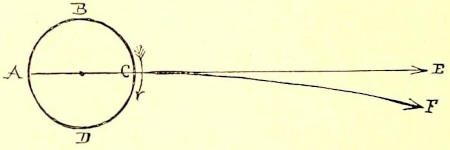
The deviation of oblong rifle projectiles which rotate about their axes of figure is called “drift.” This is a very interesting phenomenon, but it should not be confounded with the “curving” or deviation by rotation of spherical projectiles, as it is to be explained very differently. Yours truly,
W. R. Quinan.
The next letter is sent from Chicago, and the writer’s theory is comparatively a simple one:
Chicago, 1886.
Dear St. Nicholas: I have been much interested in the letters on the subject of curve-pitching, and since I have taken you for eleven years, I hope you will publish my theory, that it may be picked to pieces, and I may be set right on the subject. My theory is as follows:

Let A B be a ball moving toward D, and rotating in the direction shown by the arrows.
As the ball flies along, it pushes the air aside, as shown by the lines F E; the air thus rubs against the sides of the ball. But as the half of the ball called B is revolving with the air as shown by the arrow, there is much less friction on that side than on the half called A, which is revolving against the air.
Therefore, as motion is always in the direction of least resistance, the ball must curve in the direction C.
If any of the readers of the St. Nicholas can not understand my explanation, let them imagine, for example (instead of a regular ball), a ball covered with paddles, and they will then readily understand[797] it. If they think it not a good simile, let them look at the surface of a ball through a microscope and their doubts will not last long.
Your friend,
W. H.
Finally, from Boston, comes this rather formidable-looking explanation, which will interest those of our boy-readers who are accustomed to take their recreation and fun in the form of mathematical problems. [But doesn’t it make the ball curve in the wrong direction?]
Boston, Mass.
Dear St. Nicholas: Let the line A B, Fig. 1, represent in length and direction a given force acting on the point B. Draw any parallelogram, as A C B D, having A B for a diagonal; then the lines C B and D B represent in length and direction two forces acting on B, which, together, are equivalent to A B, A B is the resultant of C B and D B, C B and D B are components of A B.
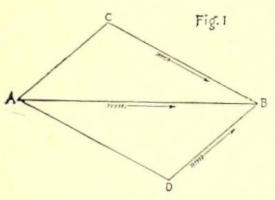
Fig. 1
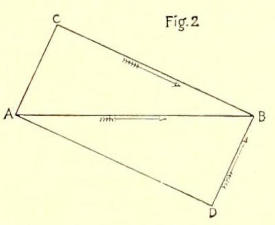
Fig. 2
If the parallelogram, A C B D, Fig. 2, is a rectangle, the components C B and D B are known as right components. The force represented by D B has no effect in the direction C B, and the force represented by C B has no effect in the direction D B.
Let Fig. 3 represent a ball revolving about its center O, in the direction indicated by the arrows, but the ball, as a whole, not moving in any direction. Let BB, BB, be lines at right angles to each other. Let the resistance of the atmosphere be represented by lines AB, AB, AB, AB, and AB′, AB′, AB′, AB′, running in a direction opposite to the revolution of the ball. The lines AB, AB, AB, AB are already perpendicular to BB, BB, and need not be changed. But the lines AB′, AB′, AB′, AB′ must be resolved into components perpendicular to BB, BB. This has been done in one case, the components being CB′ and DB′. But the force CB′ acting on the point B is equivalent to the force EF acting on BB, and the force DB is equivalent to the force GH acting on the other BB.
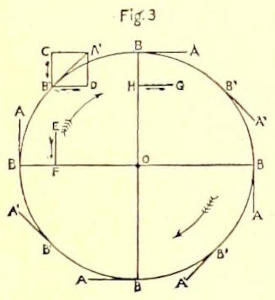
Fig. 3
In a similar manner all the other forces, A′B′ may be resolved into forces perpendicular to the lines BB, BB.
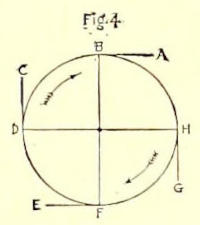
Fig. 4
If, in Fig. 3, all the forces acting on each of the lines OB, be represented by a single line, we have as the result the four equal lines AB, CD, EF, GH, Fig. 4 representing the total force acting on the ball.
Now, suppose the ball to move in the direction indicated by the large arrow, Fig. 5, then the resistance on the side B would increase, that on the side F would decrease, hence AB would increase, while EF decreased proportionately. Again, the air in front of the ball at H is condensed, that in the rear at D is rarefied, hence the resistance at H is increased, that at D being lessened, and GH is increased, while CD is lessened.
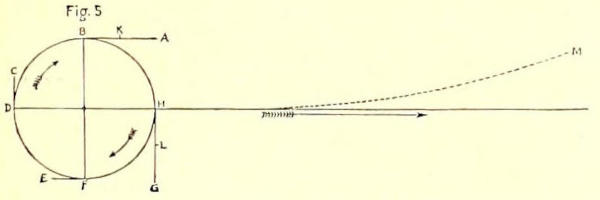
Fig. 5
Set off on AB, AK equal to EF; AK will balance EF, and we have only the force KB acting on the line BF. Making GL equal, CD, in the same manner, we have only the force LH acting the line HD.
Now, the force represented by the line BK can not do any work in the directions BF or FB, and therefore merely slows the ball. But the force LH, although it can not do any work in the directions HD or DH, can do work in the direction LH, and causes the ball to follow the curve HM.
Of course, all the forces, AB, CD, EF, GH, tend to stop the rotation of the ball, but the forces KB and LH are the only ones which change the motion of the ball as a whole.
F. H. C.
The following verses were written by a young poet of eleven, who began making rhymes at the rather early age of three.
By Ethel S. K. Packard.
Dear St. Nicholas: I suppose you know that many girls have a poor opinion of boys. Well, my sister and her girl-friends were going to have a fair in my mother’s parlors. I wanted to be in it, but they laughed, and asked me “if I could dress a doll, or make a needle-book?” While they were joking, Mamma whispered something in my ear, and we had a secret together, and we kept it till the night of the fair, and then we astonished my sister in this way. There is a long hall opening out of our back parlor. Mamma had it brightly lighted, that night, and about the middle of the evening Papa opened the door which led into the hall, and hung a large card over the door, on which was written: “Target-Shooting.”
I was in there with my new air-pistol, and the target was at the other end of the hall. I loaded the pistol, and another boy took the money. We charged two cents for a shot, and we had all we could do to load fast enough, so many people wanted to shoot. Some took ten shots. When I handed the money to my sister, she said I was “a daisy,”—I think I had the best of the joke that time,—don’t you?
Yours,
Jamie H.
Yes, Jamie,—but we think also that some of the credit belongs to Mamma. Don’t you?
A friend of St. Nicholas sends to the “Letter-box” this illustrated jingle:
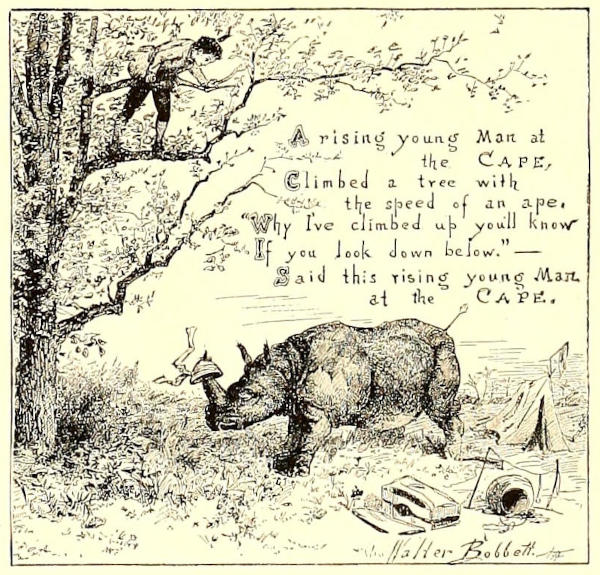
Once there were two little girls. Their names were Rosy and Alice. They had a little brother whose name was Robbie. Once when they were in the woods they saw a creature with eyes of flame, whistling as it went through the air, and it said in a gruff voice, “I am a Jabberwock.”
“What kind of a creature under the sun are you?” said Robbie; “what flashing eyes you have! You look rather kind, though very[798] frightful. Please take me up to the moon on your back and give me some cheese when you get there.”
Robbie had heard that there was cheese in the moon, but he did not really think so; only for a joke he said that.
“Oh! you soft little pussy thing!” said Rosy, as they rode away up to the moon. Pretty soon they went bump against something which was shiny and yellow. It was the moon. Then Jabberwock let the children get off her back, and asked the Man in the Moon if he would please get from his closet some cheese. “Why!” said Robbie, “I didn’t know there was really any cheese up in the moon!”
“Then,” said the Jabberwock, “why did you ask for it?”
“For a joke,” said Robbie.
“Well, here now,” said the Man in the Moon, “eat your cheese.”
“Why, how nice!” said Alice, as she took a large bite out of the cheese. “I think it would be nice to live up in the moon altogether, though I am afraid Mamma would not let us.”
“Well, I suppose she wouldn’t,” said the Jabberwock. After they had had some cheese they went down again.
“Oh, thank you,” said Rosy, as they got down to the earth. “Jabberwock, I think you are the loveliest creature in the world—except Mamma!”
“Oh,” said Alice, “I wish you would stay with us a few days—I suppose you will if we ask you to.”
“Yes,” said Jabberwock, “I would love to. Should you like to see my baby? It is a sweet little thing.”
She led them to a hole in a tree, where they saw the tiniest little baby Jabberwock you ever saw.
“What a cunning little thing!” said Rosy; “but has it not got any fur on?”
“No,” said Jabberwock; “but still it is pretty, is it not?”
“Of course it is,” said Rosy.
“But come,” said Alice, “this is the time Mamma wanted us to be home.”
“Is it?” said the Jabberwock. “Well, I will come.” So away they went.
Written by Mary Constance Du Bois
(at the age of 5 years and 10 months).
We acknowledge with thanks the receipt of pleasant letters from the following young friends: Frank Taylor, Harry Armstrong, Katie P. Peabody, Alice Conway, Robert A. Provan, Fay Taylor, Pussy and Leuce, Josie Irwin, Agnes F. Conwell, W. H., Allmond McKay Griggs, Hugh P. Yiemann, Katie, Dorothea Nimzer, Anna Wetmore, Edith M., H. L. M., “Venus,” Celia Loeb, Francis E. L., Florence E. Gaffield, Marion S. Dumont, Lee A. Miller, M. C. H., Evelyn Knight, Pansy, Luckett & Miriam I., F. W. Horninghouse, Hattie Frost, Emily E. Warner, “Alice, Annie, Gracie, Florence, Jessie, Marion,” “Three Rebels,” K., H. S. M., Bessie Maud Bowsher, Jerry Richter, Walter S. H., Nettie Rychen, Allan C. Rowe, May Singleton, Philip A. M., William B. Judson, Minnie W., C. E. Lankford, Ida E., Annie B. Sargent, Nellie P. Clark, Alex. D., Helen W., J. Henry Warren, F. W. Lodge, Grace Coburn, Harriet F. Lightfoot, Edith S. Clark, Fred B. W., Sadie Furman, Ellen S. Congdon, Gertrude, Emily Belton, Grace Vandever, Helen Crane, Alex. Evans, Kate Morris, Belle B. Anderson, Mabel B., M. B. P., Mabel Carrington, Cora L. Witherspoon, Gertrude M., Eugene Kell, C. G. Elmore, Willie Pettigrew, Willie J. Spear, Jeannette G., Jessamine C., Albert L. Scoullar, Albertie Russell, George Emerson, Helen A. Polsley, Ed. H. B., Elizabeth Butler and Elizabeth Wright, P. N. S., Ethel Grey, Rebecca K. Allison, Burton P. Thoms, Amy H., Florence Rawson Greer, Stella A. Goodell, S. W. Bridgham, Jenny Wren, Anna L. L., R. E. B., Maude F. Helen, W. M., Mary Weller, Buddie Holt, Daisey Higham, Sadie, Lyra and Silvia, M. G. Waring, E. H. Smalley, Annetta Reese, Anna May Peaslee, Florence Langton, Bessie P., Howard Butcher, Jr.
Mr. Culmer Barnes contributes to the “Letter-box” this month a timely picture:
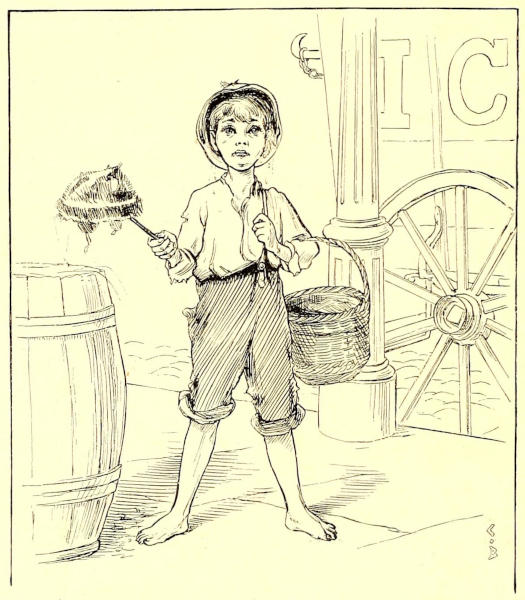
“JUST MY LUCK! LAST WINTER ’TWAS STRAW HATS ALL THE TIME, AND NOW I GET NOTHIN’ BUT FUR GOODS!”
Numerical Enigma. “Our country! In her intercourse with foreign nations, may she always be in the right; but our country, right or wrong.”
Stephen Decatur.
Cube. 1 to 2, mother; 2 to 6, repose; 5 to 6, needle; 1 to 5, Marion; 3 to 4, eating; 4 to 8, greedy; 7 to 8, nimbly; 3 to 7, ensign; 1 to 3, mite; 2 to 4, rung; 6 to 8, easy; 5 to 7, noon.
Anagrams. 1. Don Quixote. 2. Oliver Twist. 3. The Virginians. 4. Guy Mannering. 5. Old Curiosity Shop. 6. Uncle Tom’s Cabin. 7. The Woman in White. 8. The Last Days of Pompeii. 9. The Vicar of Wakefield. 10. Quentin Durward.
Pi. “Angling may be said to be so like the mathematics that it can never be fully learnt.”
Izaak Walton.
Metamorphoses. 1. Cow; row, rot, rat. 2. Hard; harm, farm, form, fort, sort, soft. 3. Left; lest, vest, vast, east. 4. Hit; nit, not, now, low. 5. Long; lone, lose, lost, lest, west.
Rhomboids. I. Across: 1. Venom. 2. Damon. 3. Bales. 4. Resin. 5. Strop. II. Across. 1. Nabob. 2. Mason. 3. Danes. 4. Remit. 5. Donor.—Charade. Par-son-age.
Zigzag. Independence Day. Cross-words: 1. Ivy. 2. aNt. 3. liD. 4. fEd. 5. Put. 6. nEd. 7. paN. 8. aDd. 9. End. 10. aNd. 11. roC. 12. lEd. 13. Dig. 14. mAy. 15. laY.
Hour-glass. Centrals, straw-hats; from 1 to 2, saltwater; from 3 to 4, stopwatch. Cross-words: 1. Spinsters. 2. Apitpat. 3 Largo. 4. Tap. 5. W. 6. Aha. 7. Trait. 8. Centime. 9. Handsomer.
To Our Puzzlers: In sending answers to puzzles, sign only your initials or use a short assumed name; but if you send a complete list of answers you may sign your full name. Answers should be addressed to St. Nicholas “Riddle-box,” care of The Century Co., 33 East Seventeenth street, New York City.
Answers to all the Puzzles in the May Number were received, before May 20, from Maud E. Palmer—Annette Fiske—Philip S. Fiske—“B. L. Z. Bub, No. 1”—Maggie T. Turrill—Paul Reese—San Anselmo Valley—Arthur and Bertie Knox—“Betsy Trotwood”—B. L. Z. Bub, No. 2—“May and 79”—Sallie Viles—The Melvilles—Blithedale—Mamie R.—Madge and the Dominie—Carrie S. Seaver and Alice M. Young—The Spencers—“Francesca”—“Clifford and Coco”—Bertha Z. Gerhard—“Sisters Twain”—“R. U. Pert”—“Hazel, Laurel, and Olive”—“Theo. Ther.”
Answers to Puzzles to the May Number were received, before May 20, from M. L. B., 1—M. S. Dumont, 1—W. B. R.—M. L. D. and others, 2—Pelham, 1—Two Fs., 5—The Peraults—C. D. Mason, 1—“Miss Ouri,” 5—“Tigers,” 2—Stella Mendel, 1—Johnny, 1—Dixie, 1—“Tigers,” 1—Maud F., 1—Lucy Jones, 1—J. Schlussel, 1—Laura G. Levy, 9—Buttercup and Daisy, 1—Helena Hellwig, 2—Madge Fursman, 1—Florence Althaus, 7—Thyrza Thornton, 5—C. S. H., 2—Mrs. Sippi, 5—Mary, Jennie and Mother, 6—Grace Cameron, 2—Effie K. Talboys, 8—“Yum Yum,” 1—Pepper and Maria, 12—Papa and Daisy, 1—Ned Mitchell, 5—Emma W. and Katie B. Knight, 2—T. L. and L. Cozzens, 1—Lucy M. Bradley, 12—Lizzie Wainman, 1—Geo. H. English, 1—“Chrysanthemum,” 1—Mary P. Fan, 1—“Jack Sprat and Pa,” 6—H. and L., 9—Clarence Brothers, 1—L. Reeves, 9—Eugene Kell, 1—No Name, N. Y., 9—W. R. M., 11—Bertha H., 12—“Rags and Tags,” 1—Nellie and Reggie, n—S. B. Bissell, 8—“Avis” and Grace Davenport, 10—“Mohawk Valley”—“Rasco,” 2—S. L. Meeks, 9—Belle Murdock, 12—No Name, Chicago, 10—B. B. Y., 11—“The Girls, Mabel, John, and Chickadee,” 11—R. B. C., 2—Original Puzzle Club, 10—“Geo. M. Ebry,” 2—Harrison Allen, Jr., 1—R. Lloyd, 1—“Blank” and Ulysees, 12—Dash, 12—Francis W. Islip, 12—Eleanor, Maude, Louise, Bertie and Nanno Peart, 7—Ida and Edith Swanwick, 8—Geo. S. Seymour, 8—Lulu May, 11—Frank M. Crispen, 1—Puzzled Family in Paris, 8—Esther Reid, Merton House, 1.
“MYRTLE GREEN.”
1. A gentle blow. 2. The Christian name of the heroine of a novel by Theodore Winthrop. 3. To bleach. 4. The herb wolf’s-bane. 5. Pertaining to the bile. 6. A fruit which was said to make strangers who ate of it forget their native land. 7. Musical syllables.
EDWARD ROBERT B.

I. Upper Square: 1. Proportion. 2. To affirm. 3. Familiar beverages. 4. Formerly.
II. Left-hand Square: 1. Rent. 2. A Hebrew measure. 3. Fabrics of a certain kind. 4. Formerly.
III. Central Square: 1. Formerly. 2. A large bird of South America. 3. Bodies of water. 4. Labor.
IV. Right-hand Square: 1. Labor. 2. Surface. 3. Abode. 4. A feminine name.
V. Lower Square: 1. Labor. 2. A feminine name. 3. To break suddenly. 4. Retained.
MURRAY AND PERCY.
I. Across: 1. Eloquence. 2. To eat into. 3. Part of a cat’s foot. 4. In eloquence.
Downward: 1. In Troy. 2. A musical note. 3. Skill. 4. An implement. 5. A lyric poem. 6. A musical note. 7. In Troy.
II. Across: 1. Pertaining to the craft of Freemasons. 2. A wooden shoe. 3. To cut the grass from. 4. In ceramic.
Downward: 1. In ceramic. 2. Similar to. 3. A boy’s nickname. 4. A hautboy. 5. At this moment. 6. A pronoun. 7. In ceramic.
“LOU C. LEE.”
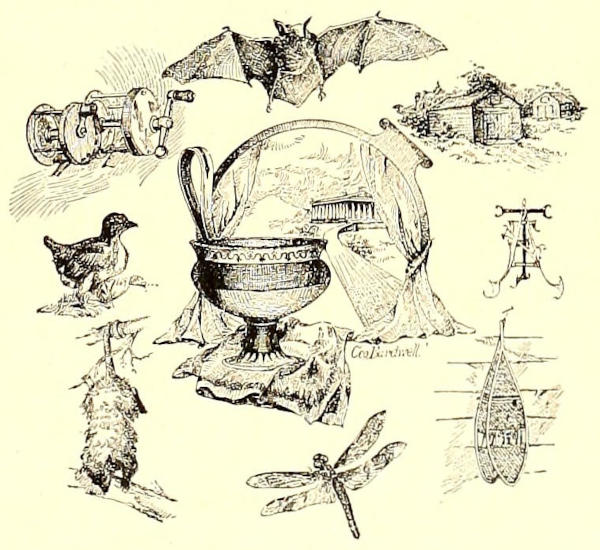
All of the cross-words of the above central acrostic are grouped around the central picture, and answer to the following definitions.
1 (nine letters). A contrivance useful in winter. 2 (nine letters). A swift-flying insect. 3 (seven letters). A young fowl. 4 (five letters). Familiar objects in rural districts. 5 (three letters). A winged animal. 6 (three letters). Consumed. 7 (five letters). Useful to fishermen. 8 (seven letters). An animal.
The central letters of the words described will spell the name of a great Athenian philosopher, and the central picture will suggest what is usually associated with his last moments.
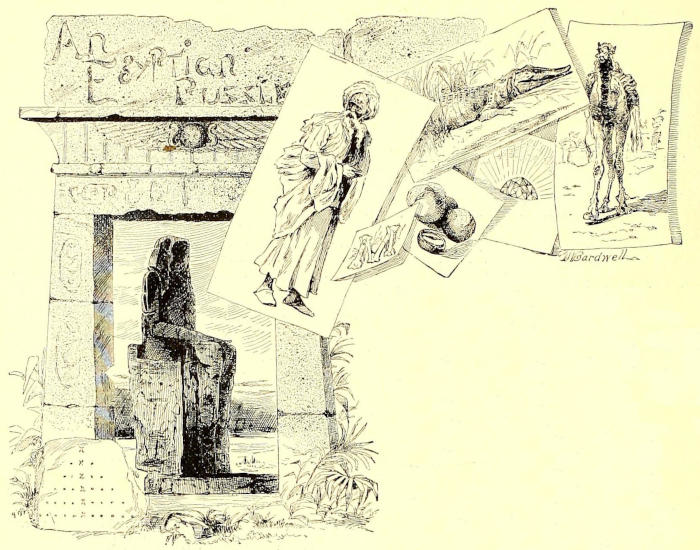
The above Egyptian puzzle is an illustrated pyramid, as the diagram in the lower left-hand corner indicates. When rightly guessed, the central letters (indicated by crosses) will spell the name of a famous statue that is said to emit sounds like those of a harp as the sun rises. The illustrations answer to the following definitions.
1. A letter. 2. A precious stone. 3. An animal. 4. Tropical fruit. 5. An animal. 6. A native of a certain Egyptian city.
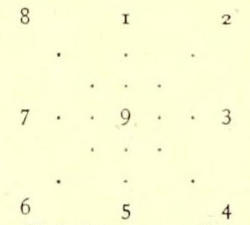
I. From 1 to 9, the Christian name of an English queen; from 2 to 9, a famous river; from 3 to 9, a cupola; from 4 to 9, the name of a large lake; from 5 to 9, to scale; from 6 to 9, magnitude; from 7 to 9, the margin; from 8 to 9, a number.
The letters represented by the figures from 1 to 8 spell the name of a Danish author who died August 4, 1875.
II. From 1 to 9, part of a watch; from 2 to 9, qualified; from 3 to 9, matured; from 4 to 9, uncommon; from 5 to 9, 43,560 square feet; from 6 to 9, to stare; from 7 to 9, to incite; from 8 to 9, a specimen.
The letters represented by the figures from 1 to 8 spell the name of a famous American who died August 14, 1870.
HONORA N.
1. In telephone. 2. One of the smaller sails on a ship. 3. A small but famous country. 4. A Spanish nobleman. 5. A favorite. 6. Era. 7. In telephone.
“ŒDIPUS.”
In each of the following sentences a word is concealed, the definition to which is given in the same sentence. When rightly selected and placed one below the other in the order here given, the primals and finals will each form the name of a distinguished poet who was born in August. The cross-words are all of the same length.
1. It is hard, in essays, to avoid assurance.
2. Mary has gone to Salem; Bell is home, and the latter will adorn the book she is composing.
3. In an oration, a legate gave the detail of reasons for making it.
4. Clare hears a little rumor that there will be a recital this evening.
5. This incident I call the same as that in the other story.
6. On Mount Carmel I temporized with one of the friars.
7. When I look now in glyphs, I feel their beauty understandingly.
CYRIL DEANE.
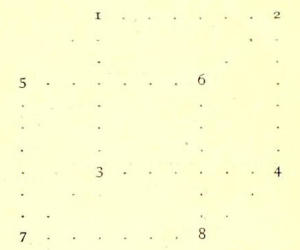
From 1 to 2, royal; from 2 to 4, a long-tailed species of hawk, found in Europe; from 3 to 4, a dealer in precious stones; from 1 to 3, eternal; from 5 to 6, a two-masted vessel; from 6 to 8, becoming circular; from 7 to 8, a method of securing a good draught in chimneys; from 5 to 7, the name of one of the three persons thrown into the fiery furnace of Nebuchadnezzar; from 1 to 5, the flower-deluce; from 2 to 6, an affected cast of countenance; from 4 to 8, a kind of seaweed; from 3 to 7, to scourge.
“ROSE MADDER.”
1. Behead withered and leave part of the head. 2. Behead dry and leave to free from. 3. Behead flexible and leave a demon. 4. Behead to sulk and leave to unfold. 5. Behead surrounded by and leave in the center of. 6. Behead joyful and leave a young boy. 7. Behead an ornament worn by Jewish priests and leave an edge. 8. Behead a short piece of iron and leave to be ill. 9. Behead the fraction of an ounce and leave an ancient instrument of war. 10. Behead a character in the play of “Othello” and leave gone.
The words described are of equal length. The beheaded letters, read in the order here given, will spell the name of one of Washington Irving’s earliest works.
“FRANCESCO AND CO.”
Each of the words described contains the same number of letters, and the zigzag, beginning at the upper left-hand letter, will spell an important event that occurred on August 5, 1856.
Cross-words: 1. Certain. 2. An exhibition. 3. Merriment. 4. Festivity. 5. To satisfy. 6. To strike. 7. A minute particle. 8. Formerly. 9. Recent. 10. Half. 11. Nationality. 12. Pain. 13. Dry. 14. Capable. 15. An elevation. 16. To engage. 17. Hearty. 18. To salute. 19. Want. 20. Notion. 21. To cook slowly. 22. To twist.
“KATASHAW.”